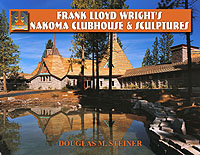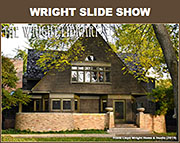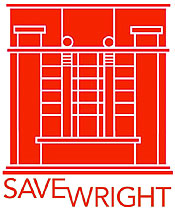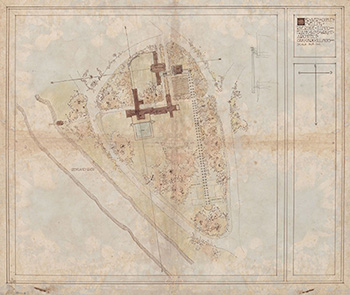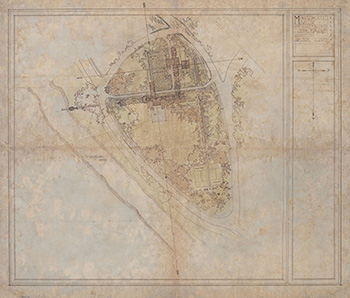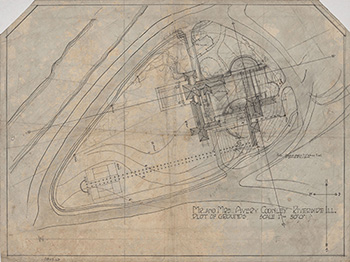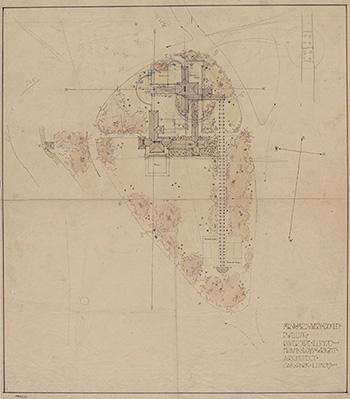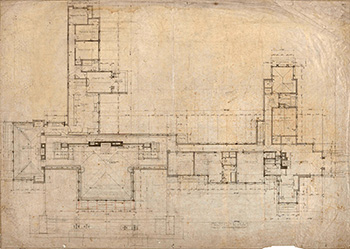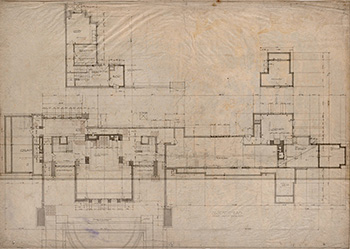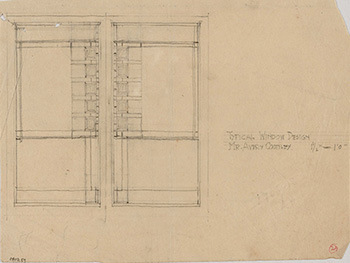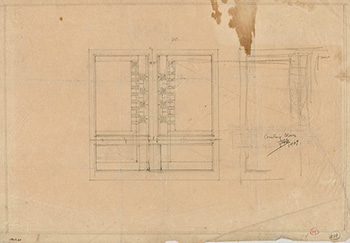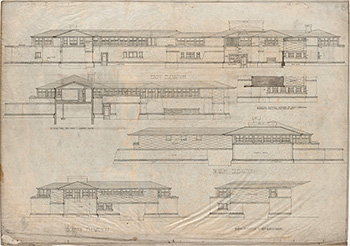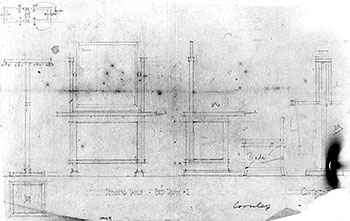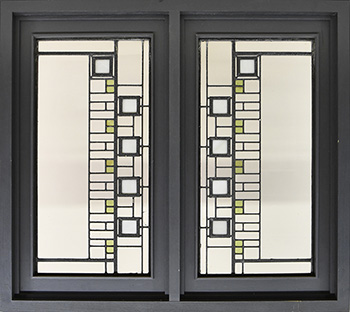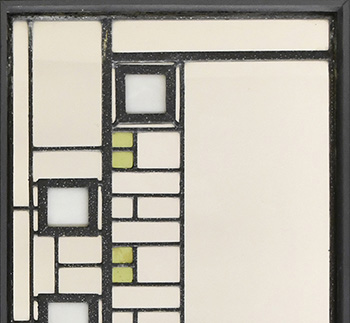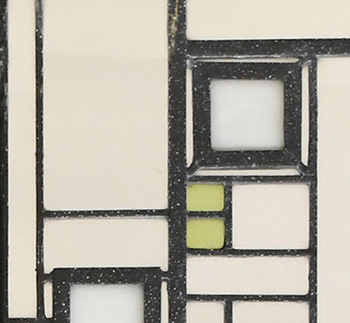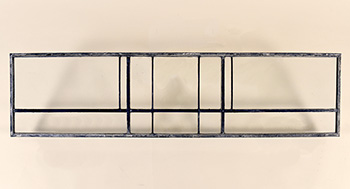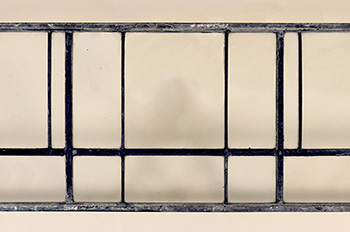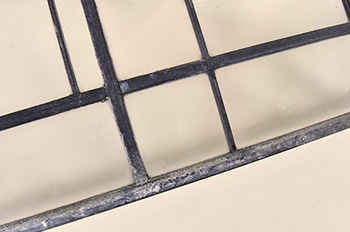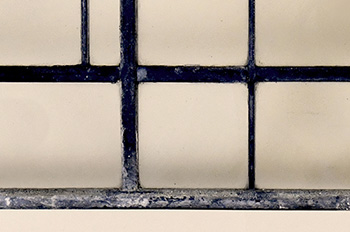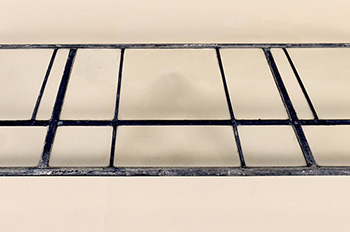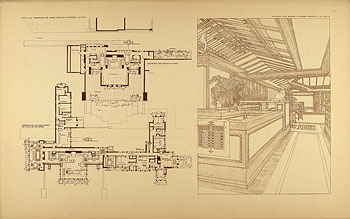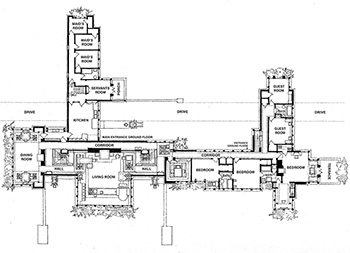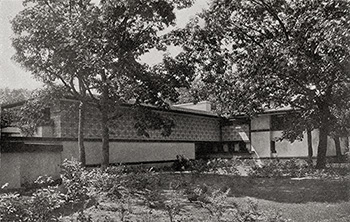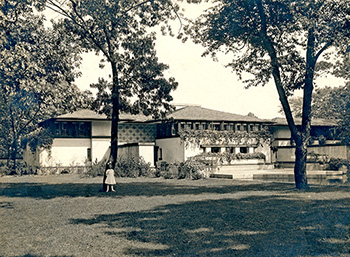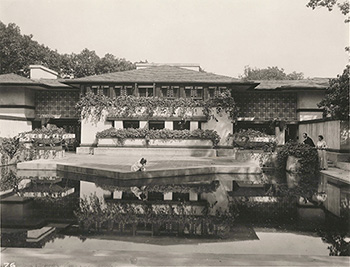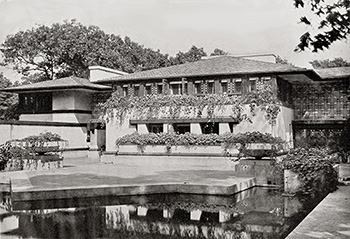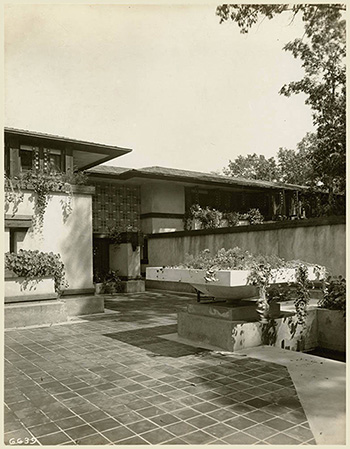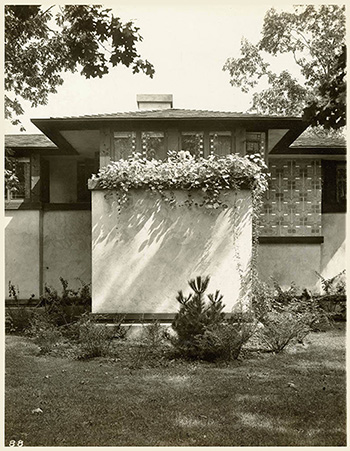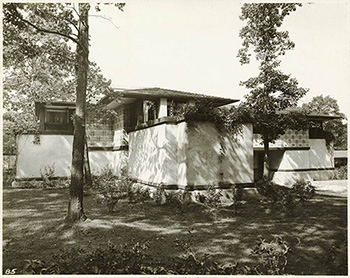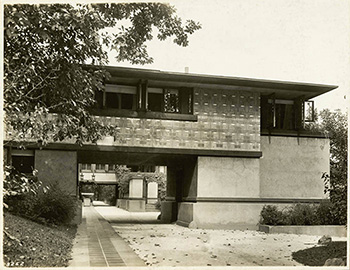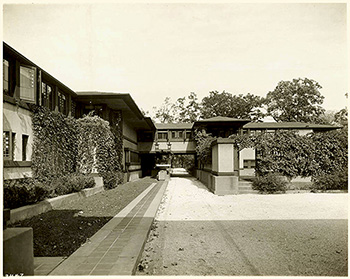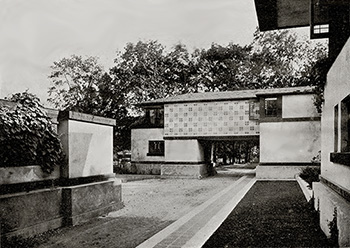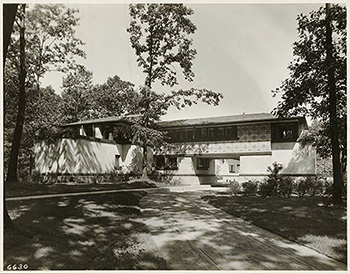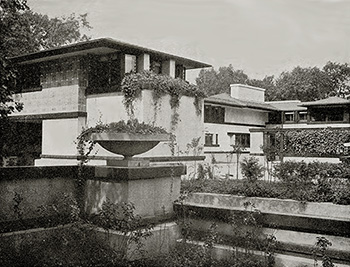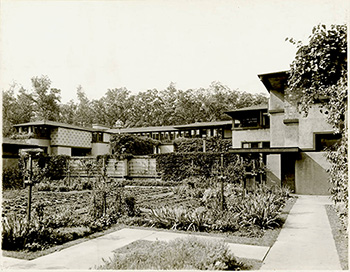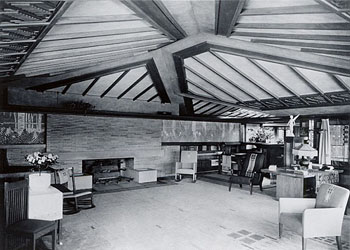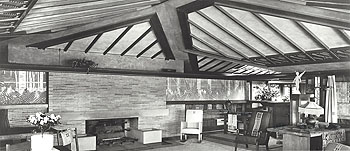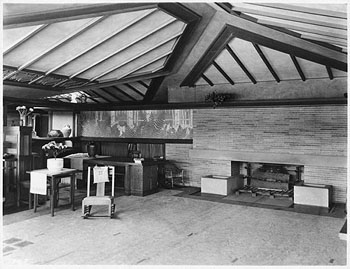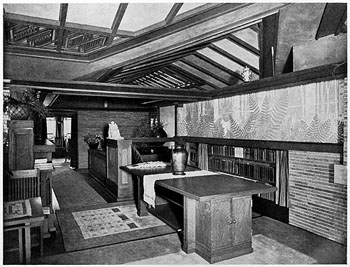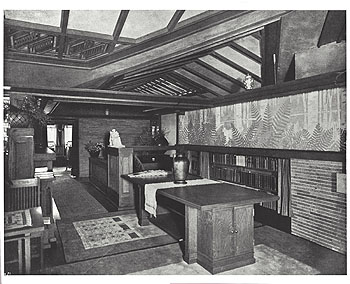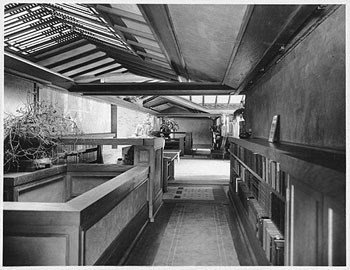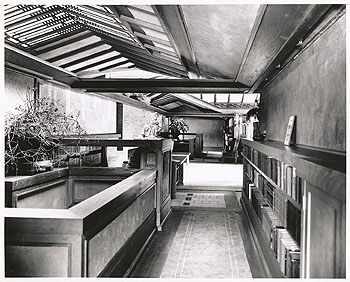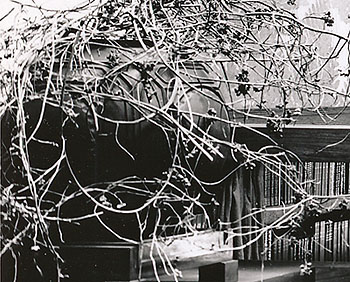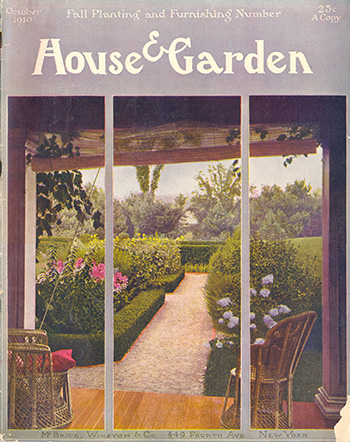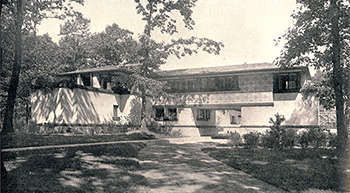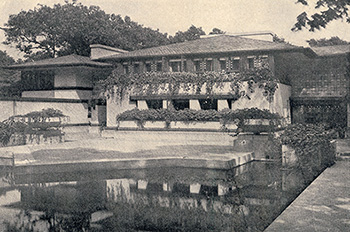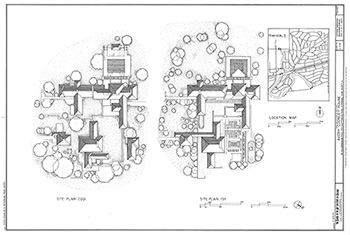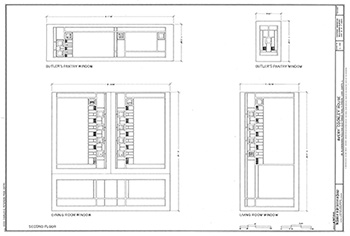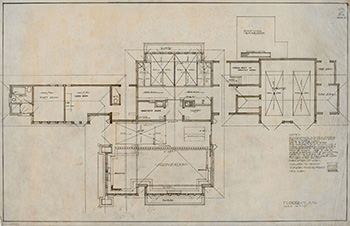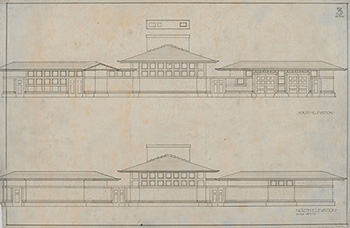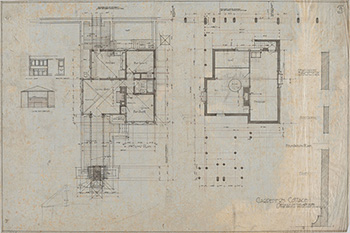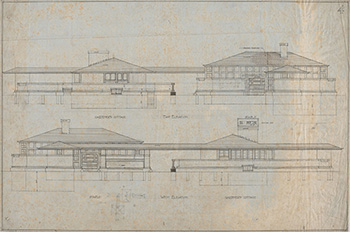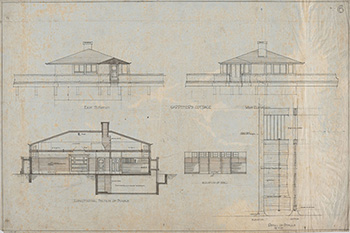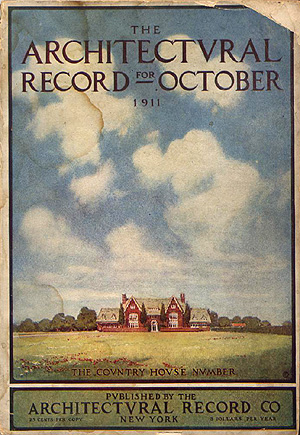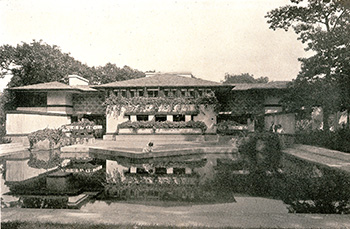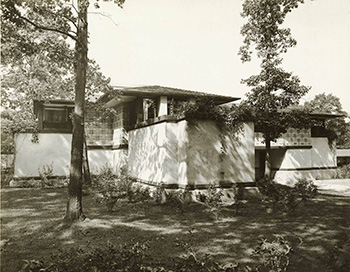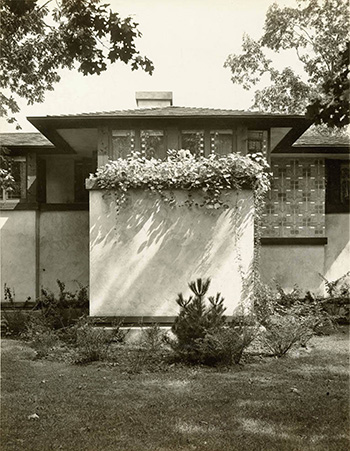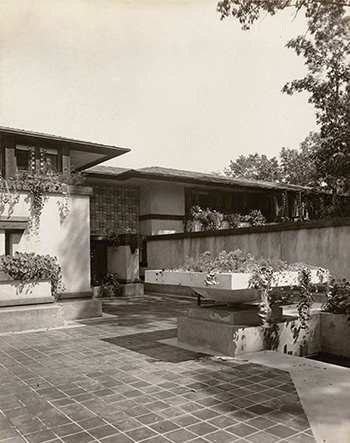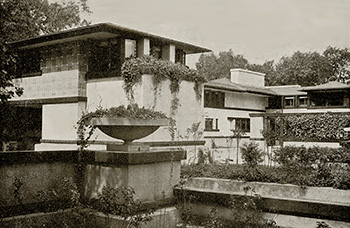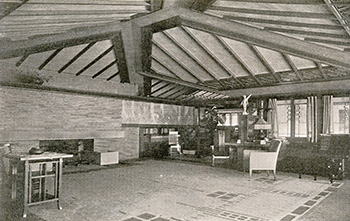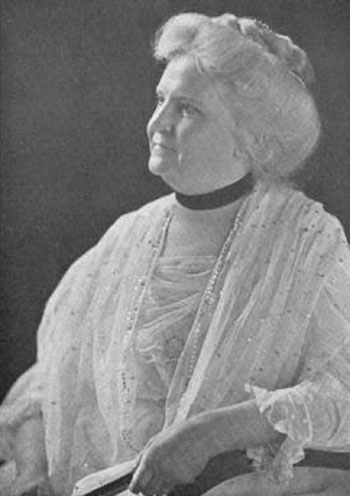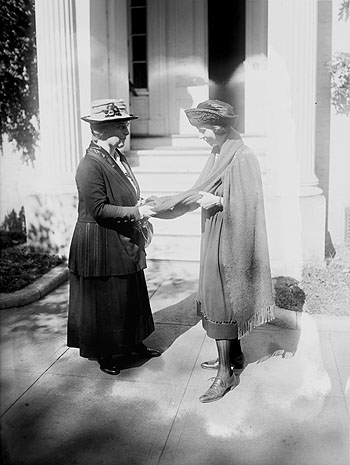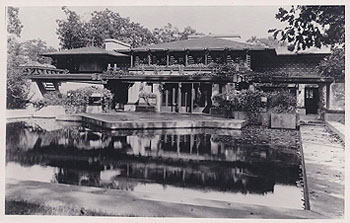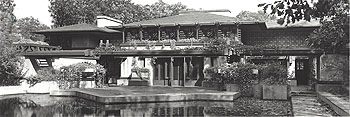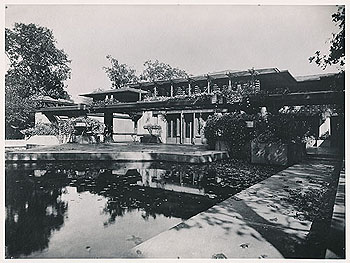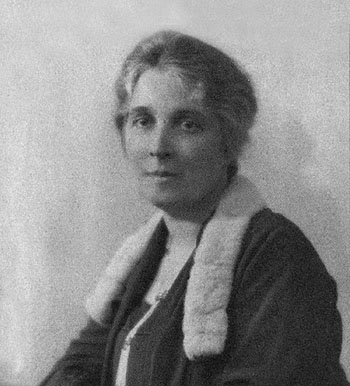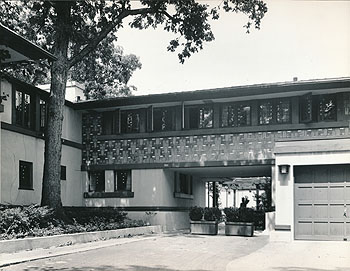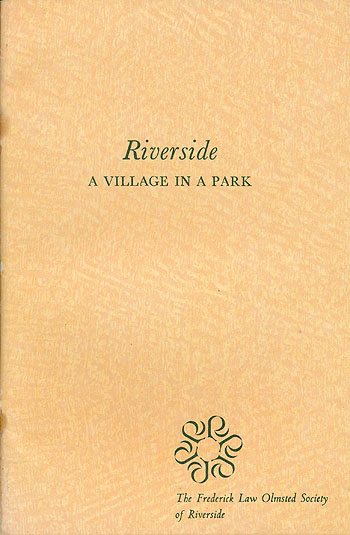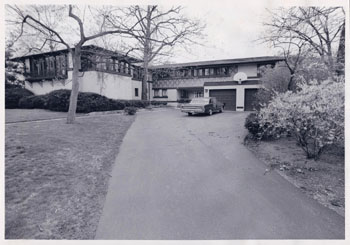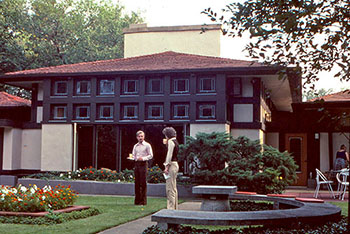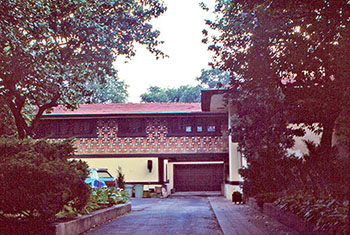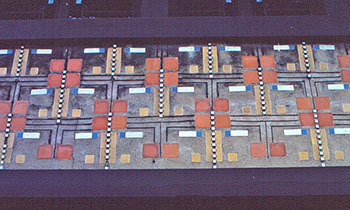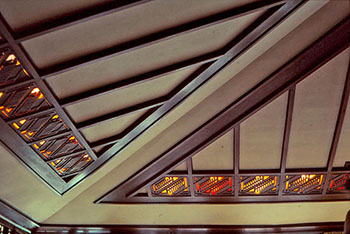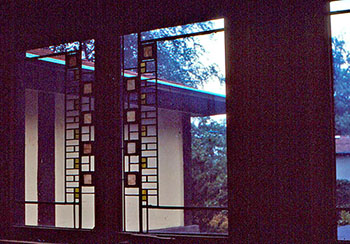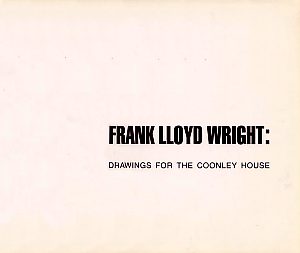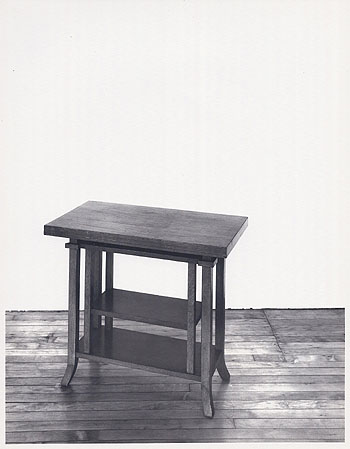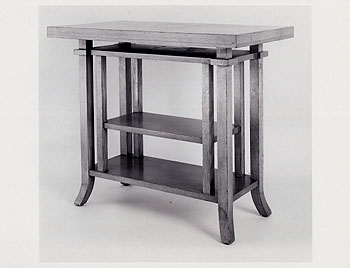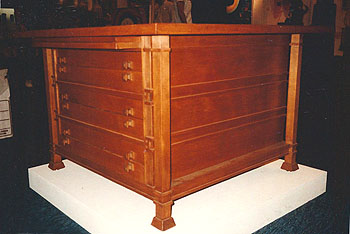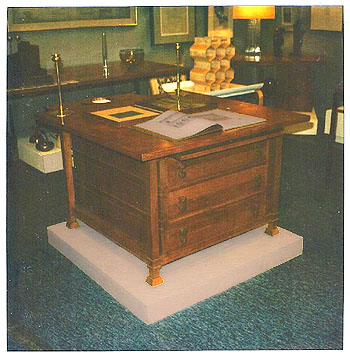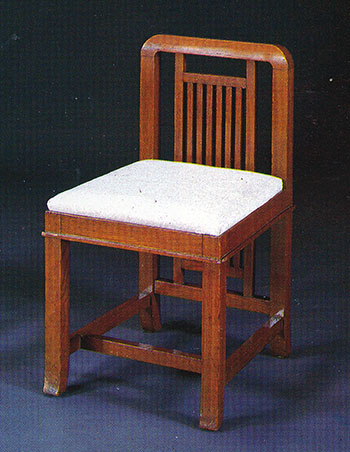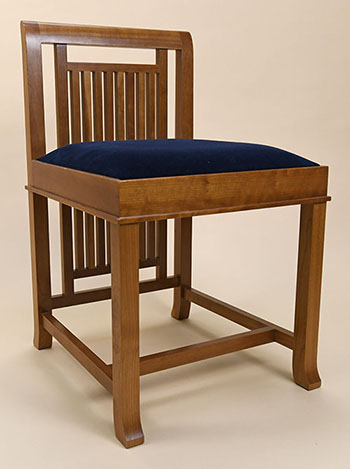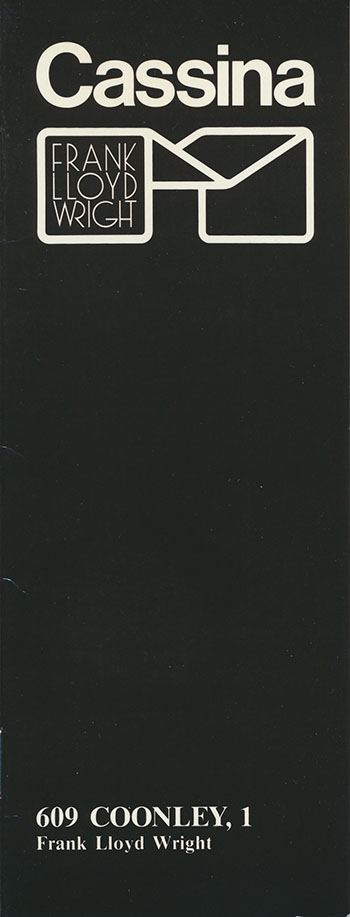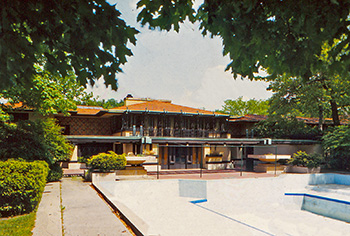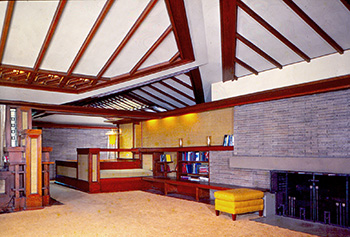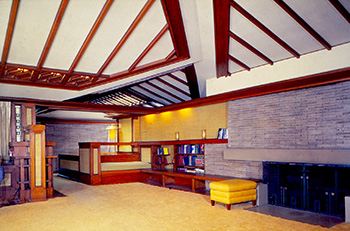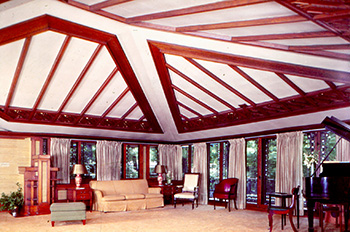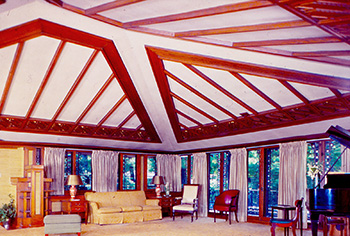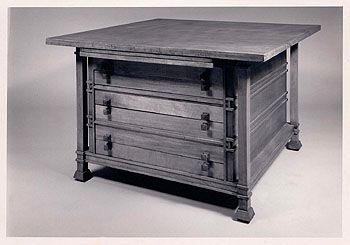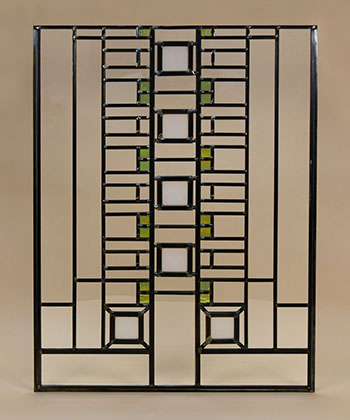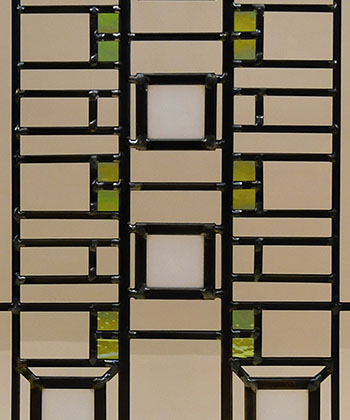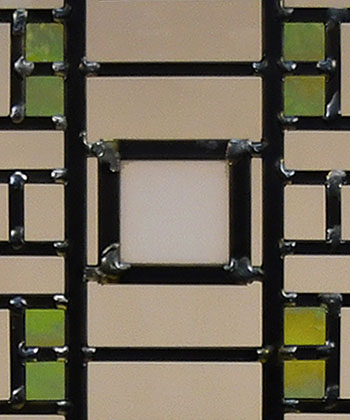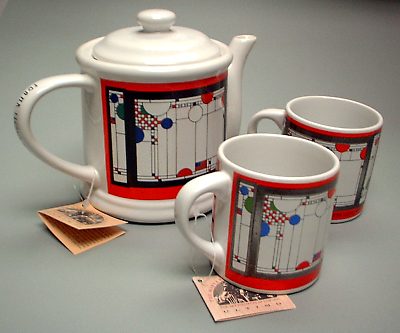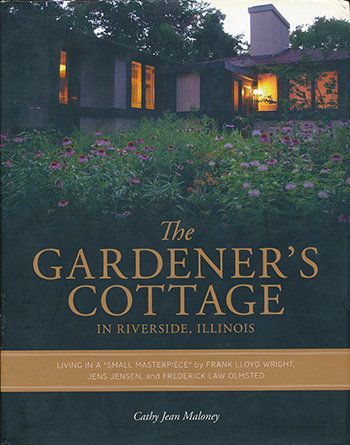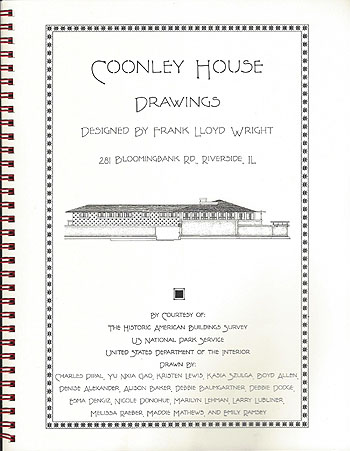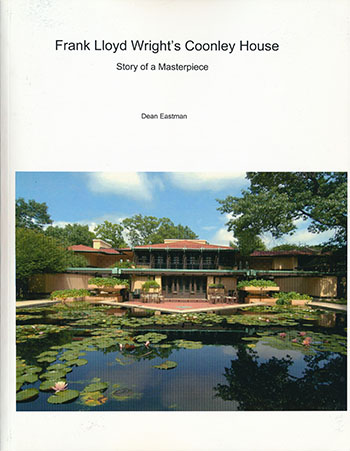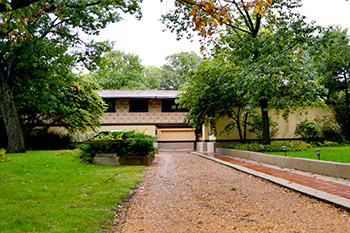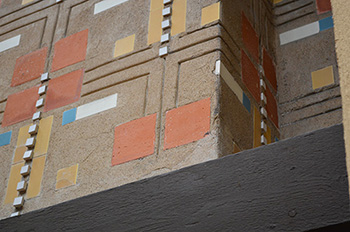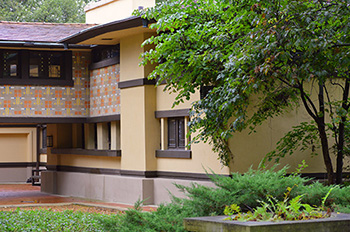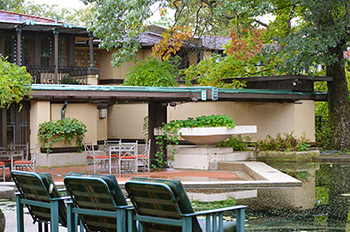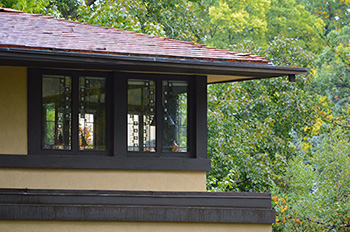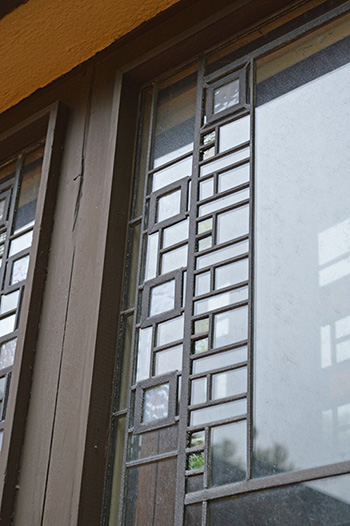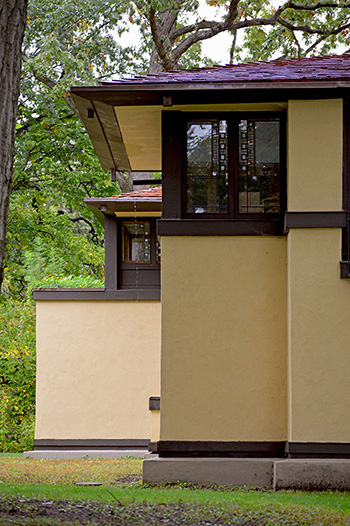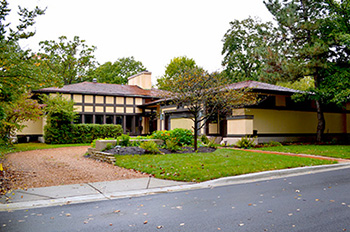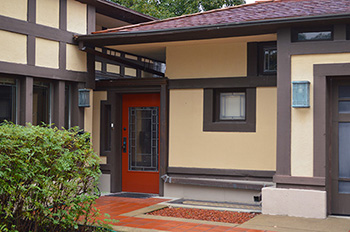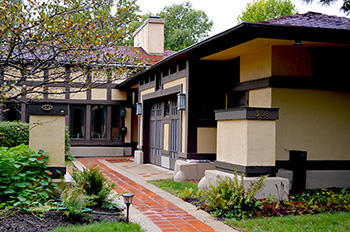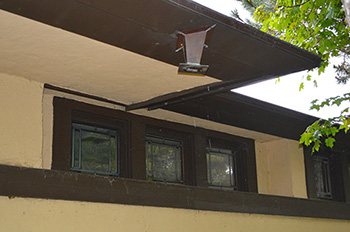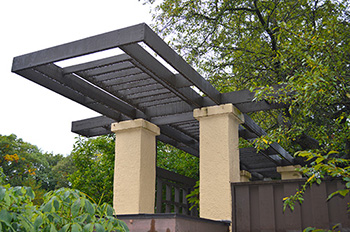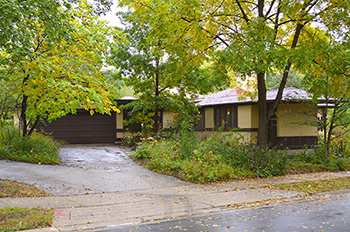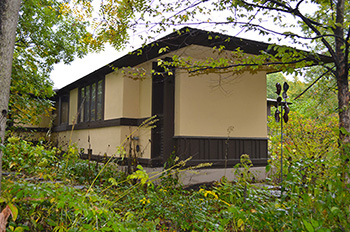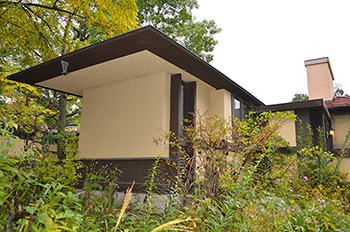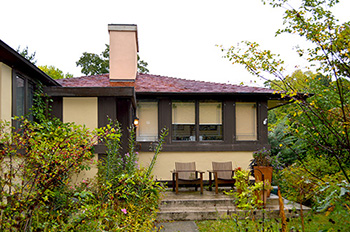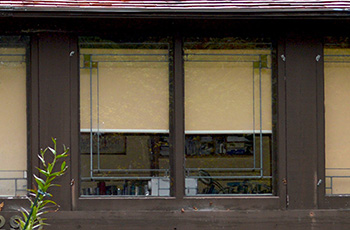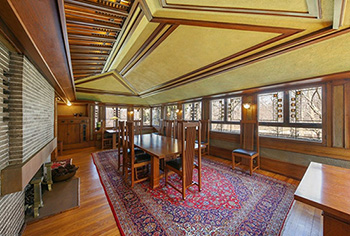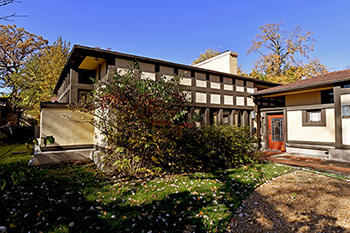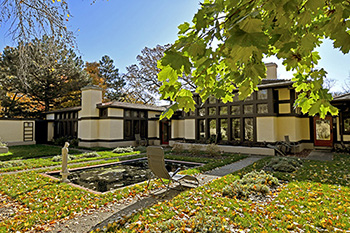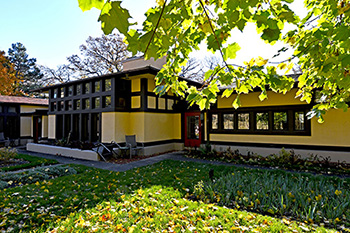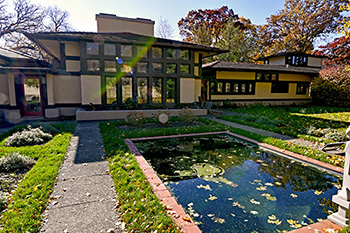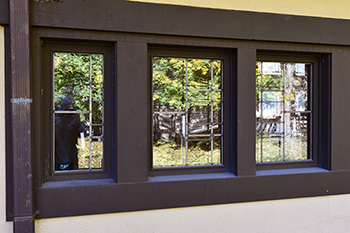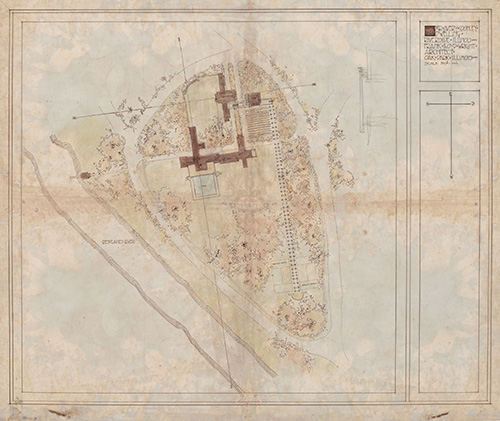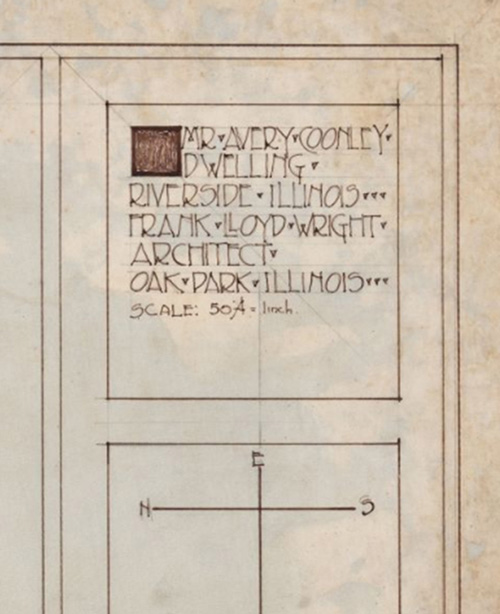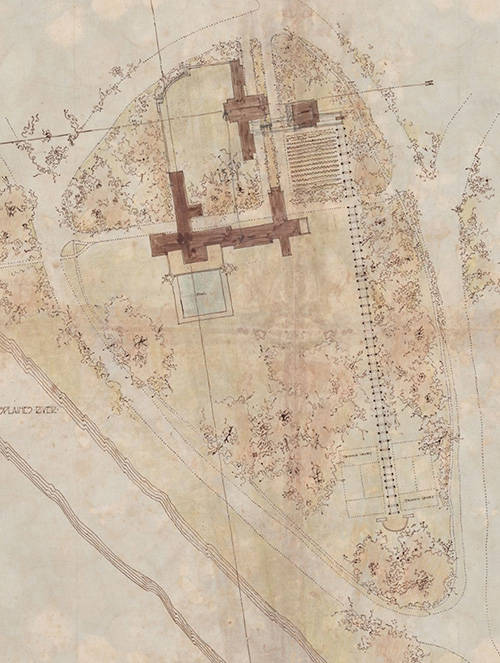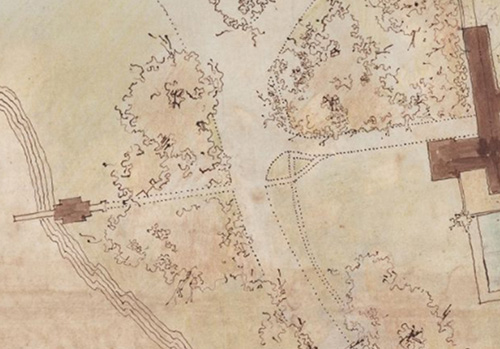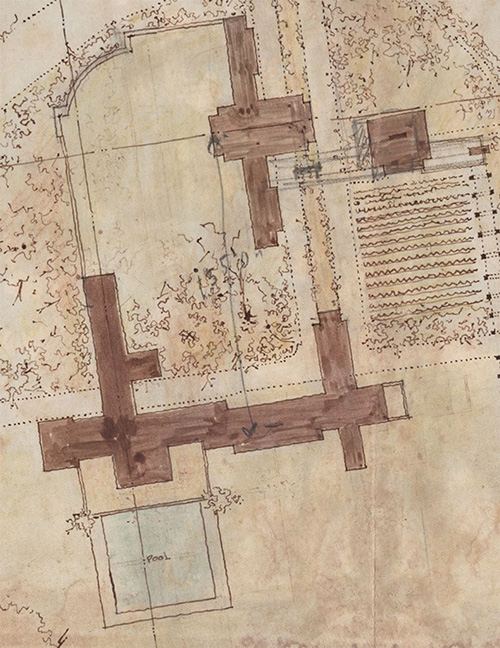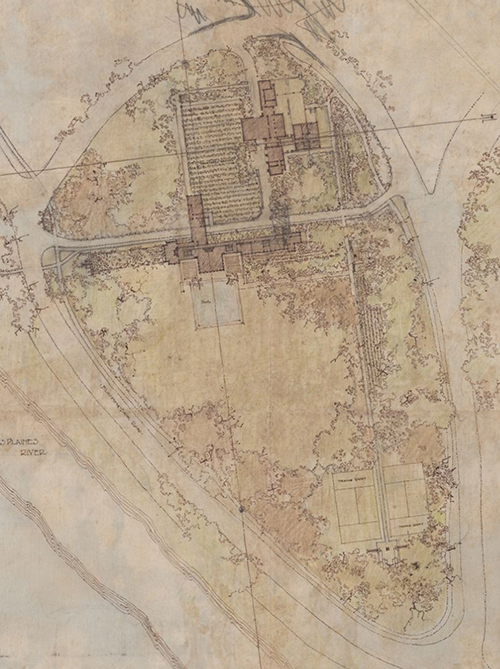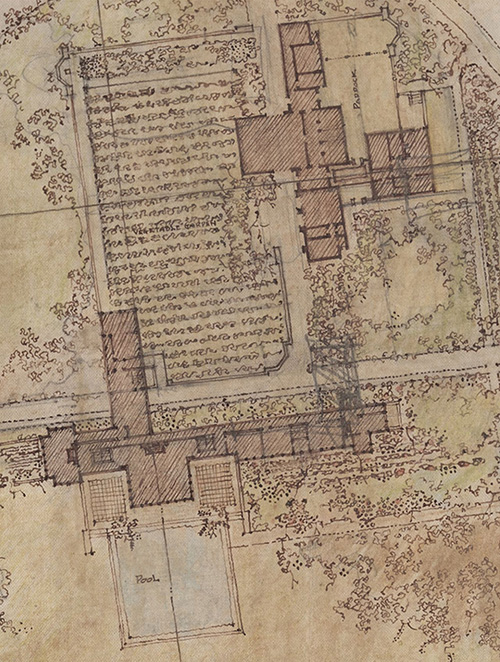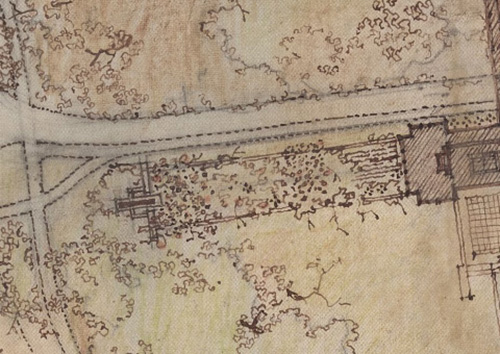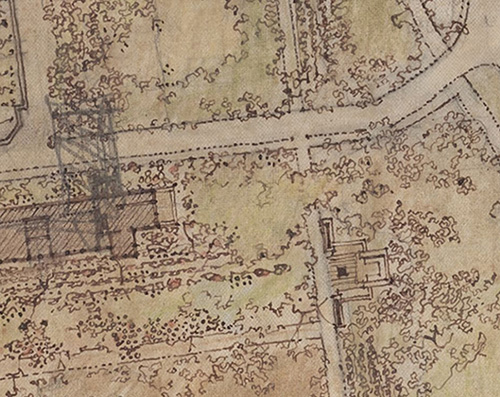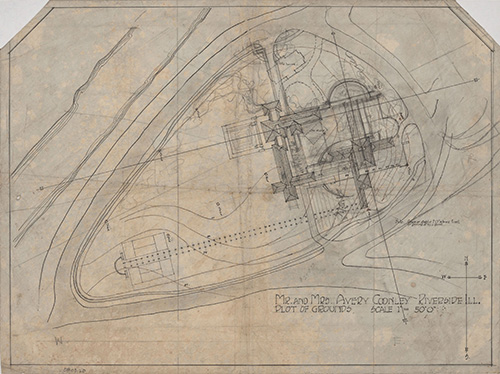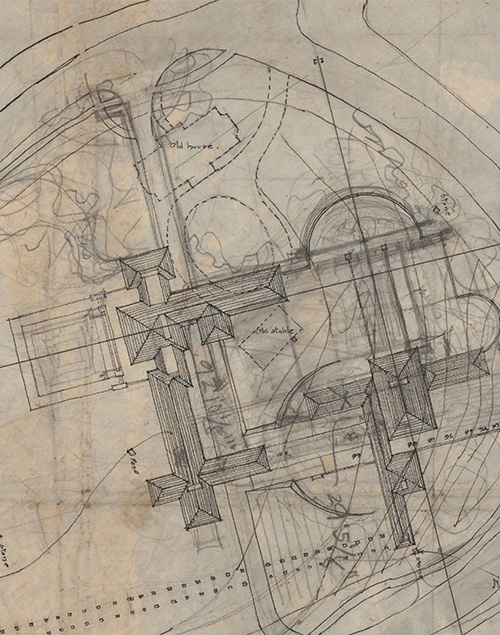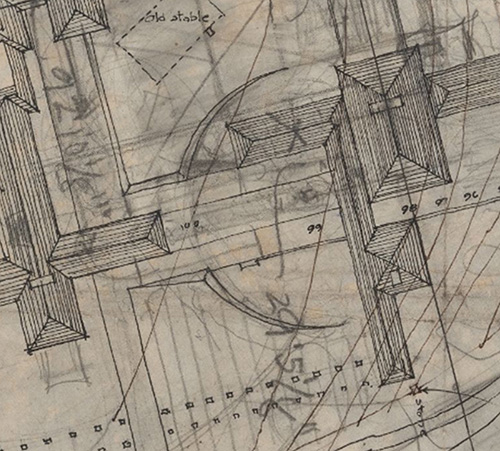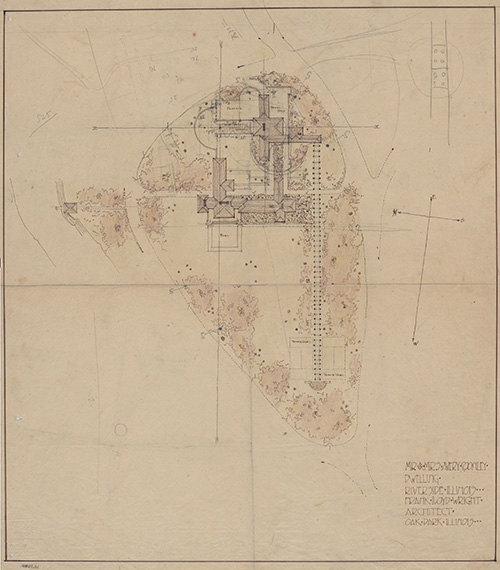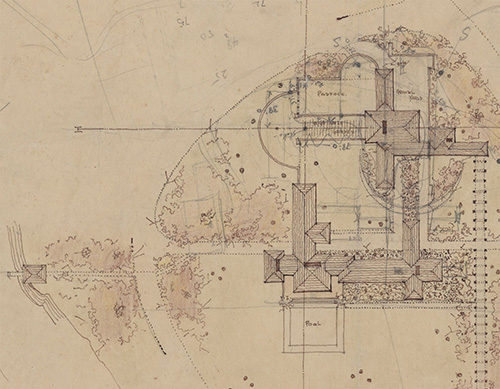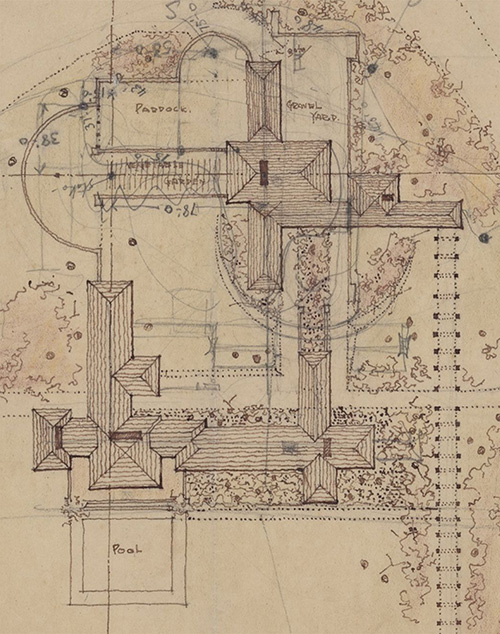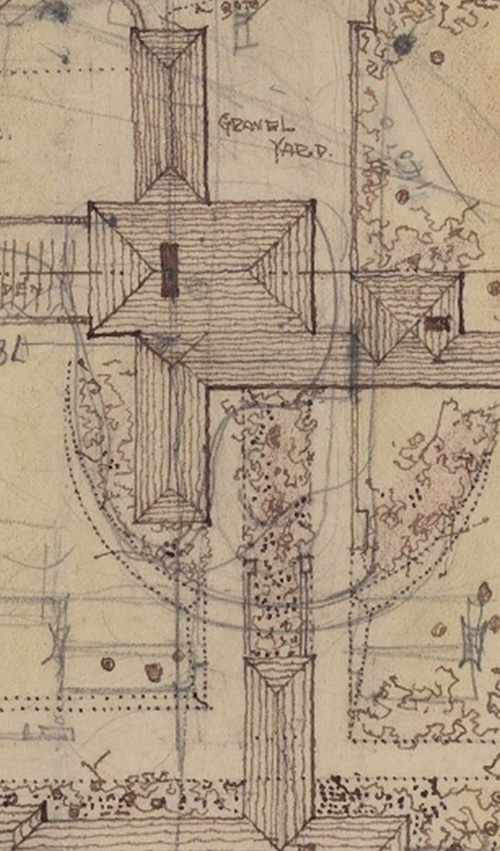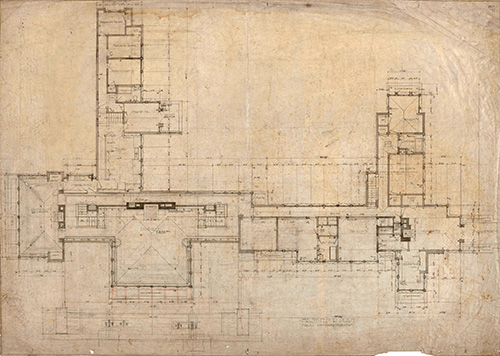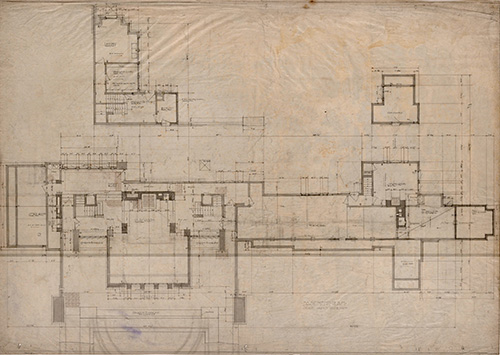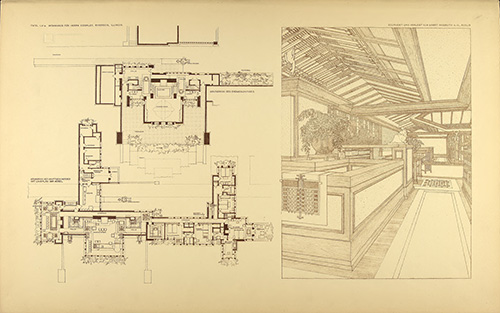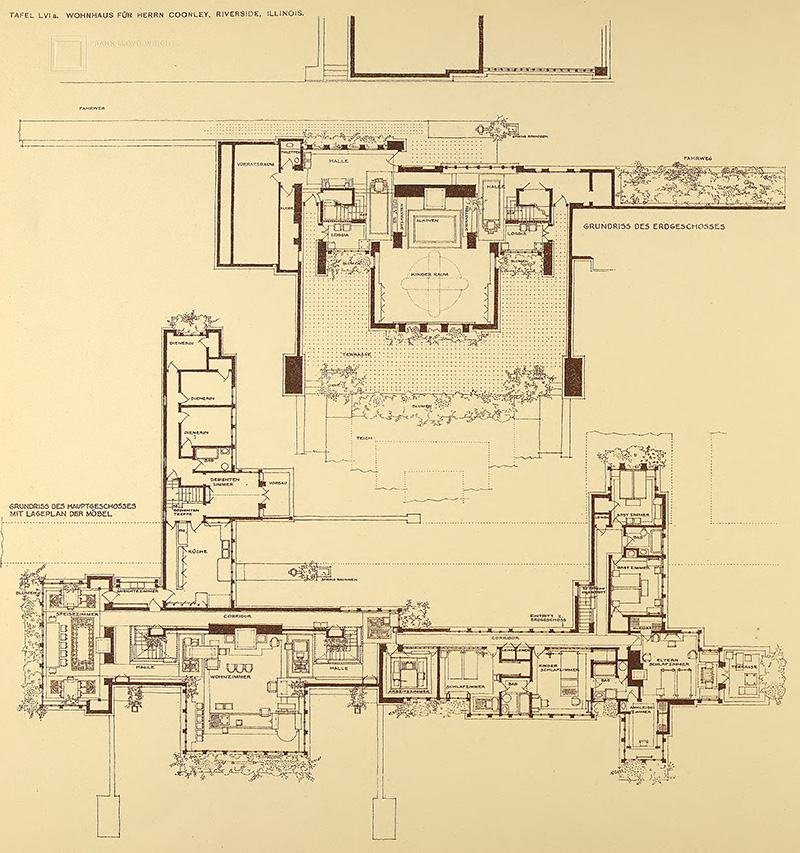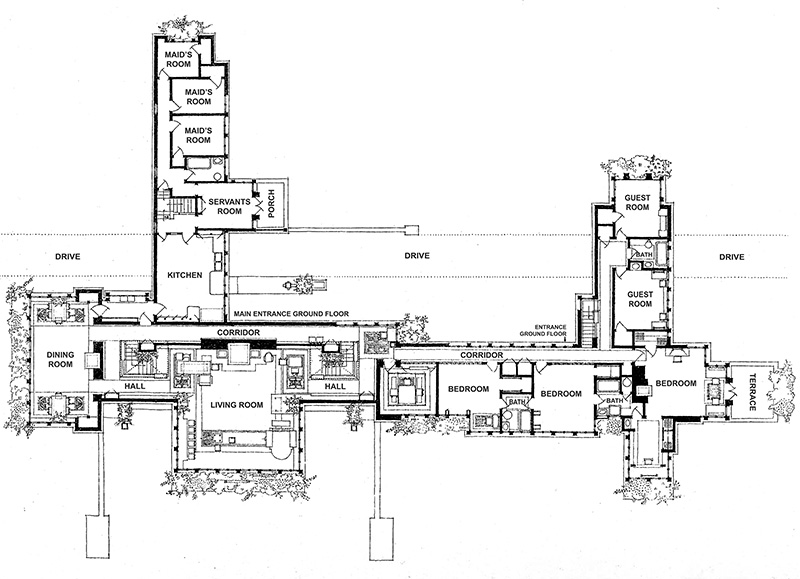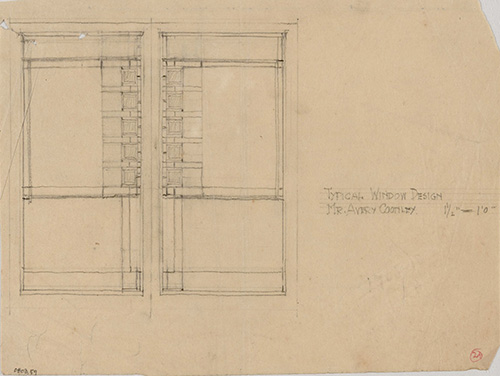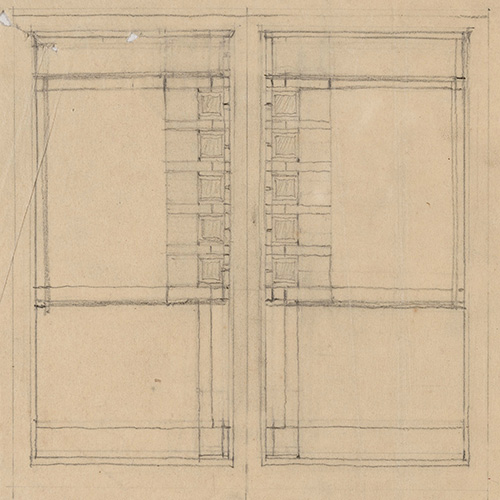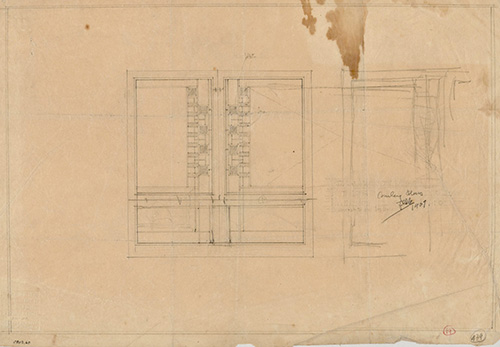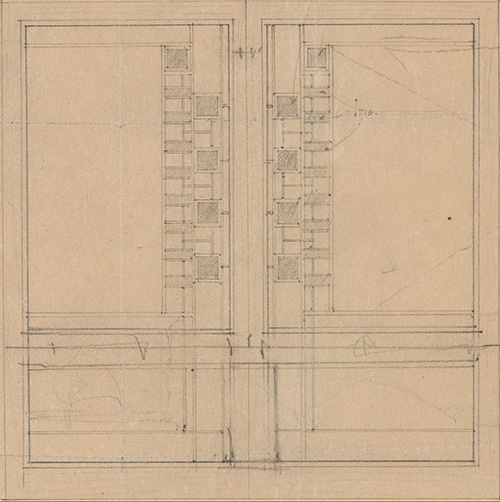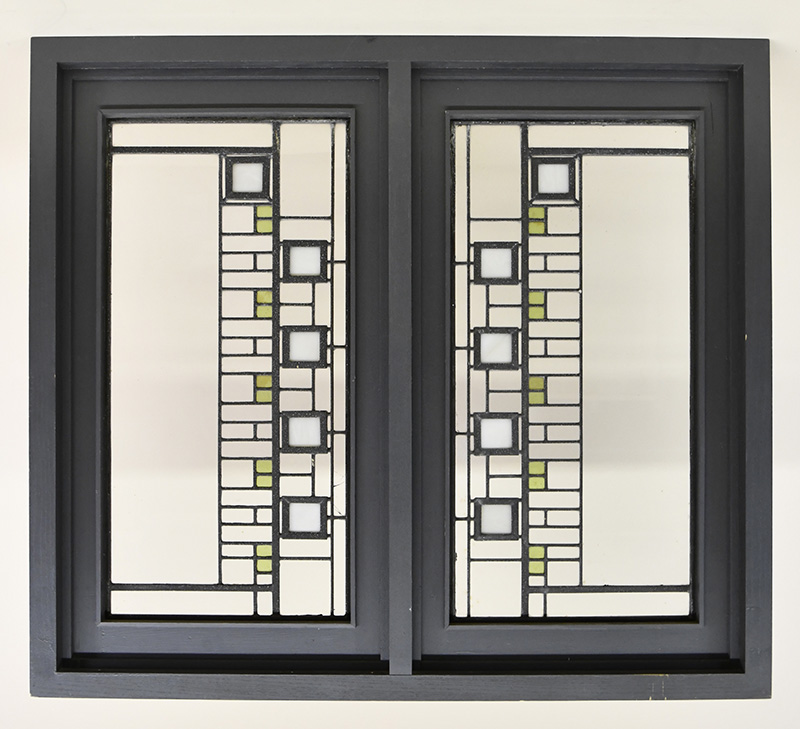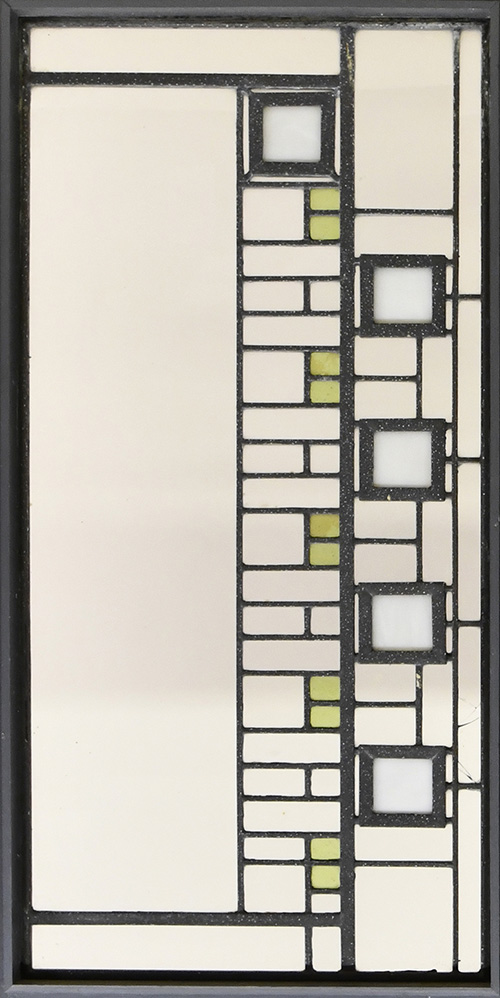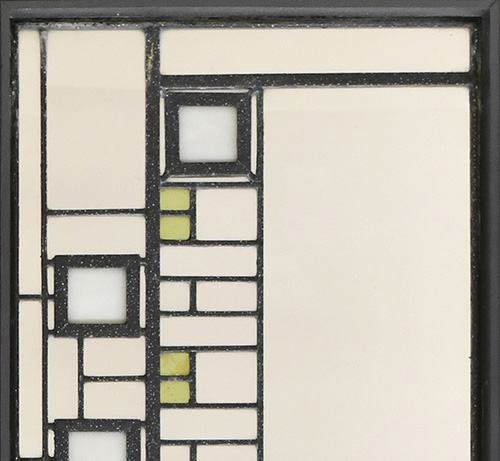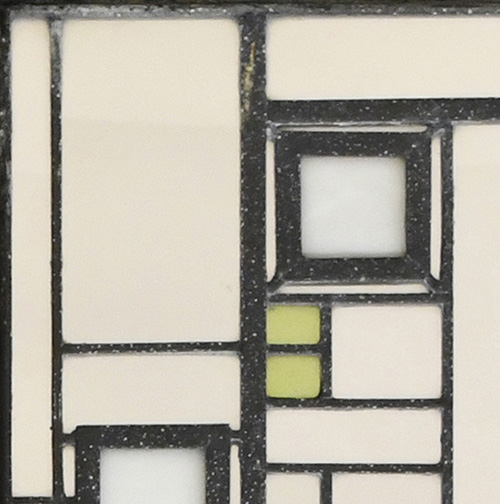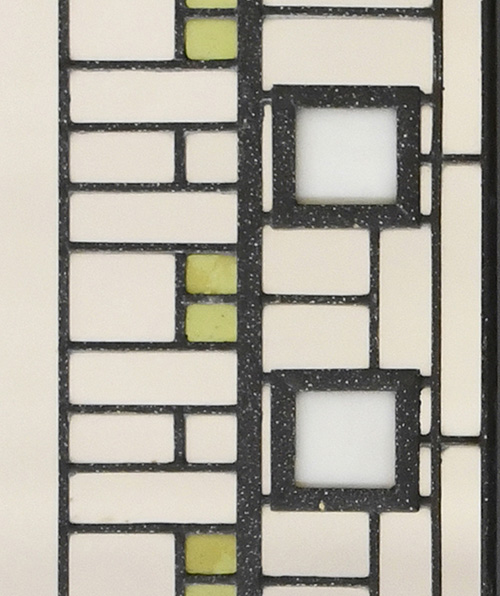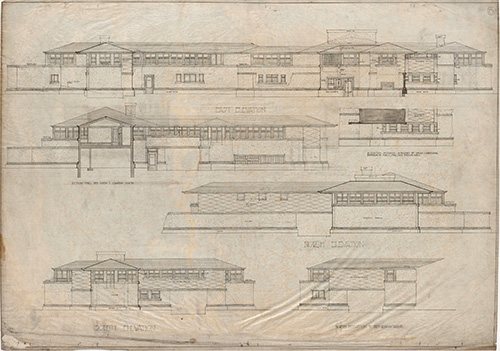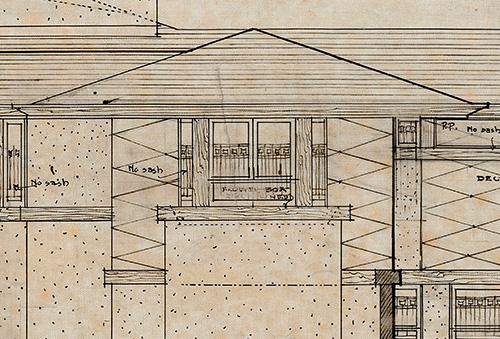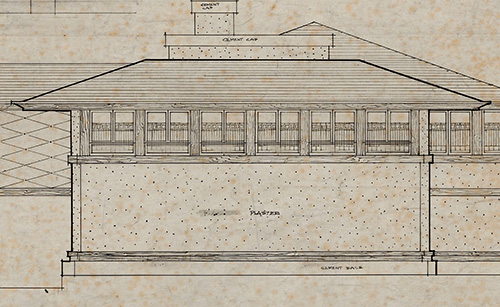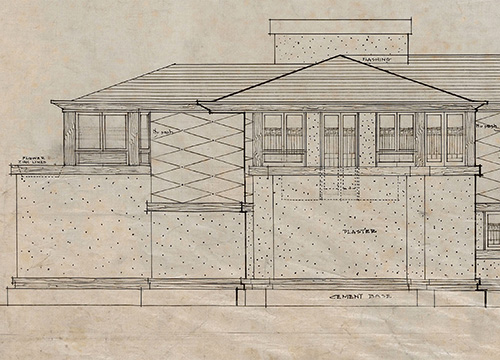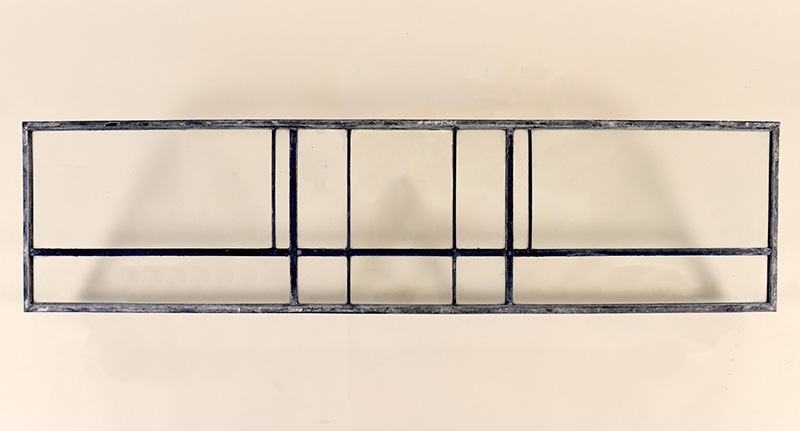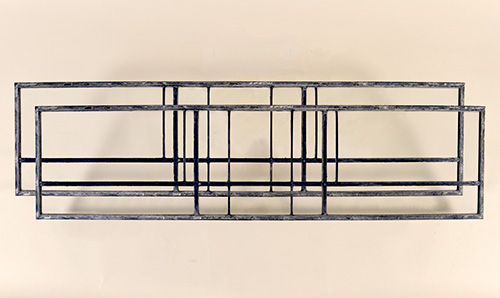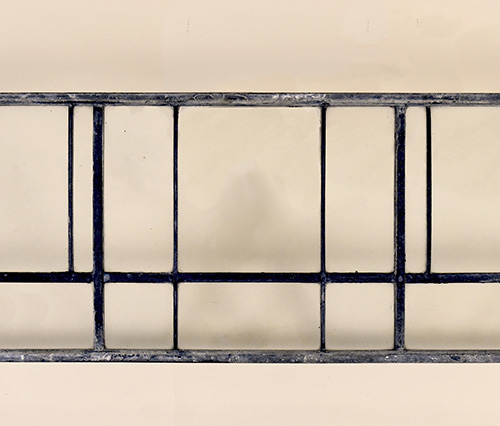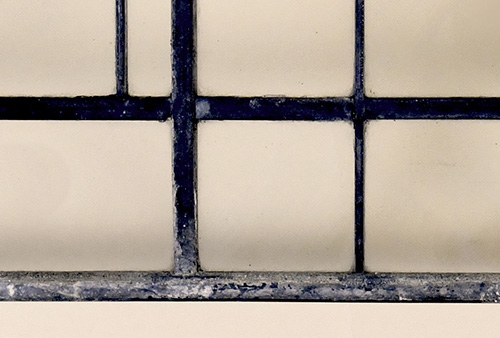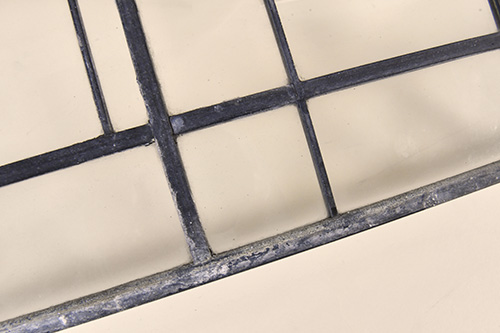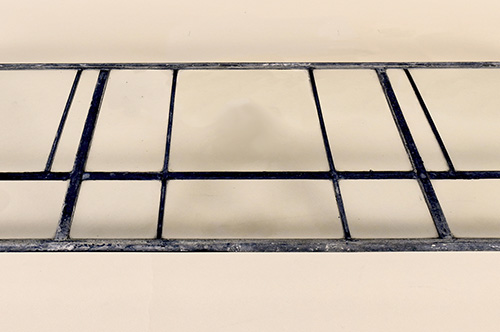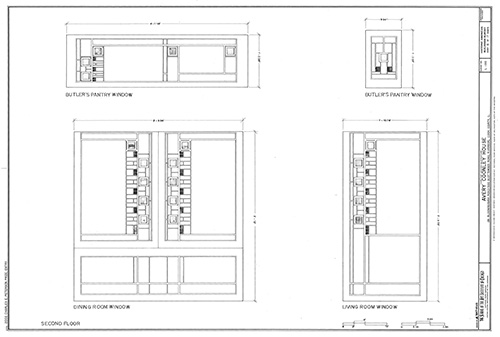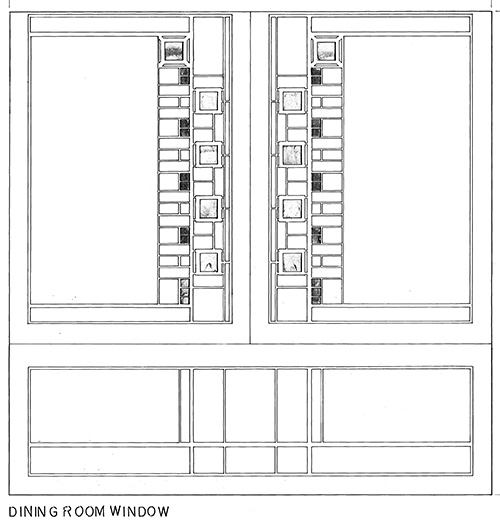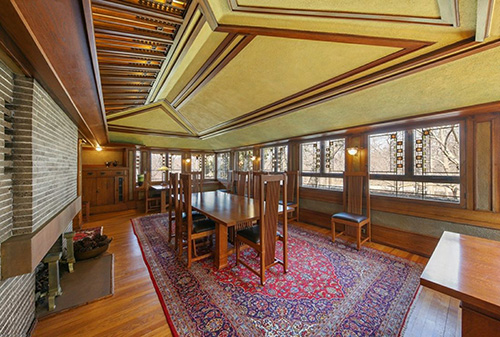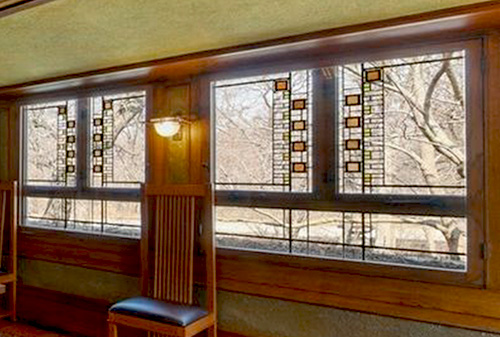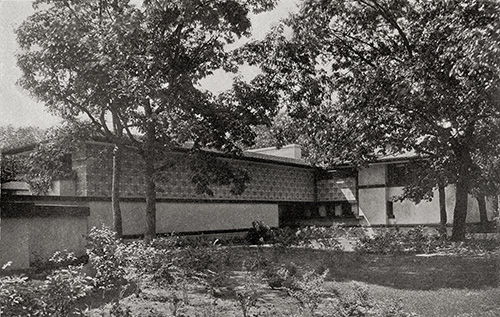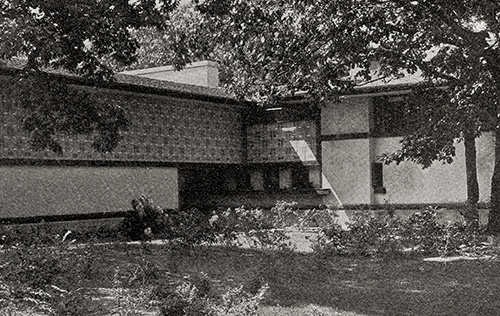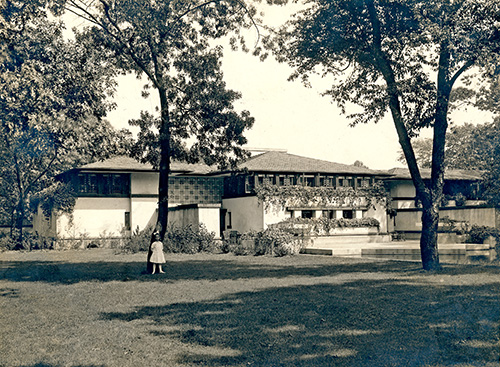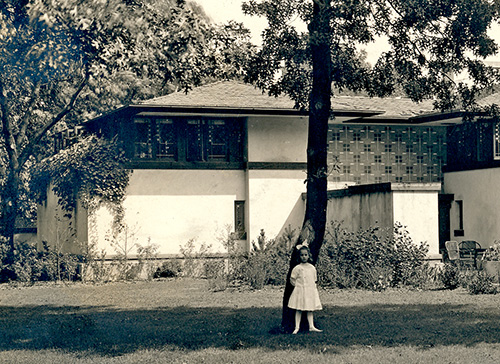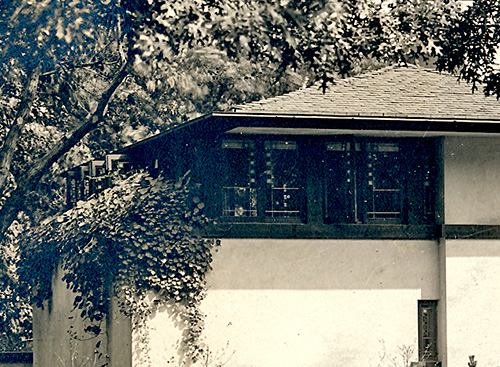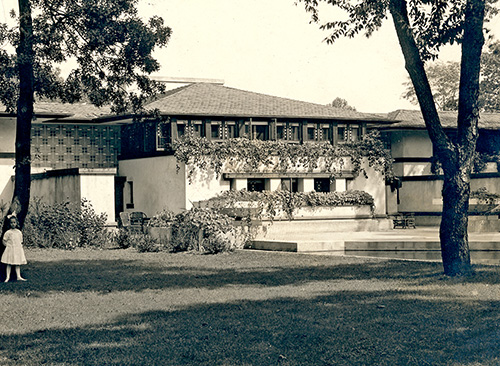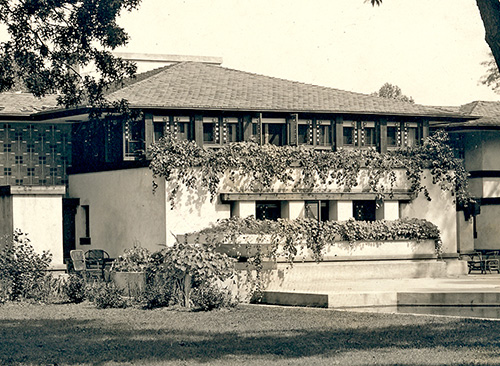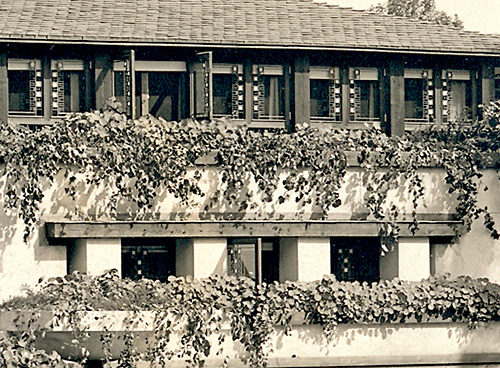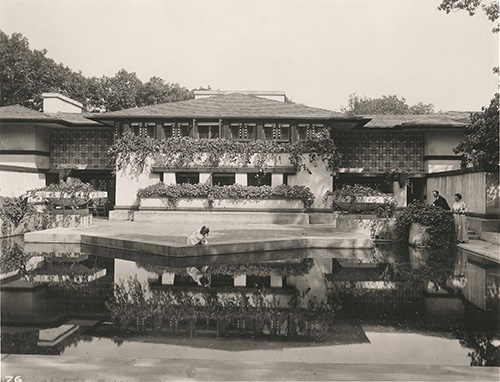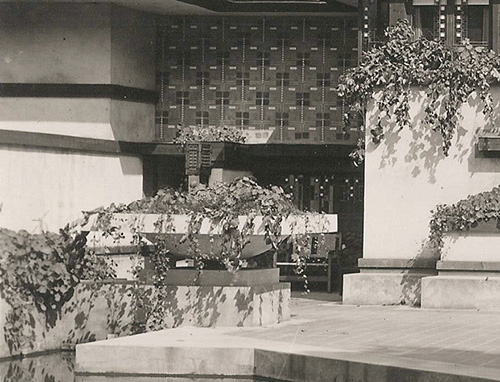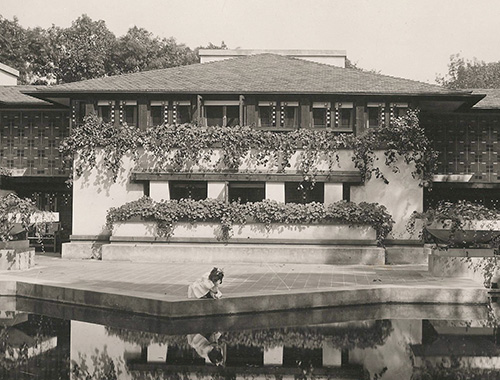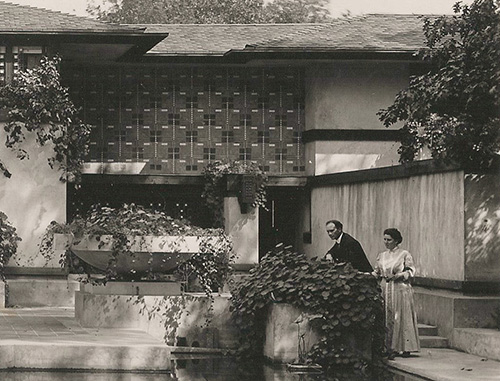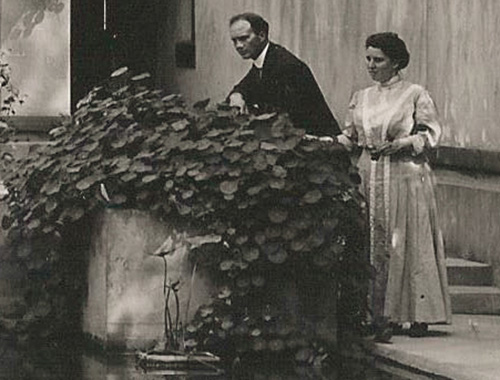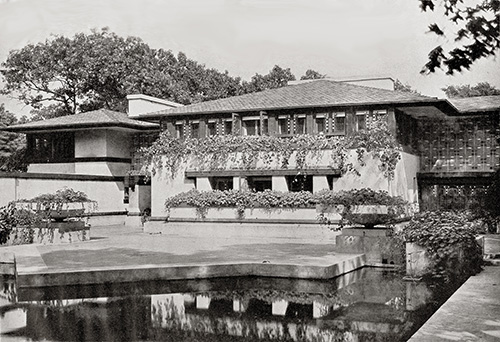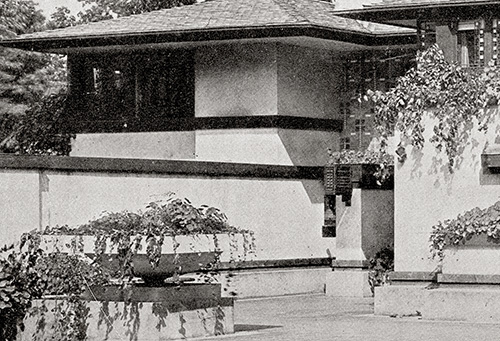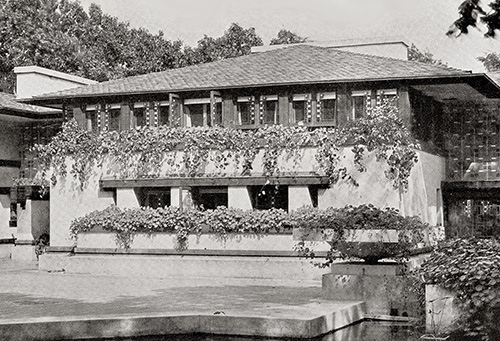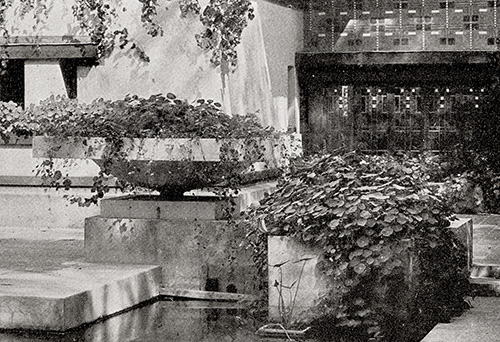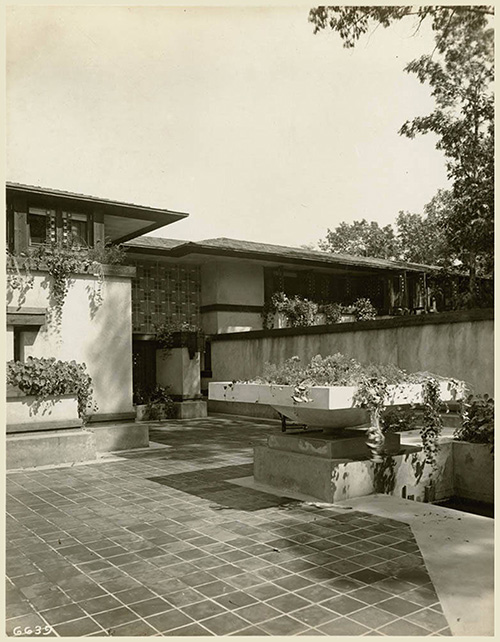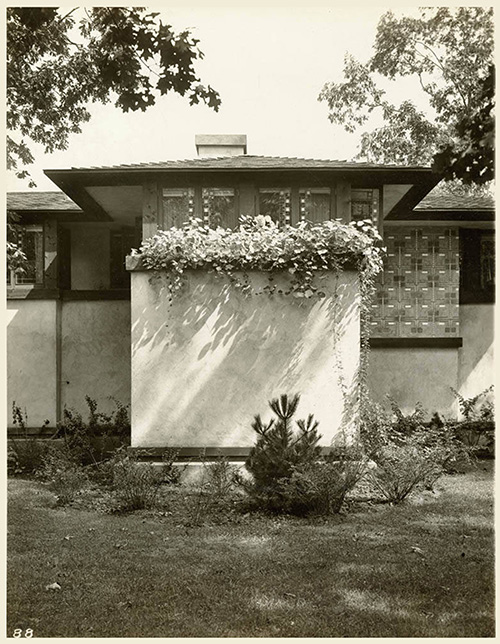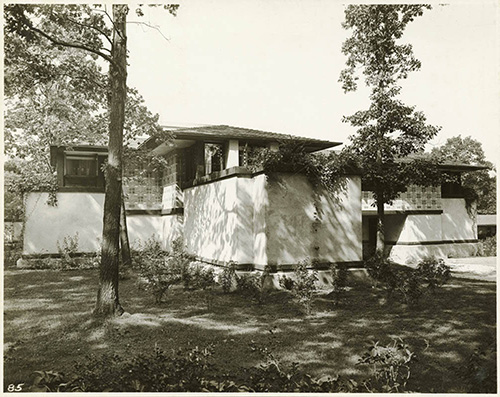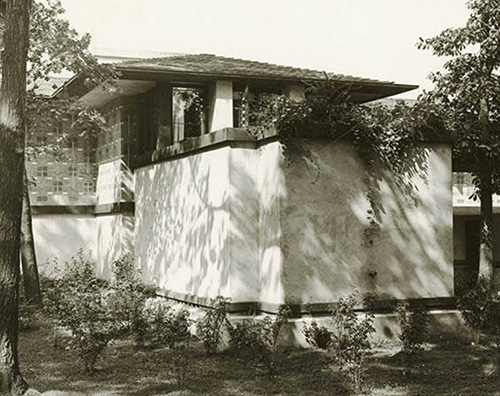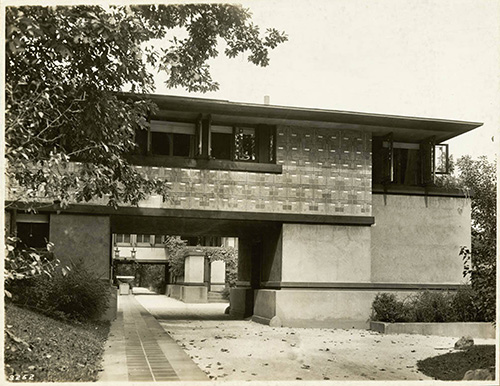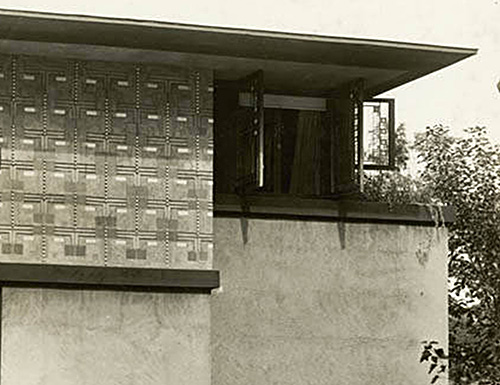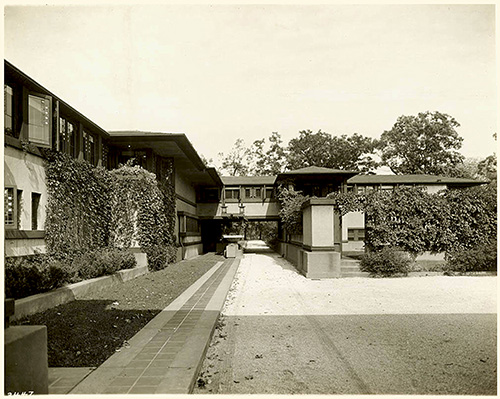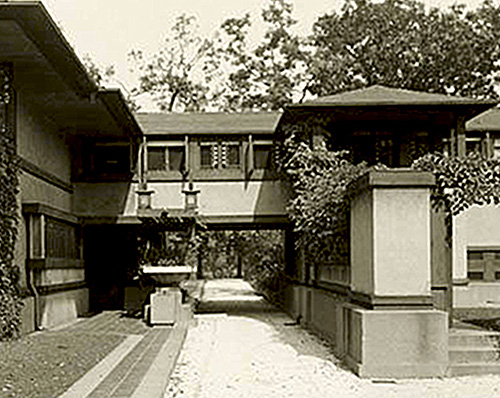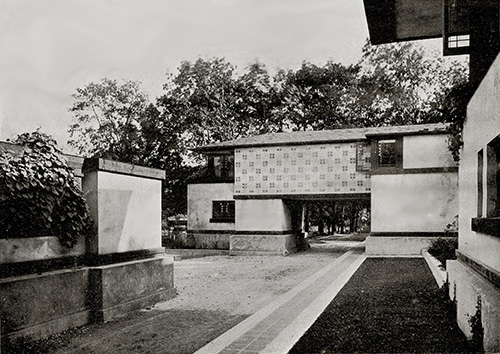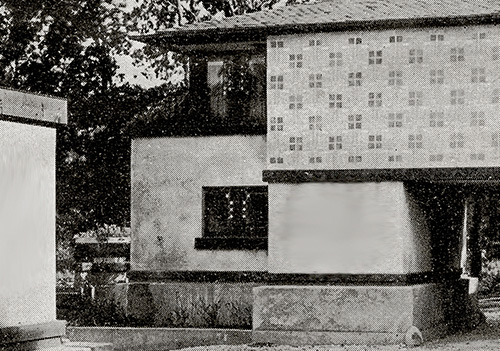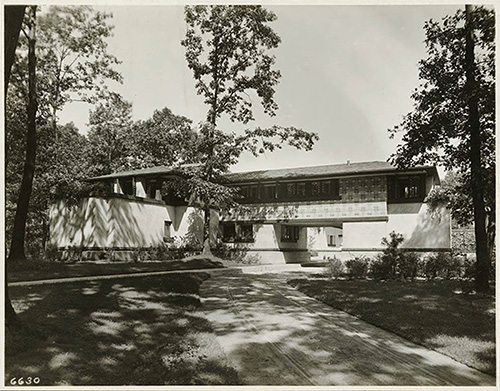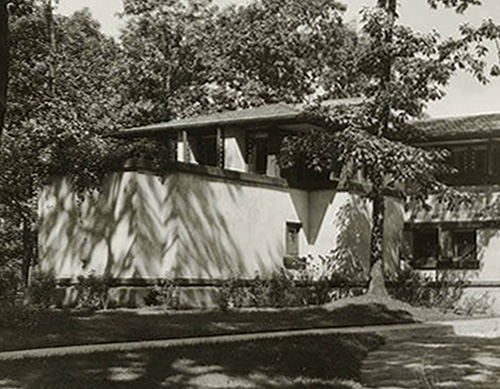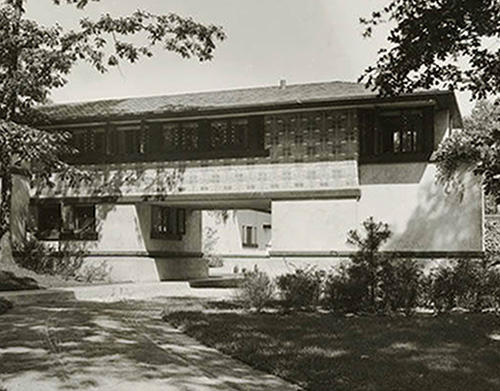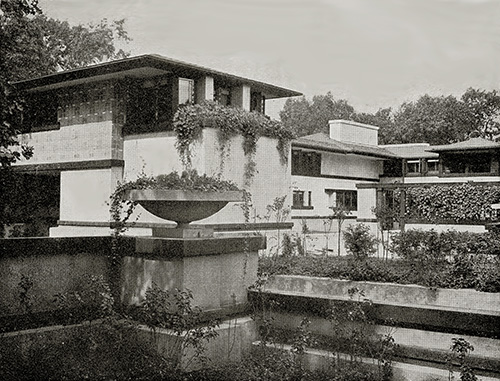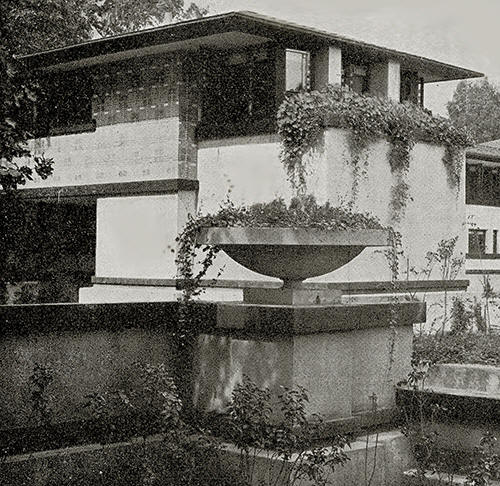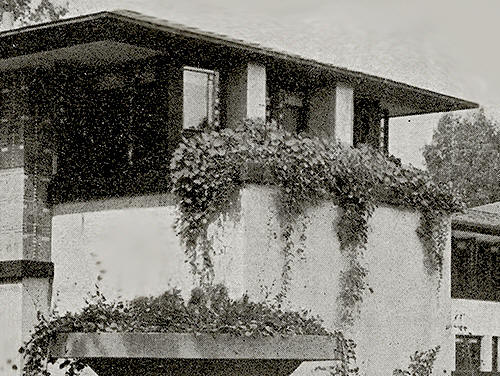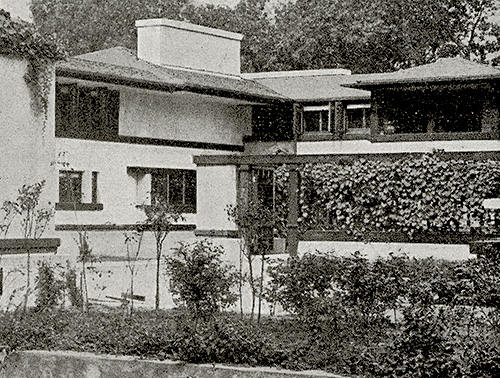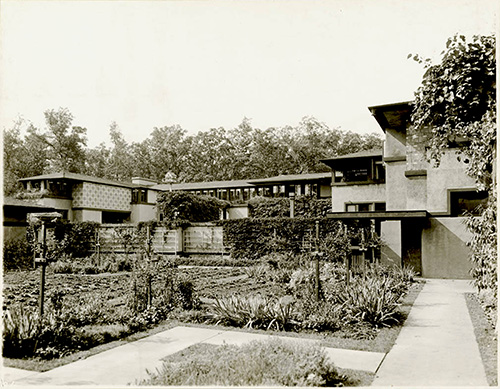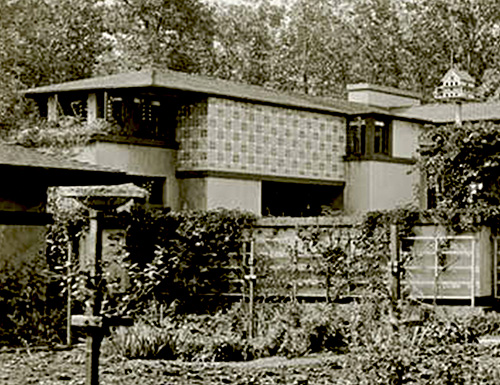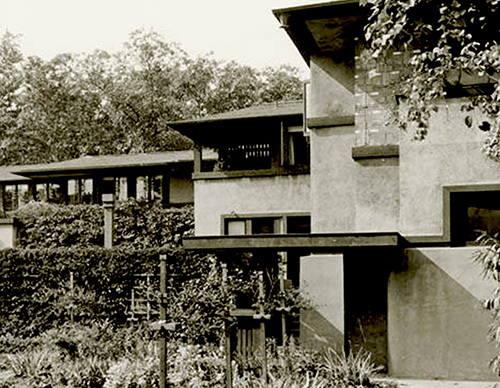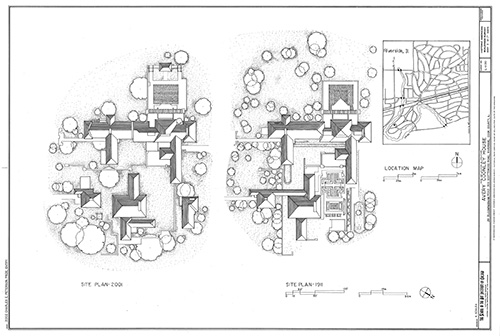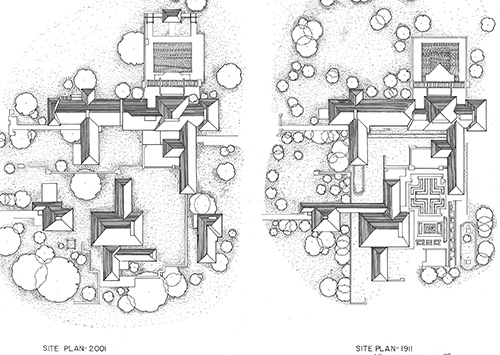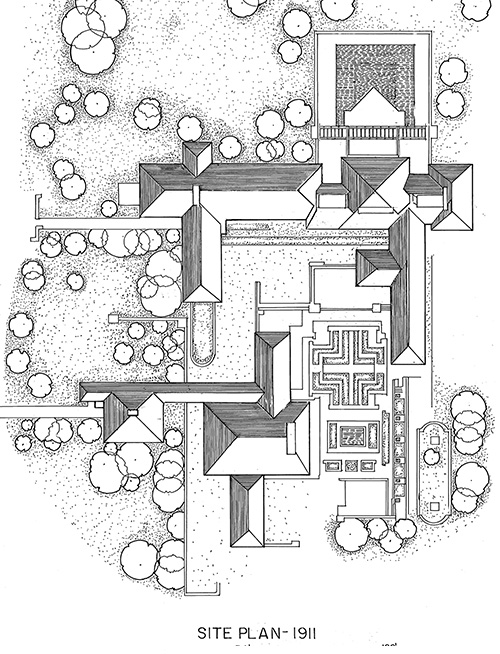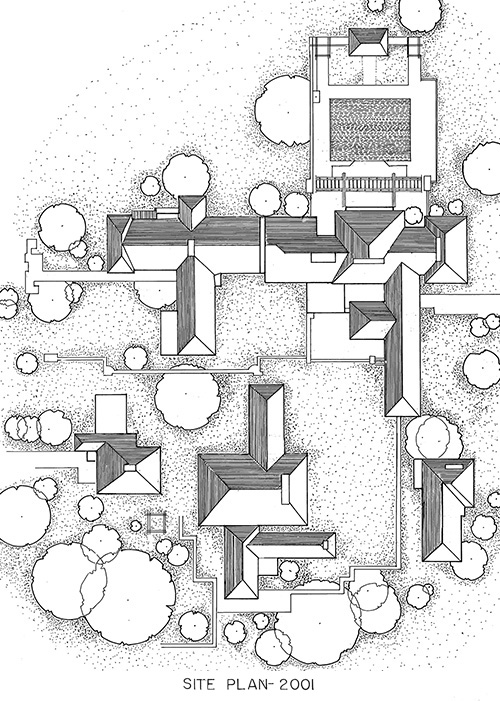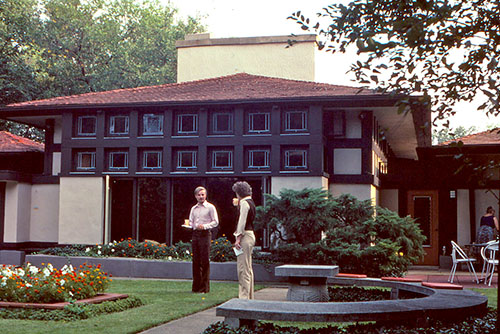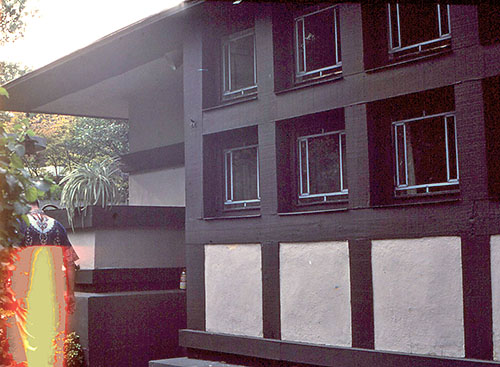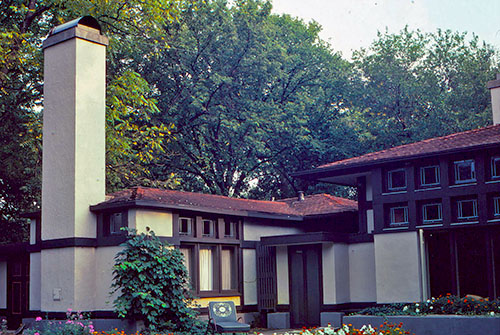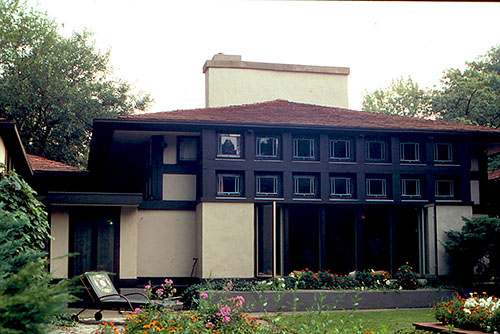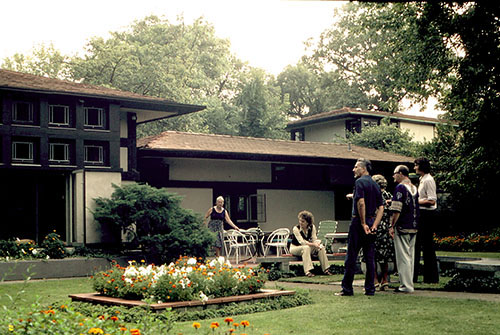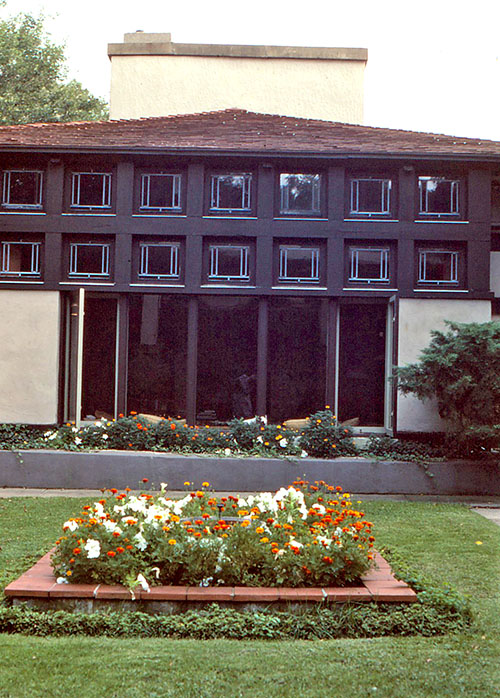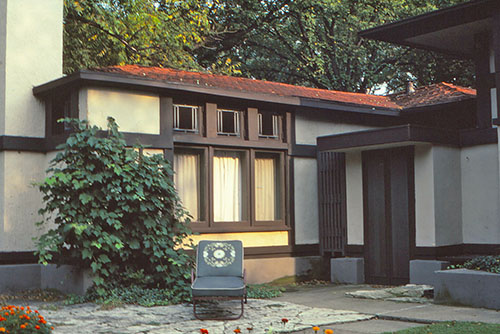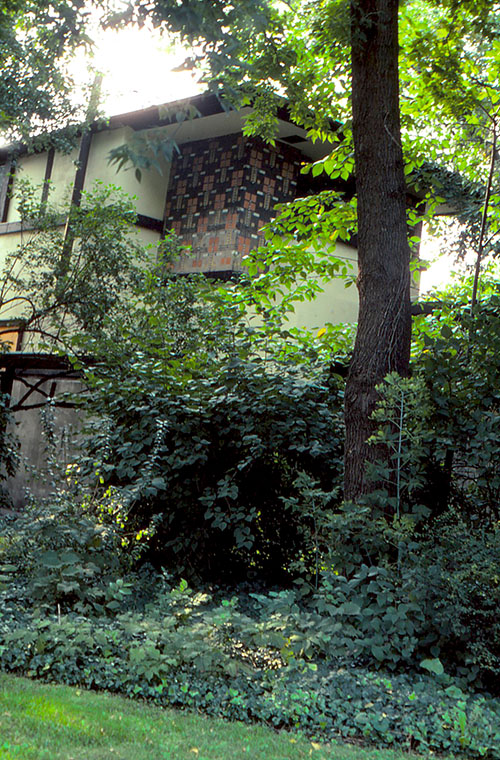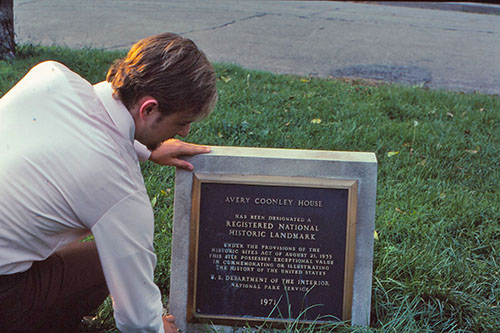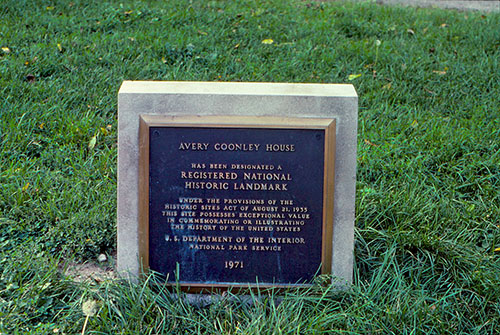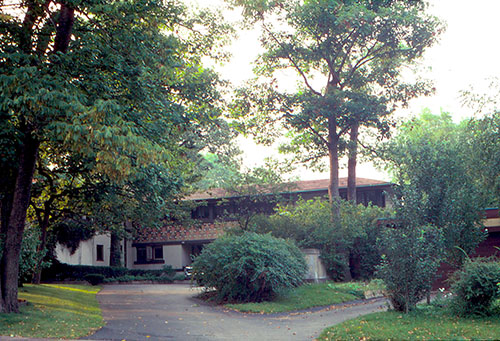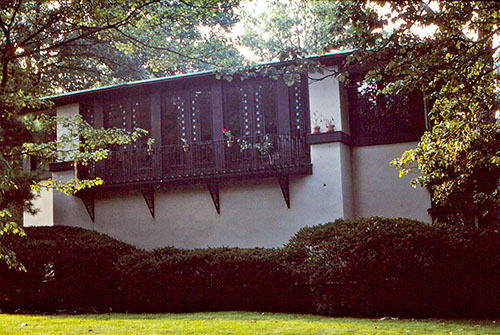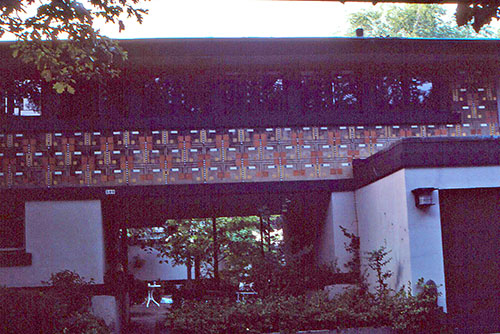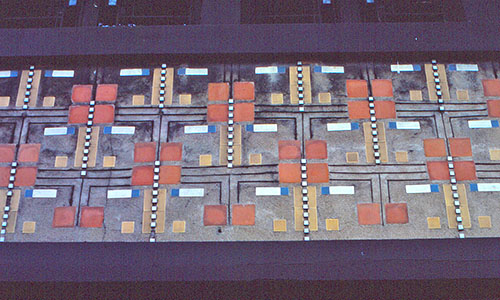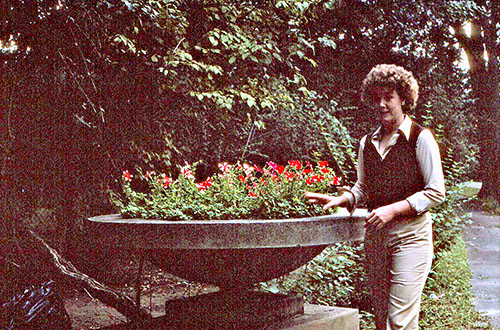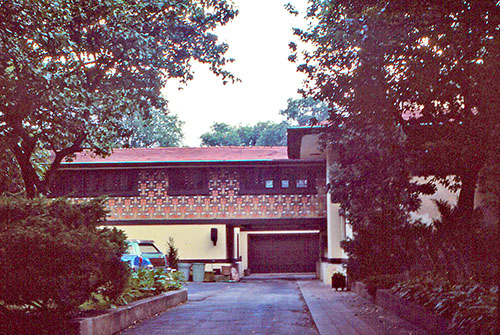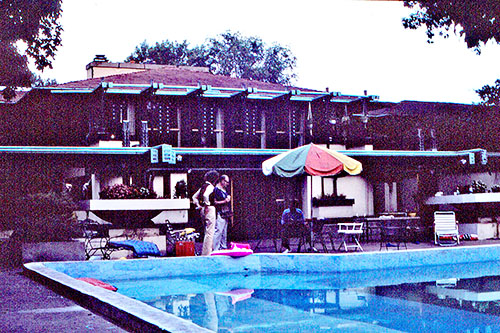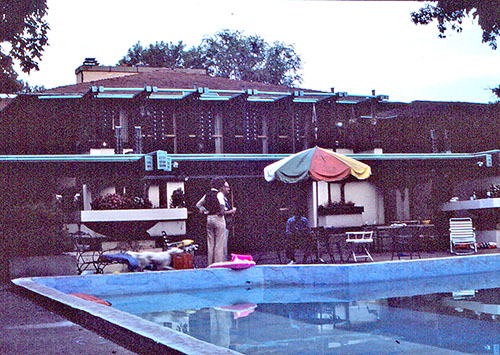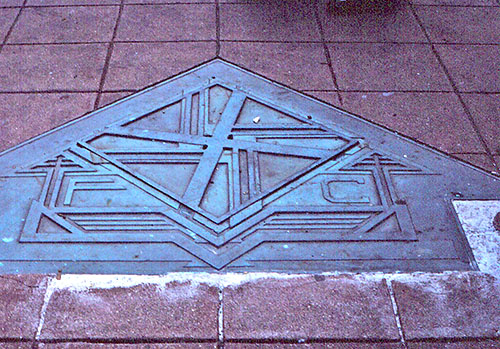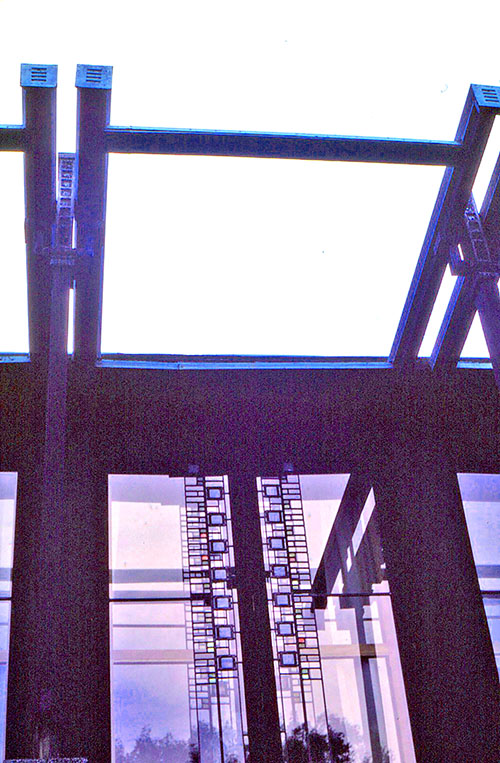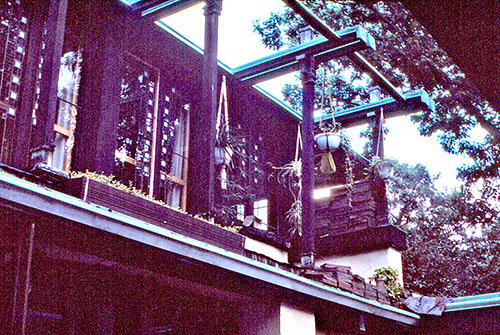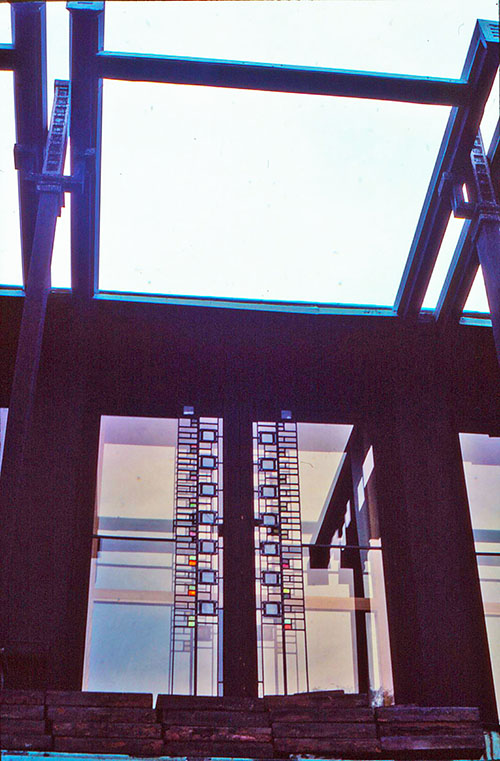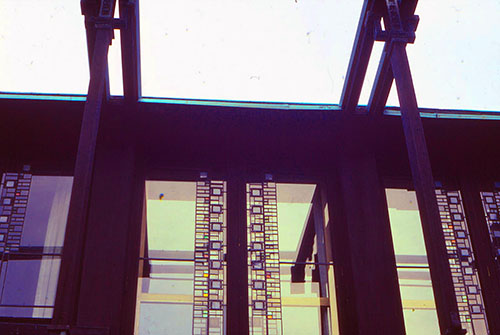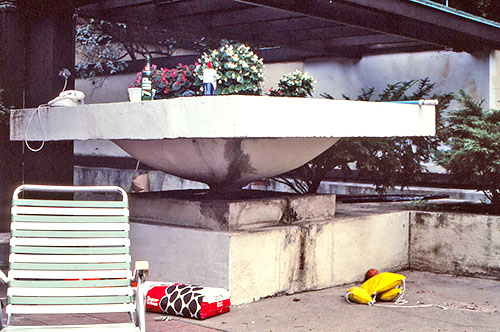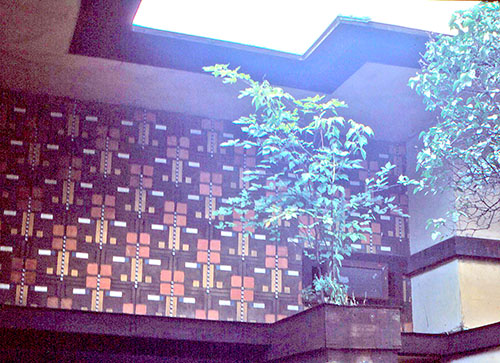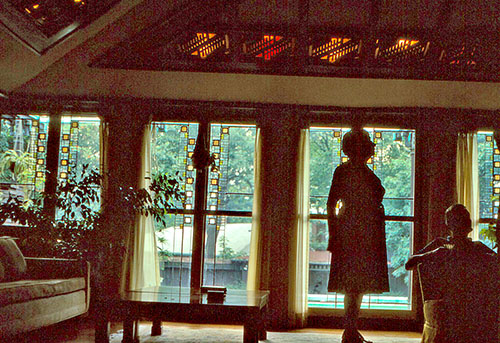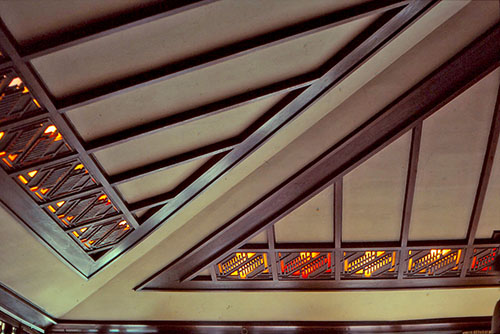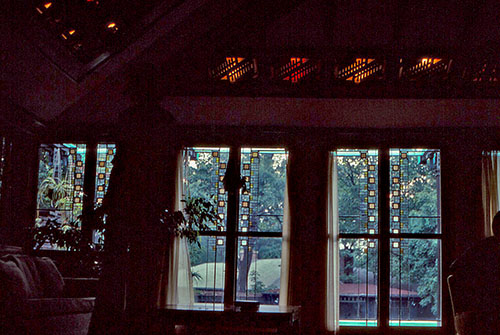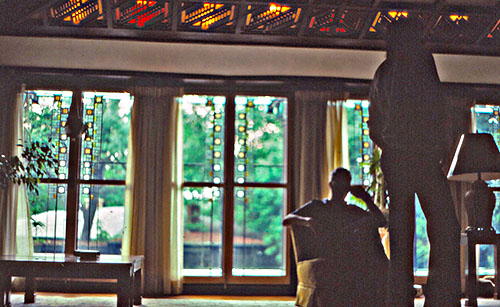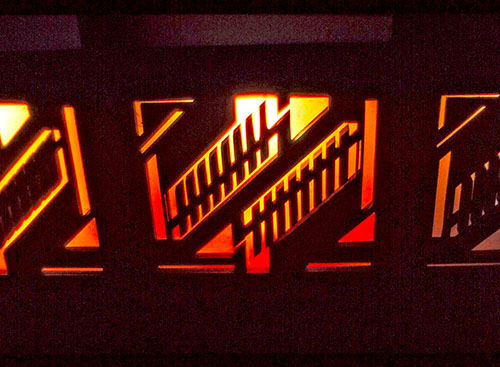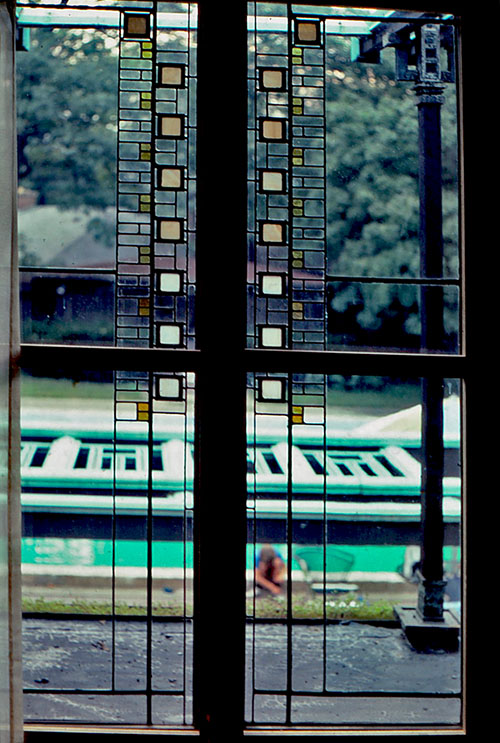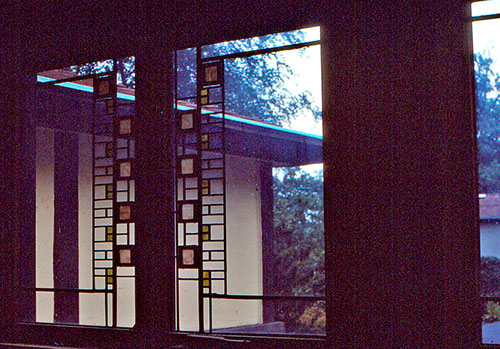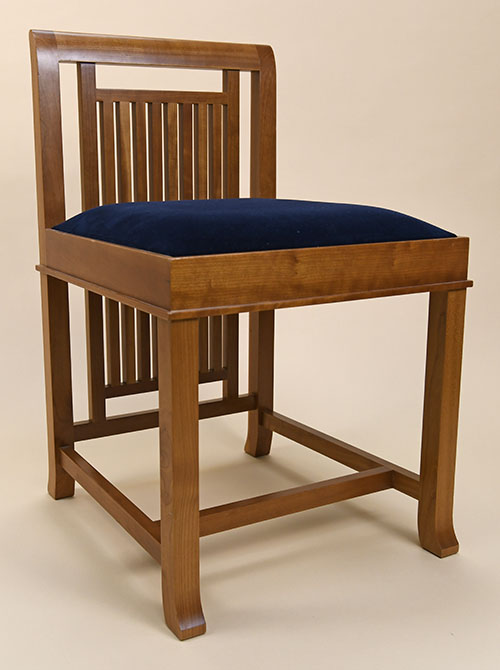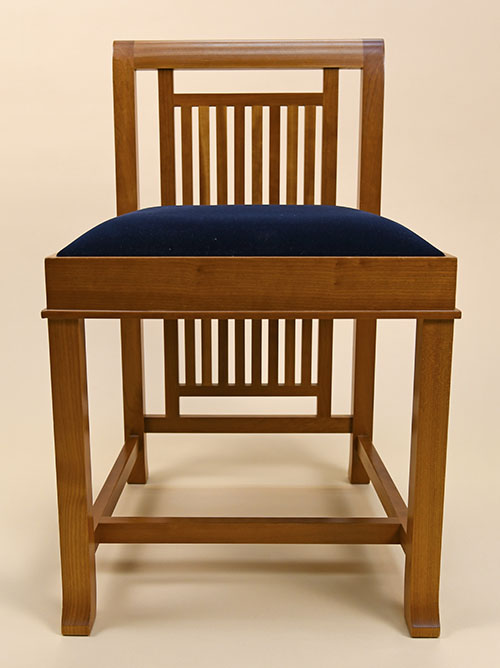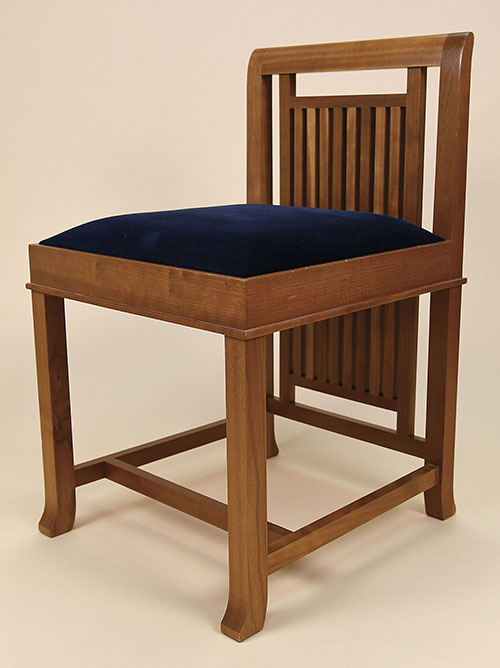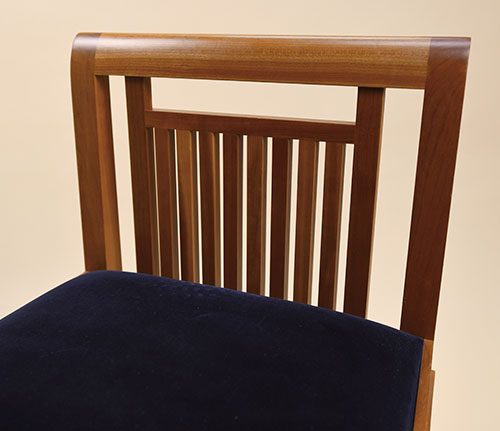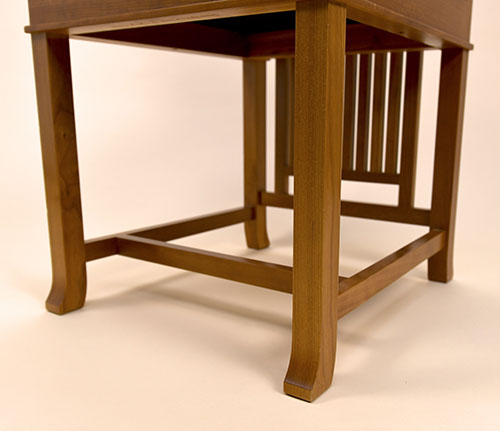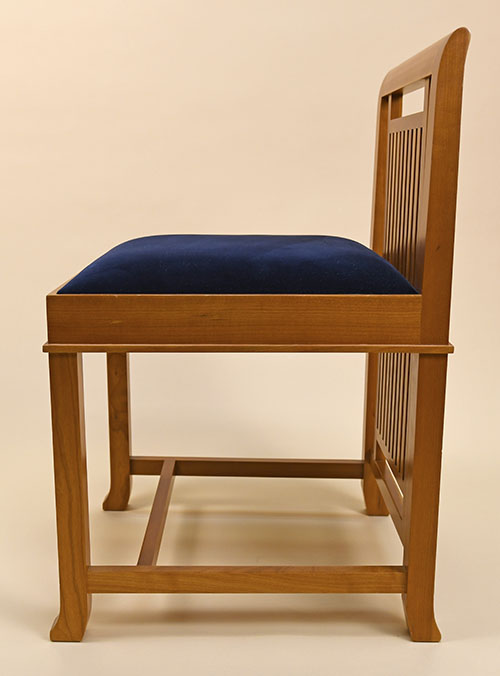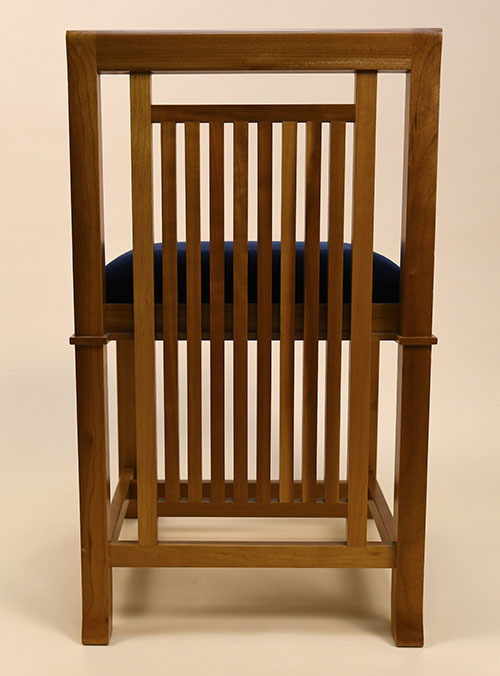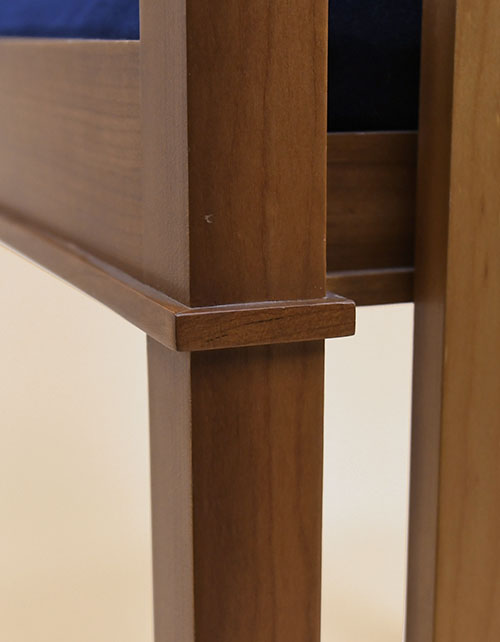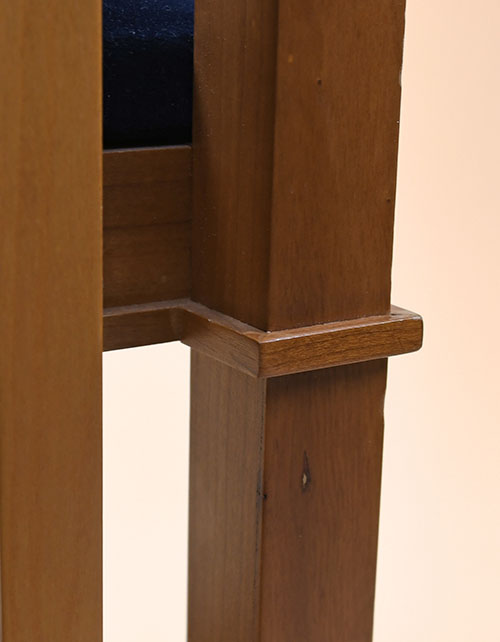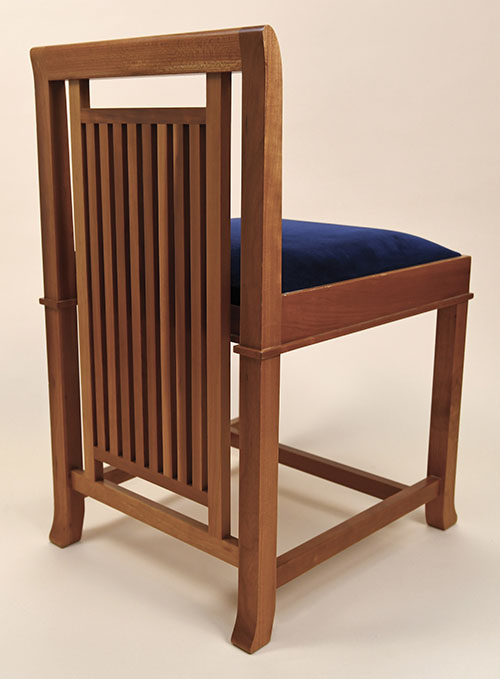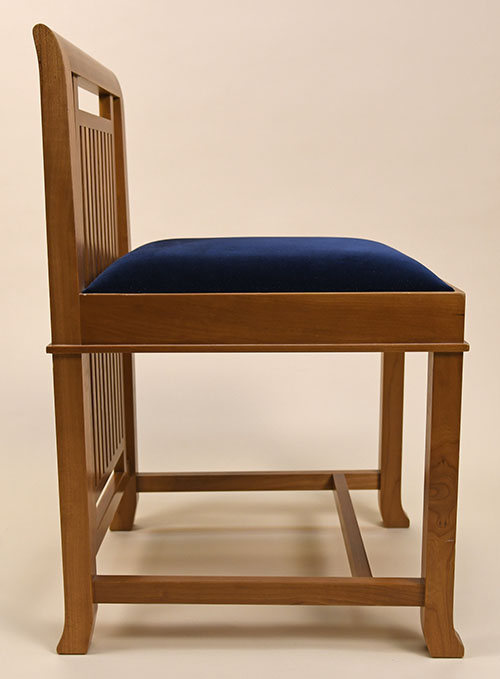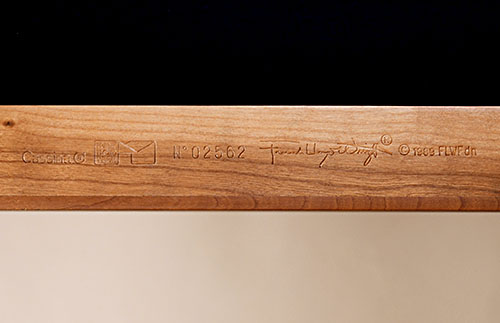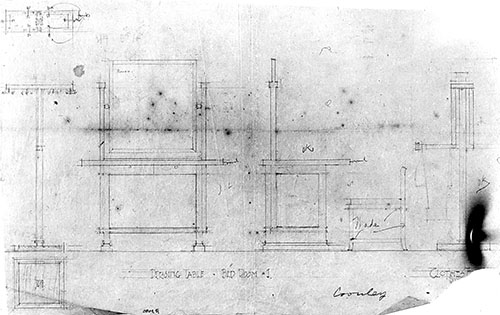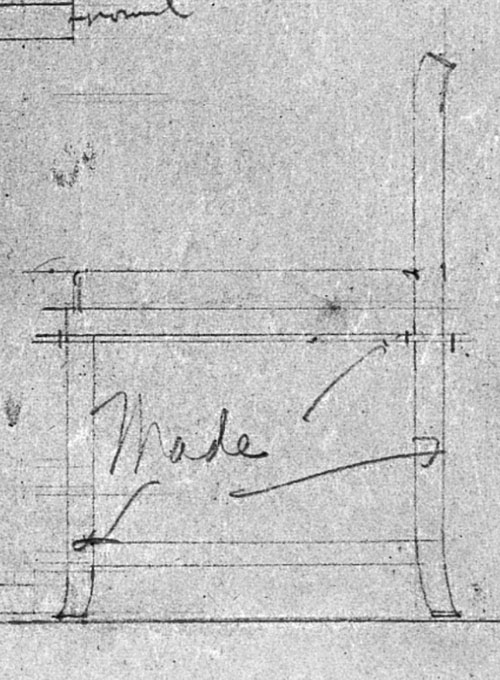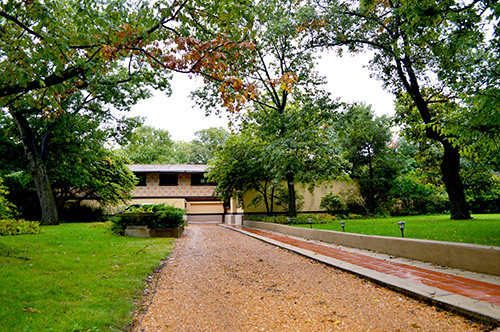
SUPPORT THE
WRIGHT LIBRARY
PROCEEDS FROM EVERY SALE GOES TO SUPPORT THE WRIGHT LIBRARY.
CLICK TO ORDER.
WE PROUDLY SUPPORT THE FRANK LLOYD WRIGHT FOUNDATION
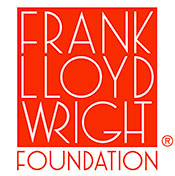
WE PROUDLY SUPPORT THE FRANK LLOYD WRIGHT BUILDING CONSERVANCY
WE PROUDLY SUPPORT FALLINGWATER
AND THE WESTERN PENNSYLVANIA CONSERVANCY

AVERY COONLEY RESIDENCE, RIVERSIDE, ILLINOIS (1907 - S.135)
GARDENER'S COTTAGE (1911 - S.137), COACH HOUSE (1911 - S.136)
Avery Coonley was born in Rochester, New York, on Oct 10, 1870 to John Clark and Lydia Arms (Avery) Coonley. They moved to Chicago In 1873. John Clark Coonley, a wealthy attorney and business man, past away in 1882. Lydia Avery Coonley was born in Virginia on Jan 31, 1845 to Benjamin Franklin and Susan Look Avery. Lydia Avery Coonley (Avery Coonley's mother) became the heiress to a fortune, derived from the manufacturing of farm machinery. She became a writer, publishing many poems and books. One poem entitled "Indian Summer", was published in the Nov 3, 1894 "The Outlook". She compiled a number of poems and published "Singing Verses for Children". She was also the author of "Under The Pines and Other Verses", published in 1895 by another client of Wright's, Chauncey Williams, of Way & Williams. She also wrote and published "Washington and Lincoln". She was active in the women's movement, and was president of the Chicago Women's Club from 1895-1896. On March 18, 1897, Lydia Avery Coonley, a wealthy Chicago widow, married Naturalist Henry Augustus Ward. He owned the largest meteor collection in the world.
Avery Coonley graduated from Harvard, then took graduate work at M.I.T. He married Queene Ferry of Detroit, Michigan in1901. A businessman and industrialist, he was very active in a number of businesses. Manufacturing, publishing, merchandising, real estate and live stock to name a few. He was a director of "The Dial Co.", owned by another of Wright'sclients, Francis Fisher Browne (Browne's Bookstore). He coauthored "Christian Science and the Bible" in 1915.
Queene Ferry Coonley, born Addie Elizabeth Ferry, (1874-1958), was born in Detroit to garden seed magnate Dexter Ferry and his wife Addie. Queene graduated from Vassar College in 1896, married Avery Coonley in 1901. They had one child, Elizabeth Ferry Coonley, born in 1902.
Mrs. Avery (Queene Ferry) Coonley, a believer in early childhood education, attempted to enroll her daughter in Kindergarten. She was denied entrance because her daughter was not yet five. In 1906, Mrs. Coonley formed the Cottage School in Riverside, Illinois, a private independent school. In 1912, Wright designed the Coonley Playhouse to accommodate the growth of the Cottage School. The school continued to grow, and In 1916, moved to a new facility. In addition to her duties at school she was treasurer of the National Women's Party; a trustee of Vassar College and vice president of the Progressive Education Association.
In 1920, Avery Coonley past away at only fifty years of age. In 1929, in honor of her late husband, she changed the name to the Avery Coonley School. In 1954, Queene Ferry Coonley published "Great thoughts: an anthology of sayings, garnered over the years". She past away in the same year a Wright, 1959. The Avery Coonley still functions as a school today in Downer's Grove, Illinois.
COONLEY RESIDENCE SITE PLANS (1907) COONLEY RESIDENCE FLOOR PLANS (1907)
COONLEY HOUSE DINING ROOM WINDOWS (1908) COONLEY HOUSE WINDOWS (1908) COONLEY RESIDENCE FLOOR PLANS (1910)
COONLEY RESIDENCE EXTERIOR 1910 HABS SITE PLAN 1911/2001 COONLEY RESIDENCE AND COACH HOUSE (1977)
COONLEY LOW BACK CHAIR (1989) COONLEY RESIDENCE 2018 COONLEY COACH HOUSE 2018 GARDENER'S COTTAGE 2018
AVERY COONLEY PLAYHOUSEDate: 1907
Title: 1) Avery Coonley Residence, Riverside, Illinois, Site Plan, 1907 (FLLW #0803.18) (1907 - S.135).
Description: Site plan for the Avery Coonley Residence and estate. Designed by Frank Lloyd Wright in 1907. According to Dean Eastman, the block that the Coonley Residence was built on, was a tract of land comprised nine lots which covered about 5 acres. The whole block was purchased by the Coonley’s in 1906. By 1912 they had purchased an additional nine adjacent lots which brought the total area to about 10 acres. Frank Lloyd Wright’s Coonley House, 2012, p.40-42. The plan covered the entire block and included the residence and pool, stable, gardener’s cottage and gardens. The driveway extends the full width of the block. On either side of the guest wing the drive branches toward the stable. The North side drives through the stable and the South side drives between the stable and the Gardener’s Cottage. It is interesting to note that the landscaping plan extend North between the river and Bloomingbank Road. Not only does the landscaping extend, but so does the walkway. As you follow the sidewalk from the house to Bloomingbank Road, just before you reach the street as you walk North, the sidewalk splits, and extends all the way to the river bank. There appears to be a small structure and a dock. On the South side of the property, a pergola extends from the gardener’s cottage to two tennis courts on the West end of the property.
Text top right: “Mr. Avery Coonley Dwelling, Riverside, Illinois. Frank Lloyd Wright Architect. Oak Park, Illinois.” Hand written lower left: “0803.18.” Courtesy of the Frank Lloyd Wright Archives, Avery Library, Columbia University. (FLLW #0803.18) See Additional Details...
Size: 10 x 8 Color photograph.
S#: 0080.72.0425Date: 1907
Title: 2) Avery Coonley Residence, Riverside, Illinois, Site Plan, 1907 (FLLW #0803.19) (1907 - S.135).
Description: Site plan for the Avery Coonley Residence and estate. Designed by Frank Lloyd Wright in 1907. According to Dean Eastman, the block that the Coonley Residence was built on, was a tract of land comprised nine lots which covered about 5 acres. The whole block was purchased by the Coonley’s in 1906. By 1912 they had purchased an additional nine adjacent lots which brought the total area to about 10 acres. Frank Lloyd Wright’s Coonley House, 2012, p.40-42. The plan covered the entire block and included the residence and pool, stable, gardener’s cottage and gardens. It is interesting to note that the landscaping plan extend North between the river and Bloomingbank Road. Not only does the landscaping extend, but so does the walkway. As you follow the sidewalk from the house to Bloomingbank Road, just before you reach the street as you walk North, the sidewalk splits, and extends all the way to the river bank. There appears to be a small structure and a dock. On the South side of the property, a walkway extends from the gardener’s cottage to two tennis courts and a structure on the West end of the property.
Text top right: “Mr. Avery Coonley Dwelling, Riverside, Illinois. Frank Lloyd Wright Architect. Oak Park, Illinois.” Hand written lower left: “0803.19.” Courtesy of the Frank Lloyd Wright Archives, Avery Library, Columbia University. (FLLW #0803.19) See Additional Details...
Size: 10 x 8 Color photograph.
S#: 0080.73.0425Date: 1907
Title: 3) Avery Coonley Residence, Riverside, Illinois, Site Plan, 1907 (FLLW #0803.20) (1907 - S.135 ).
Description: Site plan for the Avery Coonley Residence and estate. Designed by Frank Lloyd Wright in 1907. According to Dean Eastman, the block that the Coonley Residence was built on, was a tract of land comprised nine lots which covered about 5 acres. The whole block was purchased by the Coonley’s in 1906. By 1912 they had purchased an additional nine adjacent lots which brought the total area to about 10 acres. Frank Lloyd Wright’s Coonley House, 2012, p.40-42. The plan covered the entire block and included the residence and pool, stable, gardener’s cottage and gardens. The driveway extends the full width of the block. On either side of the guest wing the drive branches toward the stable. The North side drives through the stable and the South side drives between the stable and the Gardener’s Cottage. On the South side of the property, a pergola extends from the gardener’s cottage to two tennis courts on the West end of the property. It is interesting to note that on the north end of the property there was an “old House” located on the proiperty.
Text bottom right: “Mr. And Mrs. Avery Coonley, Riverside, Illinois. Plot of Grounds. Frank Lloyd Wright Architect. Oak Park, Illinois.” Hand written lower left: “0803.20.” Courtesy of the Frank Lloyd Wright Archives, Avery Library, Columbia University. (FLLW #0803.20) See Additional Details...
Size: 10 x 8 Color photograph.
S#: 0080.74.0425Date: 1907
Title: 4) Avery Coonley Residence, Riverside, Illinois, Site Plan, 1907 (FLLW #0803.21) (1907 - S.135).
Description: Site plan for the Avery Coonley Residence and estate. Designed by Frank Lloyd Wright in 1907. According to Dean Eastman, the block that the Coonley Residence was built on, was a tract of land comprised nine lots which covered about 5 acres. The whole block was purchased by the Coonley’s in 1906. By 1912 they had purchased an additional nine adjacent lots which brought the total area to about 10 acres. Frank Lloyd Wright’s Coonley House, 2012, p.40-42. The plan covered the entire block and included the residence and pool, stable, gardener’s cottage and gardens. The driveway extends the full width of the block. On either side of the guest wing the drive branches toward the stable. The North side drives through the stable and the South side drives between the stable and the Gardener’s Cottage. It is interesting to note that the landscaping plan extend North between the river and Bloomingbank Road. Not only does the landscaping extend, but so does the walkway. As you follow the sidewalk from the house to Bloomingbank Road, just before you reach the street as you walk North, the sidewalk splits, and extends all the way to the river bank. There appears to be a small structure and a dock. On the South side of the property, a pergola extends from the gardener’s cottage to two tennis courts on the West end of the property.
Text bottom right: “Mr. & Mrs. Avery Coonley Dwelling, Riverside, Illinois. Frank Lloyd Wright Architect. Oak Park, Illinois.” Hand written lower left: “0803.21.” Courtesy of the Frank Lloyd Wright Archives, Avery Library, Columbia University. (FLLW #0803.21) See Additional Details...
Size: 10 x 8 Color photograph.
S#: 0080.75.0425Date: 1907
Title: Avery Coonley Residence, Riverside, Illinois, First Floor Plan, 1907 (FLLW #0803.83) (1907 - S.135).
Description: First floor plan for the Avery Coonley Residence. Designed by Frank Lloyd Wright in 1907. The upper level, the “first floor” is the living space: living and dining rooms, kitchen, bedrooms, guest rooms and servants quarters. The concept, the living space on the second level is similar to the Robie House designed only one year earlier, in 1906.
What Wright labeled on the plans as the “Basement” is actually the ground floor. The drive began at Bloomingbank Road, past the full length of the house, which is 180 feet long, and exited onto Scottswood Road. It flowed under two wings, the servants quarters, and the guest wing. The space under the two wings form porte cocheres. The main entrance is under the first wing and leads to the entrance hall on the ground floor. Stairs leading to the first floor, the living space is on the left. Past the stairs on the ground level is the playroom, which is directly below the living room. An addition, just past the first wing was built on the drive, now forming a courtyard. Lower text: “First Floor Plan.” Hand written lower left: “0803.83.” Courtesy of the Frank Lloyd Wright Archives, Avery Library, Columbia University. (FLLW #0803.83) See Additional Details...
Size: 10 x 7.5 Color photograph.
S#: 0080.69.0425Date: 1907
Title: Coonley Residence, Riverside, Illinois, Ground Floor Plan, 1907 (FLLW #0803.82) (1907 - S.135).
Description: Ground floor plan for the Avery Coonley Residence. Designed by Frank Lloyd Wright in 1907. The main entrance on the ground floor is under the first wing and leads to the entrance hall. Stairs leading to the first floor, the living space is on the left. Past the stairs on the ground level is the playroom, which is directly below the living room. The ground floor is used for storage and work spaces. The upper level, the “first floor” is the living space: living and dining rooms, kitchen, bedrooms, guest rooms and servants quarters. The concept, the living space on the second level is similar to the Robie House designed only one year earlier, in 1906.
What Wright labeled on the plans as the “Basement” is actually the ground floor. The drive began at Bloomingbank Road, past the full length of the house, which is 180 feet long, and exited onto Scottswood Road. It flowed under two wings, the servants quarters, and the guest wing. The space under the two wings form porte cocheres. An addition, just past the first wing was built on the drive, now forming a courtyard. Lower text: “Basement Plan.” Hand written lower left: “0803.83.” Courtesy of the Frank Lloyd Wright Archives, Avery Library, Columbia University. (FLLW #0803.82) See Additional Details...
Size: 10 x 7.5 Color photograph.
S#: 0080.70.0425Date: 1907
Title: 1) Avery Coonley Residence, Riverside, Illinois, Typical Window Plan, 1907 (FLLW #0803.59) (1907 - S.135 ).
Description: Typical window design plan for the Avery Coonley Residence. Designed in 1907 by Frank Lloyd Wright. Many of the windows in the residence came in pairs with the design facing each other creating a symmetry, mirroring the design in each window.
“As the main geometric element, the windows of the main house employ the strong, independent square first seen in the W. A. Glasner house and the Unity Temple clerestories. More important, with the windows of the Coonley house, Wright cautiously approached asymmetrical design by halving the composition vertically and shifting the vertical axis to the jamb, as he had done previously in the Susan Lawrence Dana and Darwin D. Martin houses on a smaller scale (discussed below). This vertical axis seems both strong yet delicate with its heavily outlined squares of white glass and small, lightly outlined squares of yellow, balanced on a thin vertical line. Setting these windows or doors in pairs reestablishes their symmetry...” Light Screens, Frank Lloyd Wright, Sloan, 2001, p.188.
Text hand-written on the right: “Typical Window Design. Mr. Avery Coonley.” Hand written lower left: “0803.59.” Courtesy of the Frank Lloyd Wright Archives, Avery Library, Columbia University. (FLLW #0803.59) See Additional Details Dining Room Window... See Additional Details Three Window Set...
Size: 10 x 8 Color photograph.
S#: 0080.77.0525Date: 1907
Title: 2) Avery Coonley Residence, Riverside, Illinois, Window Design Plan, 1907 (FLLW #0803.60) (1907 - S.135 ).
Description: Typical window plan for a three window set for the Avery Coonley Residence. Designed in 1907 by Frank Lloyd Wright. Many of the windows in the residence came in pairs with the design facing each other creating a symmetry, mirroring the design in each window. In many of Wright’s designs, windows and doors opened outward. This created an issue with exterior flower boxes. Opening outward would interfere with plantings. Wright devised a plan for windows adjacent to exterior flower boxes. He added a windows below the pair. The lower window was stationary and continued the glass design from above. This allowed the upper pair to open outward without disturbing the contents of the flower box. These were prominent in the dining room as well as others windows that were adjacent to exterior built-in flower boxes.
“As the main geometric element, the windows of the main house employ the strong, independent square first seen in the W. A. Glasner house and the Unity Temple clerestories. More important, with the windows of the Coonley house, Wright cautiously approached asymmetrical design by halving the composition vertically and shifting the vertical axis to the jamb, as he had done previously in the Susan Lawrence Dana and Darwin D. Martin houses on a smaller scale (discussed below). This vertical axis seems both strong yet delicate with its heavily outlined squares of white glass and small, lightly outlined squares of yellow, balanced on a thin vertical line. Setting these windows or doors in pairs reestablishes their symmetry...” Light Screens, Frank Lloyd Wright, Sloan, 2001, p.188.
Text hand-written on the right: “Coonley Plans. FLLW. 1907.” Hand written lower left: “0803.60.” Courtesy of the Frank Lloyd Wright Archives, Avery Library, Columbia University. (FLLW #0803.60) See Additional Details Dining Room Window... See Additional Details Three Window Set...
Size: 10 x 8 Color photograph.
S#: 0080.78.0525Date: 1907
Title: 3) Avery Coonley Residence, Riverside, Illinois, Elevations, 1907 (FLLW #0803.86) (1907 - S.135 ).
Description: East, North and South elevations for the Avery Coonley Residence. Designed in 1907 by Frank Lloyd Wright. After locating the original plan for the Coonley three-widow set (S#0080.78), the question arose, “Did Wright intend these sets for other rooms in the house?” The East, North and South Elevation Plan answered the question. Besides the dining room , we were able to locate other locations: A) The East end of the Servants wing. B) Dining Room. C) Master Bedroom. There was a flower box on the West end of the master bedroom dressing room, and the three window set may have been placed there.
Text: “East Elevation. North Elevation. South Elevation.” Hand written lower left: “0803.86.” Courtesy of the Frank Lloyd Wright Archives, Avery Library, Columbia University. (FLLW #0803.86) See Additional Details...
Size: 10 x 8 Color photograph.
S#: 0080.79.0525Date: 1907
Title: Avery Coonley Residence, Riverside, Illinois, Dressing Table, Bedroom #1 (FLLW #0803.51) (1907 - S.135).
Description: Front and side view of the dressing table and side view of the chair. Designed by Frank Lloyd Wright in 1907, the chair was executed in 1908. We could not find examples of this table, but many examples the the chair. In 1989, Cassina produced a low back that matched this drawing but called it a dining room chair. The Cassina: 609 Coonley, 1. Was designed with a handhold below the crest rail. There is a space at the base of the back of the chair that mirrors the Handhold at the top. Eight shorter spindles run parallel to a long and larger spindle on either side. Horizontal trim runs along the base of the seat and runs along the front, sides and back. Like the crest tail that curves out at the top, the base of the legs curve outward also. Forward in the front, backwards in the back.
There is a matching chair in a photograph from 1911, Wright's Home and Studio (S#0104.15). In a bedroom for Wright's daughter Catherine, there is a Japanese Print Table, designed by Wright in 1898, used as a desk. In front of desk is a low back chair that matches this Coonley low back chair. Wright also designed a low bak chair for William E. Martin Residence, Oak Park, Illinois (1902 - S.061).
Frank Lloyd Wright also designed a matching high back dining room chair for the Coonley's in 1907. Wright made slight modifications to the Coonley high back chair for Isabel Roberts Residence(1908 - S.150).
Lower text: "Dressing Table. Bed Room #1." Hand written lower left: "0803.51." Courtesy of the Frank Lloyd Wright Archives, Avery Library, Columbia University. (FLLW #0803.51) See Additional Details...
Size: 10 x 6.5 B&W photograph.
S#: 0080.57.0323Date: 1908
Title: Avery Coonley Residence , Riverside, Illinois, Pair of Original Dining Room Leaded Art Glass Casement Windows, 1908 (1907 - S.135).
Description: A pair of original art glass casement windows from the Avery Coonley Residence Dining Room. Designed by Frank Lloyd Wright in 1907. Wright created a different window design for all four Coonley buildings: Residence, Carriage House, Gardener’s Cottage and the Playhouse. For some buildings, there were multiple designs.
We were able to identify three separate window designs for the Avery Coonley Residence. A: Main window design for the residence and it’s variations. These were dominated by larger opaque squares set in a vertical rows. B: A lower window which was placed below a pair of windows. C: The third design was for the hall skylight.
Numerous variations of the main design (A) for the Coonley residence are visible throughout the house. This particular pair of windows seemed to coincide with “B”, a lower window which was placed below a pair of windows creating a three window set. One of the original plans in the Avery Library is of this pair of windows along with the third, illustrating the three window set, (FLLW #0803.60).
Many of the windows in the residence came in pairs with the design facing each other creating a symmetry, mirroring the design in each window. In many of Wright’s designs, windows and doors opened outward. This created an issue with exterior flower boxes. See additional details...
Size: Glass windows including zinc frame: 14.5" Wide x 30" High each. Wood window frames: 18.25 x 34.75. Total size: 40.875 Wide x 37.75 High.
S#: 0085.64.0325 (1-2)
See additional details...
Date: 1908
Title: Avery Coonley Residence, Riverside, Illinois, Leaded Art Glass Windows, 1908 (1907 - S.135).
Description: Two original windows from the Avery Coonley Residence. Designed by Frank Lloyd Wright in 1907. Wright created a different window design for all four Coonley buildings: Residence, Carriage House, Gardener’s Cottage and the Playhouse. For some buildings, there were multiple designs.
We were able to identify three separate window designs for the Avery Coonley Residence. A: Main window design for the residence and it’s variations. These were dominated by larger opaque squares set in a vertical rows. B: A lower windows which was placed below a pair of windows. C: The third design was for the hall skylight.
Lower windows. These were prominent in the dining room as well as others windows that were adjacent to exterior built-in flower boxes. The lower window is stationary, allowing the upper pair to open outward without disturbing the contents of the flower box. The lower window design coordinates with the pair of windows above.
On the original plans in the Avery Library at Columbia University, besides the dining room, they appear in the master bedroom and dressing room, the east end of the guest and servant’s wing.
Acquired from Toomey & Company, Chicago. Two windows. Cames are 7/16" and 3/16" wide. The outer frame is 9/16" wide. Each window is made up of 12 pieces of clear glass.
Size: Two windows: 11.25 High x 44.5 Wide x .5 Deep.
S#: 0085.63.0623 (1-2)
See additional details...
See additional details...Date: 1910
Title: Ausgeführte Bauten und Entwurfe von Frank Lloyd Wright. View of the Entrance Alcove, Ground and Floor Plan. Plate LVIa (56a) (Published by Ernst Wasmuth A.-G., Berlin)
Author: Wright, Frank Lloyd
Description: Plate LVIa (56a). "Ground plan and view of entrance alcove, the Coonley house. Dwelling for Mr. and Mrs. Avery Coonley . Inner perspective of entrance alcove of living-room, and plan showing disposition of furniture." The left side includes the Plan for the Ground Floor (top left) and the Main Floor Plan (bottom left). The Entrance Alcove with stairwell and skylight is illustrated on the right. The Wright designed Copper Urn is prominently featured. The "Wasmuth Portfolio" (2 folio volumes, 100 plates) is considered the most important and influential architectural monograph of the 20th century. 1000 sets were printed, with 500 set aside for American distribution. According to Wright, most of the American sets were destroyed or water damaged in the Taliesin fire of 1914. This print has minor water damage along the bottom border from that fire. Wright's embossed square logo with his name is in the top left corner. There are only a few interior views. Three copies, one plate is part of a nearly complete two volume set acquired from Bruxelles, Belgium. (First Edition) (Sweeney 87) See Additional Details...
Size: 16 x 25.25
Pages: Plate LVIa (56a)
S#: 0087.56.0618a, 0087.56.1018a, 0087.56.1022aDate: 1910/202
Title: Avery Coonley Residence, Riverside, Illinois, Adaptation from Ausgeführte Bauten First Floor Plan. Plate LVIa (56a), 1910/2025 (1907 - S.135).
Description: Adaptation of the first floor plan of the Coonley Residence published in the Ausgeführte Bauten und Entwurfe von Frank Lloyd Wright, 1910. What Wright labeled on the Coonley plans as the “Basement” was actually the ground floor. The drive began at Bloomingbank Road, past the full length of the house, which is 180 feet long, and exited onto Scottswood Road. It flowed under two wings, the servants quarters, and the guest wing. The space under the two wings form porte cocheres. The main entrance is under the first wing and leads to the entrance hall on the ground floor. Stairs leading to the first floor, the living space is on the left. Past the stairs on the ground level is the playroom, which is directly below the living room. An addition, just past the first wing was built on the drive, now forming a courtyard.
The upper level, the first floor is the living space: living and dining rooms, kitchen, bedrooms, guest rooms and servants quarters. The concept, the living space on the second level is similar to the Robie House designed only one year earlier, in 1906. Adaptation by Douglas M. Steiner, 2025. See Additional Details...
Size: 10 x 7.5 B&W photograph.
S#: 0094.116.0425Date: Circa 1910
Title: 1) Avery Coonley Residence, Riverside, Illinois, Circa 1910 (1907 - S.135).
Description: View of the main entrance of the Coonley Residence from the Northeast. Designed by Frank Lloyd Wright in 1907. The main level is acturally the second floor. The Servant’s wing is on the left. The dining room is on the right. The house is approached from the North, down a long drive which is on the far right. Like many of Wright’s homes, the main entrance is hidden from view. This is no exception. The drive runs parallel to the right (East) elevation, through the porte cochere, seen in the center. The five lower windows in the center flood the entrance hall on the ground floor. It is interesting to note that there are no windows perforating the patterned northern wall of the servant’s wing on the left. Many windows were later added.
This was one of seven photographs of the Coonley House published in Architectural Record, October. 1911. Caption: “Side Elevation - Residence of Avery Coonley, Esq. Riverside, Ill. Frank Lloyd Wright, Architect.” Copy photograph, courtesy of Architectural Record. See Additional Details...
Size: 10 x 7 B&W photograph
S#: 0094.117.0425Date: Circa 1910
Title: 2) Avery Coonley Residence, Riverside, Illinois, Circa 1910 (1907 - S.135).
Description: West elevation viewed from the Northwest. Designed by Frank Lloyd Wright in 1907. The Coonley’s daughter Elizabeth is standing by a tree. The Dining Room is on the left, the pool is to the far right. The children’s playroom is on the first level in the center. The main level was raised to the upper level. The Living Room is in the center above the children’s playroom. “The Coonley house is one of the great masterpiece of all time. In it the architect has been given full reign to produce a work in which every facet came from his own imagination, and produced a unity we rarely see in the world of architecture.” Bruce Brooks Pfeiffer, Frank Lloyd Wright Monograph 1907-1913, 1987/1991, p.2. Published in Frank Lloyd Wright Ausgefuhrte Bauten, Wright, 1911, p.119. Text lower left: “77.”
Mounted to gray board. Label pasted to board: “182, R52453, B13C, 41. Riverside, Illinois. Coonley House. 1907-1908. Architect: Frank Lloyd Wright (1969- ). Label pasted to verso: Gift of the Carnegie Corporation.” Photographed by Clarence Fuermann, The Chicago Architectural Photographing Co. Acquired from the archives of the University of Minnesota. See Additional Details...
Size: Original 9 x 6.5 B&W Photograph.
S#: 0085.48.0420Date: Circa 1910
Title: 3) Avery Coonley Residence, Riverside, Illinois, Circa 1910 (1907 - S.135).
Description: View of the West elevation, pool and terrace. Designed by Frank Lloyd Wright in 1907. The dining room is to the far left. The living room and playroom beneath it are in the center, the bedrooms are to the right. Avery and Queene Ferry Coonley are on the right. Their daughter Elizabeth is playing by the pool in the center. The upper level, the first floor is the living space: living and dining rooms, kitchen, bedrooms, guest rooms and servants quarters. The concept, the living space on the second level, is similar to the Robie House designed only one year earlier, in 1906. Text lower left: “76.”
“The Coonley house is one of the great masterpiece of all time. In it the architect has been given full reign to produce a work in which every facet came from his own imagination, and produced a unity we rarely see in the world of architecture.” Bruce Brooks Pfeiffer, Frank Lloyd Wright Monograph 1907-1913, 1987/1991, p.2. Label pasted to verso: “Photographed by Clarence Fuermann, The Chicago Architectural Photographing Co.” Published in Frank Lloyd Wright Ausgefuhrte Bauten, Wright, 1911, p.119. See Additional Details...
Size: Original 10 x 8 B&W photograph.
S#: 0085.20.0112Date: Circa 1910
Title: 4) Avery Coonley Residence, Riverside, Illinois, Circa 1910 (1907 - S.135).
Description: View of the West elevation, pool and terrace. Designed by Frank Lloyd Wright in 1907. The dining room is on the left. The living room and playroom beneath it are in the center, the bedrooms are to the far right. The upper level, the first floor is the living space: living and dining rooms, kitchen, bedrooms, guest rooms and servants quarters. The concept, the living space on the second level, is similar to the Robie House designed only one year earlier, in 1906. Photographed at the same time as S#85.20.
“The Coonley house is one of the great masterpiece of all time. In it the architect has been given full reign to produce a work in which every facet came from his own imagination, and produced a unity we rarely see in the world of architecture.” Bruce Brooks Pfeiffer, Frank Lloyd Wright Monograph 1907-1913, 1987/1991, p.2. Photograph by Henry Fuermann. Published in Frank Lloyd Wright Ausgefuhrte Bautenn, Wright, 1911, p.117. Copy of the photograph published in Frank Lloyd Wright Ausgefuhrte Bauten, 1911, p.117. Also published in House and Garden, October 1910, p.231, which may have been the first time photographs of the Coonley House were published. Photographed by Clarence Fuermann, The Chicago Architectural Photographing Co. See Additional Details...
Size: Original 16 x 20 B&W photograph.
S#: 0085.40.0218Date: Circa 1910
Title: 5) Avery Coonley Residence, Riverside, Illinois, Circa 1910 (1907 - S.135).
Description: Detailed view of the West elevation, terrace, looking toward the entrance to the interior corridor. Designed by Frank Lloyd Wright in 1907. The living room and playroom beneath it are on the left, the bedrooms are to the right. The upper level, the first floor is the living space: living and dining rooms, kitchen, bedrooms, guest rooms and servants quarters. The concept, the living space on the second level, is similar to the Robie House designed only one year earlier, in 1906. Text lower left: “6639.”
“The Coonley house is one of the great masterpiece of all time. In it the architect has been given full reign to produce a work in which every facet came from his own imagination, and produced a unity we rarely see in the world of architecture.” Bruce Brooks Pfeiffer, Frank Lloyd Wright Monograph 1907-1913, 1987/1991, p.2. Photographed by Henry Fuermann. Published in Frank Lloyd Wright Ausgefuhrte Bauten, Wright, 1911, p.122. Also published in the Architectural Record, October. 1911, p.335. See Additional Details...
Size: 8 x 10 B&W photograph.
S#: 0094.118.0425Date: Circa 1910
Title: 6) Avery Coonley Residence, Riverside, Illinois, Circa 1910 (1907 - S.135).
Description: View of the West elevation master bedroom dressing room. Designed by Frank Lloyd Wright in 1907. There are two bedrooms to the left, the master bedroom and terrace are on the right. The upper level, the first floor is the living space: living and dining rooms, kitchen, bedrooms, guest rooms and servants quarters. The concept, the living space on the second level, is similar to the Robie House designed only one year earlier, in 1906. Text lower left: “88.”
“The Coonley house is one of the great masterpiece of all time. In it the architect has been given full reign to produce a work in which every facet came from his own imagination, and produced a unity we rarely see in the world of architecture.” Bruce Brooks Pfeiffer, Frank Lloyd Wright Monograph 1907-1913. 1987/1991, p.2. Photographed by Henry Fuermann. Published in Frank Lloyd Wright Ausgefuhrte Bauten, Wright, 1911, p.121. Also published in the Architectural Record, October. 1911, p.334. 8 x 10 B&W photograph. See Additional Details...
Size: 8 x 10 B&W photograph.
S#: 0094.119.0425Date: Circa 1910
Title: 7) Avery Coonley Residence, Riverside, Illinois, Circa 1910 (1907 - S.135).
Description: View from the Southwest of the South elevation. The master bedroom dressing room is on the left, The master bedroom and terrace is in the center, the Guest wing is in the background on the right. Designed by Frank Lloyd Wright in 1907. The upper level, the first floor is the living space: living and dining rooms, kitchen, bedrooms, guest rooms and servants quarters. The concept, the living space on the second level, is similar to the Robie House designed only one year earlier, in 1906. Text lower left: “85.”
“The Coonley house is one of the great masterpiece of all time. In it the architect has been given full reign to produce a work in which every facet came from his own imagination, and produced a unity we rarely see in the world of architecture.” Bruce Brooks Pfeiffer, Frank Lloyd Wright Monograph 1907-1913, 1987/1991, p.2. Photographed by Henry Fuermann. Published in Frank Lloyd Wright Ausgefuhrte Bauten, Wright, 1911, p.124. Also published in the Architectural Record, October. 1911, p.332. See Additional Details...
Size: 8 x 10 B&W photograph.
S#: 0094.120.0425Date: Circa 1910
Title: 8) Avery Coonley Residence, Riverside, Illinois, Circa 1910 (1907 - S.135).
Description: View of the South elevation guest room wing. There are two guest bedrooms on the main (upper) level. The drive began at Bloomingbank Road, at the far end, past the full length of the house, which is 180 feet long, and exited onto Scottswood Road, behind the camera. It flows under two wings, the servants quarters at the far end, and the guest wing in the foreground. The space under the two wings form porte cocheres. The main entrance is under the wing in the background. Designed by Frank Lloyd Wright in 1907. Text lower left: “3252.”
“The Coonley house is one of the great masterpiece of all time. In it the architect has been given full reign to produce a work in which every facet came from his own imagination, and produced a unity we rarely see in the world of architecture.” Bruce Brooks Pfeiffer, Frank Lloyd Wright Monograph 1907-1913, 1987/1991, p.2. Photographed by Henry Fuermann. See Additional Details...
Size: 8 x 10 B&W photograph.
S#: 0094.121.0425Date: Circa 1910
Title: 9) Avery Coonley Residence, Riverside, Illinois, Circa 1910 (1907 - S.135).
Description: View of the main house on the left, and the servant’s wing in the background. Designed by Frank Lloyd Wright in 1907. The main entrance on the ground floor is under the first wing, to the left of the pedestal and vase, and leads to the entrance hall. Stairs leading to the first floor, the living space is on the left. Past the stairs on the ground level is the playroom, which is directly below the living room. The ground floor is used for storage and work spaces. The upper level, the “first floor” is the living space: living and dining rooms, kitchen, bedrooms, guest rooms and servants quarters. The concept, the living space on the second level is similar to the Robie House designed only one year earlier, in 1906.
The drive began at Bloomingbank Road, at the far end, past the full length of the house, which is 180 feet long, and exited onto Scottswood Road, behind the camera. It flows under both wings. The space under the two wings form porte cocheres. Text lower left: “3447.”
“The Coonley house is one of the great masterpiece of all time. In it the architect has been given full reign to produce a work in which every facet came from his own imagination, and produced a unity we rarely see in the world of architecture.” Bruce Brooks Pfeiffer, Frank Lloyd Wright Monograph 1907-1913. 1987/1991, p.2. Photographed by Henry Fuermann. See Additional Details...
Size: 10 x 8 B&W photograph.
S#: 0094.122.0425Date: Circa 1910
Title: 10) Avery Coonley Residence, Riverside, Illinois, Circa 1910 (1907 - S.135).
Description: View of the guest wing looking South from the main entrance. Designed by Frank Lloyd Wright in 1907. There are two rooms in guest wing. The drive began at Bloomingbank Road, behind the camera, past the full length of the house, which is 180 feet long, and exited onto Scottswood Road, at the far end. It flows under both wings. The space under the two wings form porte cocheres.
“The Coonley house is one of the great masterpiece of all time. In it the architect has been given full reign to produce a work in which every facet came from his own imagination, and produced a unity we rarely see in the world of architecture.” Bruce Brooks Pfeiffer, Frank Lloyd Wright Monograph 1907-19133, 1987/1991, p.2. Photographed by Henry Fuermann. Published in Frank Lloyd Wright Ausgefuhrte Bauten, Wright, 1911, p.123. See Additional Details...
Size: 10 x 7.5 B&W photograph.
S#: 0094.123.0425Date: Circa 1910
Title: 11) Avery Coonley Residence, Riverside, Illinois, Circa 1910 (1907 - S.135).
Description: View of the South elevation master bedroom, terrace and guest room wing from the Southeast. The master bedroom and terrace are on the left, the guest wing is on the right. Designed by Frank Lloyd Wright in 1907. Today, the master bedroom terrace has been enclosed and enlarged. The lower level of the guest wing has been enlarged and converted to a two car garage. Text lower left: “6630.”
“The Coonley house is one of the great masterpiece of all time. In it the architect has been given full reign to produce a work in which every facet came from his own imagination, and produced a unity we rarely see in the world of architecture.” Bruce Brooks Pfeiffer, Frank Lloyd Wright Monograph 1907-1913, 1987/1991, p.2. Photographed by Henry Fuermann. Published in Frank Lloyd Wright Ausgefuhrte Bauten, Wright, 1911, p.120. Also published in House and Garden, October 1910, p.230, which may have been the first time photographs of the Coonley House were published. See Additional Details...
Size: 10 x 8 B&W photograph.
S#: 0094.124.0425Date: Circa 1910
Title: 12) Avery Coonley Residence, Riverside, Illinois, Circa 1910 (1907 - S.135).
Description: View of the guest wing, East elevation and servant’s wing from the Southeast. The guest wing is in the foreground on the left, the East elevation can be seen in the center. The chimney in the background is the living room’s. The servant’s wing is on the far right. Designed by Frank Lloyd Wright in 1907. The ground floor is used for storage and work spaces. The upper level, the “first floor” is the living space: living and dining rooms, kitchen, bedrooms, guest rooms and servants quarters. The concept, the living space on the second level is similar to the Robie House designed only one year earlier, in 1906.
“The Coonley house is one of the great masterpiece of all time. In it the architect has been given full reign to produce a work in which every facet came from his own imagination, and produced a unity we rarely see in the world of architecture.” Bruce Brooks Pfeiffer, Frank Lloyd Wright Monograph 1907-1913, 1987/1991, p.2. Photographed by Henry Fuermann. Published in Frank Lloyd Wright Ausgefuhrte Bauten, Wright, 1911, p.123. Also published in Architectural Record, October. 1911, p.336. See Additional Details...
Size: 10 x 8 B&W photograph.
S#: 0094.125.0425Date: C 1910
Title: 13) Avery Coonley Residence, Riverside, Illinois, Circa 1910 (1907 - S.135).
Description: View of the guest wing, East elevation and servant’s wing from the Northeast. The guest wing is on the far left, the East elevation is in the center. The servant’s wing is on in the foreground on the right. The garden is in the foreground. Designed by Frank Lloyd Wright in 1907. The ground floor is used for storage and work spaces. The upper level, the “first floor” is the living space: living and dining rooms, kitchen, bedrooms, guest rooms and servants quarters. The concept, the living space on the second level is similar to the Robie House designed only one year earlier, in 1906.
“The Coonley house is one of the great masterpiece of all time. In it the architect has been given full reign to produce a work in which every facet came from his own imagination, and produced a unity we rarely see in the world of architecture.” Bruce Brooks Pfeiffer, Frank Lloyd Wright Monograph 1907-1913, 1987/1991, p.2. Photographed by Henry Fuermann. See Additional Details...
Size: 10 x 8 B&W photograph.
S#: 0094.127.0425Date: 1910 Description: Coonley Living Room (1907 - S.135) Circa 1910. View of the right side. Copper Urn on the right. Photographed by Henry Fuermann. High res digital image.
Size: 8 x 5.5
0094.09.0311
Date: 1910
Title: Coonley Living Room Circa 1910 (1907 - S.135).
Description: View of the right side of the Living Room. Very similar to the view in FLW Ausgefurhrte Bauten, Wright, 1911, p.124. A Wright designed Copper Urn is on the right. This print was used by The University Prints. Cambridge, Mass., for publishing "A Special Study Set of Fine Art Reproductions" 1961, plate 81. Acquired from the archives of The University Prints. Cambridge, Mass. Photographed by Henry Fuermann. 8 x 5.5 Print.
Size: Original 10 x 4 B&W photograph.
S#: 0094.53.0118Date: 1910 Description: Coonley Living Room (1907 - S.135) Circa 1910. View of the left side. Copper Urn on the left. Photographed by Henry Fuermann. High res digital image. For more information see our Wright Study on Browne's Bookstore.
Size: 8.5 x 6.5
0094.10.0311
Date: 1910 Description: Coonley Living Room Hall (1907 - S.135) Circa 1910. Hallway viewed from Living Room. Photographed by Henry Fuermann. High res digital image. For more information see our Wright Study on Browne's Bookstore.
Size: 10 x 7.5
0094.11.0311
Date: Circa 1910
Title: Coonley Residence Living Room Hall Circa 1910 (1907 - S.135).
Description: Copy of the photograph published in "Frank Lloyd Wright Ausgefuhrte Bauten" p.125. Hallway viewed from Living Room. One of two Wright designed Urns can be seen in the center. Photographed by Henry Fuermann.
Size: Original 16 x 20 B&W photograph.
S#: 0094.54.0218Date: Circa 1910
Title: Coonley Living Room Hall (1907 - S.135) Circa 1910.Description: Hallway looking toward Living Room. Two Urns were placed symmetrically in the Living Room. Wright used this same symmetry in the Waller Dining Room and possibly his own Dining Room. Photographed by Henry Fuermann. High res digital image. For more information see our Wright Study on Browne's Bookstore.
Size: 10 x 7.5
S#: 0094.12.0311
Date: Circa 1910
Title: Avery Coonley Residence, Riverside, IL, Living Room Hall Circa 1910 (1907 - S.135).
Description: View of the Living Room Hall, from the Dining Room toward the Living Room. Two copper urns were placed symmetrically in the Living Room, one can be seen on the left, the other in the background in the center. Designed by Frank Lloyd Wright in 1907. A very similar view was illustrated in the Ausgefuhrte Bauten in 1910, Plate LVIa (56a), and the same similar view was published in both Frank Lloyd Wright Ausgefuhrte Bauten, 1911, p.121, and Frank Lloyd Wright Chicago, 1911, p.99. Stamped on verso: "Chicago Architectural Photo Co.," and "Photographic Archive, Art History Department, University of Minnesota." Hand written on verso: "F. L. Wright. The Avery Coonley House (Gallery). Riverside, Illinois 1908." Photographed by the Chicago Architectural Photographing Company, Chicago. Acquired from the archives of the University of Minnesota.
Size: Original 10 x 8 B&W photograph.
S#: 0094.72.0420
(Left: Detail of the Copper Urn.)Date: 1910
Title: House & Garden - October 1910 (Published by McBride Wilson & Co., New York.)
Author: Garden, M. G. Hugh
Description: First published article on the Coonley Residence.
“Country Homes of the Western Plains. I am asked to contribute something on an unnamed style sometimes vaguely referred to as the product of the Western or Chicago school - it would be presumption to appropriate to anything so tenuous the imposing title “American Style.” The reader who has followed the previous contributions has perhaps noticed that each author insists that the style chosen shall closely fit and express the local condition...”
Although the article does not reference Frank Lloyd Wright directly, it does include three photographs of Wright’s work, and identifies Wright as the architect. Side note: The third photograph of Wright's work, the Darwin Martin House, is not on the "Western Plains" but is located in Buffalo, New York.
A) The Coonley Residence. Caption: “The work of the Chicago School is marked largely by strong horizontal lines which serve to make the building seem more at home on the level sites of the western plains. A house at Riverside, Ill, Frank Lloyd Wright, architect.
B) The Coonley Residence. Caption: “The garden front of one of Mr. Frank Lloyd Wright’s houses, where the window-boxes have been made an important architectural feature.”
C) Darwin Martin House Conservatory, Buffalo, New York. Caption: “Even in the detail Mr. Wright strongly emphasizes his horizontal lines throughout.”
Size: 10 x 12.75
Pages: Pp 230-233 242-243
S#: 0094.115.0325
Left: The Coonley Residence. Caption: “The work of the Chicago School is marked largely by strong horizontal lines which serve to make the building seem more at home on the level sites of the western plains. A house at Riverside, Ill, Frank Lloyd Wright, architect.
Right: The Coonley Residence. Caption: “The garden front of one of Mr. Frank Lloyd Wright’s houses, where the window-boxes have been made an important architectural feature.”Date: 1911/2001
Title: Avery Coonley Residence, Riverside, Illinois, HABS Site Plan, 1911/2001 (1907 - S.135).
Description: HABS Site plan for the Avery Coonley estate comparing 1911 to 2001. Designed by Frank Lloyd Wright in 1907. The plan covered the entire block and included the residence and pool, stable, gardener’s cottage and gardens. By 2001, the master bedroom terrace, on the West end of the residence was expanded and enclosed. The structure that connected the gardener’s cottage and the stable was removed, which separated the two structures.
According to Eastman, from 1951 to 1957, the Coonley estate was divided into four residences. The main residence was split in two, the stable and the Gardener’s Cottage. Five additional houses were built on Block II, including 348 Coonley Road on the Northeast corner of the property. Frank Lloyd Wright’s Coonley House, 2012, p.226-227.
Historic American Buildings Survey, IL-1100, Sheet 2 of 17. Avery Coonley House, Riverside. The School of the Art Institute of Chicago. Drawn by K. Szulga. Courtesy of The Library of Congress. See Additional Details...
Size: 10 x 8 B&W photograph.
S#: 0104.51.0425Date: 1911/2001
Title: Avery Coonley Residence, Riverside, Illinois, HABS Window Plans, 1911/2001 (1907 - S.135 ).
Description: HABS window plans for the Avery Coonley estate comparing 1911 to 2001. Designed by Frank Lloyd Wright in 1907. There are four window p[lans: Butler’s pantry window (2); Dining room window; Living room window.
Many of the windows in the residence came in pairs with the design facing each other creating a symmetry, mirroring the design in each window. In many of Wright’s designs, windows and doors opened outward. This created an issue with exterior flower boxes. Opening outward would interfere with plantings. Wright devised a plan for windows adjacent to exterior flower boxes. The dining room window is a perfect example. He added a windows below the pair. The lower window was stationary and continued the glass design from above. This allowed the upper pair to open outward without disturbing the contents of the flower box. These were prominent in the dining room as well as others windows that were adjacent to exterior built-in flower boxes.
Besides the dining room , we were able to locate other locations: A) The East end of the Servants wing. B) Dining Room. C) Master Bedroom. There was a flower box on the West end of the master bedroom dressing room, and the three window set may have been placed there.
Historic American Buildings Survey, IL-1100, Sheet 15 of 17. Avery Coonley House, Riverside. The School of the Art Institute of Chicago. Drawn by Al Mathews.. Courtesy of The Library of Congress. See Additional Details...
Size: 10 x 8 B&W photograph.
S#: 0104.55.0525Date: 1911
Title: Avery Coonley Stable/Coach House, Riverside, IL, Floor Plan, 1911 (FLLW# 1103.21) (1911 - S.137).
Description: Floor Plan for the Coonley Stable/Coach House. The Coach House, originally called the Stable, and the Gardener’s Cottage were independent buildings, but designed as a unit and connected by the roof.
In 1910 when Frank Lloyd Wright published the Ausgeführte Bauten portfolios, four plates illustrated the Coonley Residence. Wright described the ground plan, Plate 57:A one-story house designed for the Prairie, with the basement entirely above ground, similar to Thomas, Heurtley and Tomek houses... Stable and gardener's cottage are grouped together and informally connected by a covered way, which terminates in the gardener's veranda. An arbor crosses the garden to the rear, terminating in the service entrance. The stables, stable yards and gardens are enclosed by plastered walls.” Ausgefuhrte Bauten Booklet, Wright, Description Plate LVII (57).
The Coach House is a long building, nearly 115 feet. The final plans dated December 5, 1911 included a one room living space with a bath and separate entrance, work room, horse stalls and harness room, carriage room, two stall garage, cow stall and storage. Wright created a different window design for all four Coonley buildings: Residence, Stable and Carriage House, Gardener’s Cottage and the Playhouse.
Text upper right: “2.” Hand written: “1911-12-5.” Text bottom right: “Floor Plan.” Hand Written lower left: “1103.21.” Courtesy of the Frank Lloyd Wright Archives, Avery Library, Columbia University. (FLLW #1103.21) See Additional Details...
Size: 10 x 7 Color photograph.
S#: 0104.56.0625Date: 1911
Title: Avery Coonley Stable/Coach House, Riverside, IL, North, South Elevations, 1911 (FLLW# 1103.22) (1911 - S.137).
Description: North and South elevations for the Coonley Stable/Coach House. The Coach House, originally called the Stable, and the Gardener’s Cottage were independent buildings, but designed as a unit and connected by the roof.
In 1910 when Frank Lloyd Wright published the Ausgeführte Bauten portfolios, four plates illustrated the Coonley Residence. Wright described the ground plan, Plate 57:A one-story house designed for the Prairie, with the basement entirely above ground, similar to Thomas, Heurtley and Tomek houses... Stable and gardener's cottage are grouped together and informally connected by a covered way, which terminates in the gardener's veranda. An arbor crosses the garden to the rear, terminating in the service entrance. The stables, stable yards and gardens are enclosed by plastered walls.” Ausgefuhrte Bauten Booklet, Wright, Description Plate LVII (57).
The Coach House is a long building, nearly 115 feet. The final floor plans dated December 5, 1911 included a one room living space with a bath and separate entrance, work room, horse stalls and harness room, carriage room, two stall garage, cow stall and storage. Wright created a different window design for all four Coonley buildings: Residence, Stable and Carriage House, Gardener’s Cottage and the Playhouse.
The South Elevation shows the one room living space with a bath and separate entrance on the left. The second entrance from the left is the work room. The center portion includes the horse stalls and harness room, carriage room. The section on the right is the two stall garage, cow stall and storage.
Text upper right: “3.” Hand written: “1911-11-21.” Center text: “South Elevation.” Text bottom right: “North Elevation.” Courtesy of the Frank Lloyd Wright Archives, Avery Library, Columbia University. (FLLW #1103.21) See Additional Details...
Size: 10 x 7 Color photograph.
S#: 0104.57.0625Date: 1911
Title: Avery Coonley Gardener’s Cottage, Riverside, IL, First Floor and Basement Plan 1911 (FLLW# 1103.15) (1911 - S.136).
Description: First floor and basement plan for the Coonley Gardener’s Cottage. The Gardener’s Cottage was 800 square feet and consisted of a living room, kitchen, two bedrooms and a bath. There was a long covered veranda off the South end, which was later enclosed and a large covered porch off the North side of the cottage. Exterior stairs led to the basement that was used for the furnace and storage. Wright designed the art glass windows specifically for the cottage.
The Coonley estate covered a whole city block which was comprised of nine lots covering about 5 acres. The whole block was purchased by the Coonley’s in 1906. The plan which covered the entire block and included the residence and pool, stable, gardener’s cottage and gardens. Although the stable and gardener’s cottage were planned at the start, the design for both were not completed until 1911. They were clustered with the residence, but not attached. The design for the two blended with the main residence. Although the two buildings were connected by a roof, they were two separate structures. This allowed passage from the main house to the stable on the North side of the porch. Today, they are two separate entities.
Text upper right: “3.” Text bottom right: “Gardener’s Cottage. Details of this Are to Be the Same as Those Used on the House.” Hand Written lower left: “1103.15.” Courtesy of the Frank Lloyd Wright Archives, Avery Library, Columbia University. (FLLW #1103.15) See Additional Details...
Size: 10 x 7 Color photograph.
S#: 0104.52.0425Date: 1911
Title: 2) Avery Coonley Coach House and Gardener’s Cottage, Riverside, IL, East and West Elevations, 1911 (FLLW# 1103.16) (1911 - S.136).
Description: East and West elevations for the Coonley Coach House and Gardener’s Cottage. The Gardener’s Cottage was 800 square feet and consisted of a living room, kitchen, two bedrooms and a bath. There was a long covered veranda off the South end, which was later enclosed and a large covered porch off the North side of the cottage. Exterior stairs led to the basement that was used for the furnace and storage. Wright designed the art glass windows specifically for the cottage.
The Coonley estate covered a whole city block which was comprised of nine lots covering about 5 acres. The whole block was purchased by the Coonley’s in 1906. The plan which covered the entire block and included the residence and pool, stable, gardener’s cottage and gardens. Although the stable and gardener’s cottage were planned at the start, the design for both were not completed until 1911. They were clustered with the residence, but not attached. The design for the two blended with the main residence. Although the two buildings were connected by a roof, they were two separate structures. This allowed passage from the main house to the stable on the North side of the porch. Today, they are two separate entities.
Text upper right: “4.” Center text: “Gardener’s Cottage. East Elevation.” Lower text: “Stable. West Elevation. Gardener’s Cottage.” Hand Written lower left: “1103.16.” Courtesy of the Frank Lloyd Wright Archives, Avery Library, Columbia University. (FLLW #1103.16) See Additional Coach House Details... See Additional Gardener's Cottage Details...
Size: 10 x 7 Color photograph.
S#: 0104.53.0425Date: 1911
Title: 3) Avery Coonley Gardener’s Cottage, Riverside, IL, North and South Elevations, Section , 1911 (FLLW# 1103.18) (1911 - S.136).
Description: North and South elevations for the Coonley Gardener’s Cottage and a section of the Stable. Note: Incorrectly identified as the East and West Elevations. The Gardener’s Cottage was 800 square feet and consisted of a living room, kitchen, two bedrooms and a bath. There was a long covered veranda off the South end, which was later enclosed and a large covered porch off the North side of the cottage. Exterior stairs led to the basement that was used for the furnace and storage. Wright designed the art glass windows specifically for the cottage.
The Coonley estate covered a whole city block which was comprised of nine lots covering about 5 acres. The whole block was purchased by the Coonley’s in 1906. The plan which covered the entire block and included the residence and pool, stable, gardener’s cottage and gardens. Although the stable and gardener’s cottage were planned at the start, the design for both were not completed until 1911. They were clustered with the residence, but not attached. The design for the two blended with the main residence. Although the two buildings were connected by a roof, they were two separate structures. This allowed passage from the main house to the stable on the North side of the porch. Today, they are two separate entities.
Text upper right: “6.” Center text: “East Elevation. Gardener’s Cottage. West Elevation.” This is incorrectly identified as the East and West Elevations, it is the North and South Elevations. Lower text: “Longitudinal Section of Stable.” Hand Written lower left: “1103.18.” Courtesy of the Frank Lloyd Wright Archives, Avery Library, Columbia University. (FLLW #1103.18) See Additional Details...
Size: 10 x 7 Color photograph.
S#: 0104.54.0425Date: 1911 Title: Architectural Record - October, 1911 (Published by The Architectural Record Company, New York)
Author: Anonymous
Description: A departure from Classic Tradition: Two Unusual Houses by Louis Sullivan and Frank Lloyd Wright. Babson House (Sullivan) and Coonley House (Wright).
The Two Very Unusual houses illustrated herewith are worth the careful study of everyone interested in American domestic architecture, and they should be studied side by side. They are the work of the two architects of Chicago who have been most original in their purposes and methods and the younger of whom, Mr. Frank Lloyd Wright, was very much influenced by the older, Mr. Louis Sullivan. They exhibit both of these architects at their best. When the history of American domestic architecture during the past thirty years comes to be written, these buildings may well be selected as the two residences most completely representative of the movement in the direction of a more or less revolutionary departure from the classic tradition. It is an interesting fact that the two houses should have been built in the same place and at about the same time; and this fact is all the more remarkable, because Mr. Louis Sullivan has never designed very many private houses. He has made his reputation chiefly as an architect of business buildings. It is an extraordinary coincidence that his most characteristic private house should have happened to be situated in the immediate neighborhood of probably the most characteristic private house of the ablest inheritor of his point of view...
Includes five photographs of the Babson House and seven photographs of the Coonley Residence. Original cover price 25c. 7x10 (Sweeney 104)
Size: 7 x 10Pages: Pp 326-338
S#: 0104.00.0503
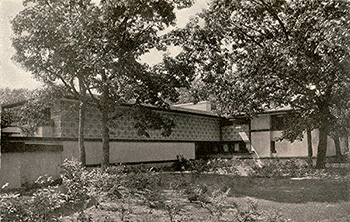
Right: It is interesting to note that
originally there were no windows
perforating the patterned northern wall
of the servant’s wing (left side). Many
windows were later added.
Date: Circa 1914-15 Description: Mrs. Lydia Avery Coonley Ward. The Mother of Wright client Avery Coonley (1907 - S.135) Circa 1914-15. Lydia Avery Coonley was born in Virginia on Jan 31, 1845 to Benjamin Franklin and Susan Look Avery. Lydia Avery Coonley became a writer, publishing many poems. One poem entitled "Indian Summer", was published in the Nov 3, 1894 "The Outlook". She compiled a number of poems and published "Singing Verses for Children". She was also the author of "Under The Pines and Other Verses", published in 1895 by another client of Wright's, Chauncey Williams, of Way & Williams. She also wrote and published "Washington and Lincoln". She was active in the women's movement, and was president of the Chicago Women's Club from 1895-1896. On March 18, 1897, Lydia Avery Coonley, a wealthy Chicago widow, married Naturalist Henry Augustus Ward. Courtesy of the New York Public Library.
Size: Original 3 x 4.25 B&W photograph.
S#: 0124.15.0112
Date: 1921 Description: Mrs. Avery Coonley (1907 - S.135), October 14, 1921. Mrs. Avery Coonley and Miss Mary O. Wallace. This photograph taken one year after her husband, Avery Coonley past away. Queene Ferry Coonley, born Addie Elizabeth Ferry, (1874-1958), was born in Detroit to garden seed magnate Dexter Ferry and his wife Addie. Queene graduated from Vassar College in 1896, married Avery Coonley in 1901. They had one child, Elizabeth Ferry Coonley, born in 1902. Mrs. Avery (Queene Ferry) Coonley, a believer in the early childhood education, attempted to enroll her daughter in Kindergarten. She was denied entrance because her daughter was not yet five. In 1906, Mrs. Coonley formed the Cottage School in Riverside, Illinois, a private independent school. In 1912, Wright designed the Coonley Playhouse to accommodate the growth of the Cottage School. The school continued to grow, and In 1916, moved to a new facility. In addition to her duties at school she was treasurer of the National Women's Party; a trustee of Vassar College and vice president of the Progressive Education Association. Courtesy of the Library of Congress.
Size: Original 7.25 x 10 B&W photograph.
S#: 0144.03.0112
Date: Circa 1923 Title: Avery Coonley Residence (1907 - S.135) circa 1923.
Description: View of Pool and Terrace. Living room is in the center on the second level, the Children's Playroom is on the ground floor. The two planters on either of the three sets of doors leading to the Playroom, originally connected as a single planter, with three sets of windows. Similar view published in "The Life-Work of the American Architect Frank Lloyd Wright" 1925, Page 22.
Size: Original 5 x 7 B&W photograph.
S#: 0156.25.0613
Date: 1923
Title: Avery Coonley Residence Circa 1923 (1907 - S.135).
Description: View of Pool and Terrace. Living room is in the center on the second level, the Children's Playroom is on the ground floor. The two planters on either of the three sets of doors leading to the Playroom, originally connected as a single planter, with three sets of windows. Similar view published in "The Life-Work of the American Architect Frank Lloyd Wright" 1925, Page 22. This print was used by The University Prints. Cambridge, Mass., for publishing "A Special Study Set of Fine Art Reproductions" 1961, plate 81. Acquired from the archives of The University Prints. Cambridge, Mass.
Size: Original 10 x 3.25 B&W photograph.
S#: 0156.62.0118Date: 1923 (1951)
Title: Sixty Years of Living Architecture, Palazzo Strozzi, Florence, 1951.
Description: Display #18: "Coonley House, Riverside, Near Chicago, 1908." Photographed circa 1923. Part of a set of forty B&W photographs by Ancillotti & Co., of the exhibition "Sixty Years of Living Architecture" held in Florence, Italy, 1951. "Sixty Years of Living Architecture: The Work of Frank Lloyd Wright" was a traveling exhibition of Wright's work, consisting of models, large photographs and original drawings. A Preview of the exhibition was held in Philadelphia at Gimbel Brothers Gallery in January, 1951. The world wide tour opened in Palazzo Strozzi Florence, Italy in June, 1951. Ancillotti & Company photographed many of the models and also documented the large photographs that were on display. Published in Sixty Years of Living Architecture: The Work of Frank Lloyd Wright, Moser, 1952, p.14. Also published in The Life-Work of the American Architect Frank Lloyd Wright, 1925, Page 22.
Size: Original 9 x 7.25 B&W photograph.
S#: 0857.51.0221 -5Date: 1950 Description: Mrs. Avery Coonley (1907 - S.135), Circa 1950. Queene Ferry Coonley, born Addie Elizabeth Ferry, (1874-1958), was born in Detroit to garden seed magnate Dexter Ferry and his wife Addie. Queene graduated from Vassar College in 1896, married Avery Coonley in 1901. They had one child, Elizabeth Ferry Coonley, born in 1902. Mrs. Avery (Queene Ferry) Coonley, a believer in the early childhood education, attempted to enroll her daughter in Kindergarten. She was denied entrance because her daughter was not yet five. In 1906, Mrs. Coonley formed the Cottage School in Riverside, Illinois, a private independent school. In 1912, Wright designed the Coonley Playhouse to accommodate the growth of the Cottage School. The school continued to grow, and In 1916, moved to a new facility. In addition to her duties at school she was treasurer of the National Women's Party; a trustee of Vassar College and vice president of the Progressive Education Association. In 1954, Queene Ferry Coonley published "Great thoughts: an anthology of sayings, garnered over the years". She past away in the same year a Wright, 1959. Courtesy of the Avery School.
Size: Original 5 x 5.5 B&W photograph.
S#: 0831.25.0112
Date: Circa 1957
Title: Coonley Residence, Riverside, Illinois. Main Entrance. Circa 1957 (1907 - S.135).
Description: View of the main entrance. The main entrance is through the passageway. Designed by Frank Lloyd Wright in 1907. Mounted to gray board. Label pasted to board: "Arch. U.S.A. 20th cent. Frank Lloyd Wright. Res. Avery Coonley, Riverside, Ill. (1908). Detail, entr. Wayne Andrews #1973. Indiana University, Fine Arts Department." Photographed by Wayne Andrews. Acquired from the archives of the Indiana University.
Size: Original 9.5 x 7.5 B&W Photograph.
S#: 1205.114.0920Date: 1970
Title: Riverside, A Village in a Park (Soft Cover) (Published by The Frederick Laws Olmsted Society of Riverside, Riverside, Illinois)
Author: Heidrich, Robert W.
Description: Pages 30-31: "Formost of Riverside's architectural works is the celebrated Coonley House at Coonley and Bloomingbank Roads. Of stucco and ornamental tile, it was completed in 1908, establishing once and for all Frank Lloyd Wright's supreme virtuosity in residential design. This is one of his Prairie Houses, also known as a Zoned House, with each function of the household in a separate wing. A gardener's cottage and greenhouse were added in 1911. A playhouse in 1912. The Frank Lloyd Wright house at 150 Nuttall Road (Tomek - S.128), built in 1907, is referred to as the Ship House, the porch at one end giving the effect of the brow of a ship and the long bank of windows on the second floor resembling portholes. These two houses are studied by architects and students from all over the world." Includes a groundplan and aerial perspective of the Coonley House, as well as one photograph of Coonley Playhouse. (First Edition)
Size: 5.5 x 8.5
Pages: Unpaginated (Pp 40)
S#: 1846.38.0919Date: 1974 Description: Coonley Residence Main Entrance. (1907 - S.135) 1974. Clipping pasted on verso: "Avery Coonley House. Evanston - Riverside is a lovely place. We've been thru it several times and thoroly (sp) enjoyed Sheldon Mix's story about it ("Perfection, Your Name is Riverside," May 19). But was that the Avery Coonley House you pictured, or was it the playhouse? Mrs. Joseph Standard. Indeed it was the playhouse. Here is a photo of Frank Lloyd Wright's Avery Coonley House, a national landmark. Sorry for he mix-up -- Ed." Stamped on clipping: "Jun 16 1974". Stamped on verso: "Apr 24 1974, J. Austad." Note: Ed still seems to be mixed-up. This is the main approach to the Coonley Residence, not the Playhouse. The Bedroom Wing in on the left, the Guest Room Wing on the right. See Select Houses 1, p170-173. Photographed by J. Austad.
Size: Original 10 x 7 B&W Print.
1963.04.0311
Date: 1977
Title: Coonley Residence Estate, Riverside, Illinois. 1977 (1907 - S.135).
Description: Set of 33 original 35mm slides of the Coonley Residence and Coach House photographed in September 1977. Designed by Frank Lloyd Wright in 1907. "The Coonley house is one of the great masterpiece of all time. In it the architect has been given full reign to produce a work in which every facet came from his own imagination, and produced a unity we rarely see in the world of architecture." Bruce Brooks Pfeiffer, Frank Lloyd Wright Monograph 1907-1913, 1987/1991, p.2. Avery Coonley graduated from Harvard, then took graduate work at M.I.T. He married... Continue...
Size: Set of 33 original 35mm Color slide.
S#: 2033.33.0423 (1-33)
See Aditional photographs...
See Aditional photographs...Date: 1980 Publication: Frank Lloyd Wright: Drawings for the Coonley House
Author: Hasbrouck, Marilyn
Description: Printed in conjunction with an exhibition on Nov 15 - Dec 31, 1980, Prairie Avenue Bookstore. (First Edition)
Pages: 8
1980.03.0902
Date: 1981 Title: Coonley Residence Living Room End Table (1907 - S.135) 1981.
Description: Designed by Frank Lloyd Wright in 1907, a table within a table. Prominently photographed in the Coonley Living Room in 1910, and included in the Wasmuth Portfolio, 1910, Plate LVI. Light oak, 25.75 (H) x 30 (W) x 16 (D). Photographed by Thomas Heinz. Acquired from Kelmscott Galleries.
Size: Two original 8 x 10 B&W photographs.
ST#: 1981.67.0413
Date: 1981 Title: Coonley Residence Living Room End Table (1907 - S.135) 1981.
Description: Designed by Frank Lloyd Wright in 1907, a table within a table. Prominently photographed in the Coonley Living Room in 1910,, and included in the Wasmuth Portfolio, 1910, Plate LVI. Light oak, 25.75 (H) x 30 (W) x 16 (D). This photograph was published in "Frank Lloyd Wright", Kelmscott Galleries, 1981, page 18. Photographed by Quiriconi-Tropea Photographers. Acquired from Kelmscott Galleries.
Size: Two original 8 x 10 B&W photographs and one 4x5 B&W negative.
ST#: 1981.68.0413
Date: 1981 Title: Coonley Residence Print Cabinet (1907 - S.135) 1981.
Description: Designed by Wright in 1907, for the storage of Japanese prints. Six drawers, constructed of birch 27 (H) x 24 (W) x 42 (D). See Important 19th and 20th Century Architectural Objects and Designs, 1990, Lot 501. Acquired from Kelmscott Galleries.
Size: Original 6 x 4 color photograph.
ST#: 1981.69.0413
Date: 1981 Title: Coonley Residence Print Cabinet (1907 - S.135) 1981.
Description: Designed by Wright in 1907, six drawers, constructed of birch. Acquired from Kelmscott Galleries.
Size: Original 3 x 3color photographs.
ST#: 1981.70.0413
Date: 1988
Title: Avery Coonley Residence, Riverside, Illinois, Low-Back Chair 1988 (1907 - S.135).
Description: Three-quarter view of a Avery Coonley low-back chair published in Important Frank Lloyd Wright and American Arts & Crafts Furnishings, Christie’s, June 11, 1988. Designed by Frank Lloyd Wright in 1907-8. Catalog description: “Frank Lloyd Wright. The Avery Coonley Holuse, Riverside, Illinois, Circa 1908. Lot 115A. An Oak Low-back Spindle Side Chair. Designed by Frank Lloyd Wright, Executed under the Direction of Niedecken-Walbridge for the Avery Coonley House, Riverside, Illinois, Circa 1908. The low back with handhold below the crest rail surmounting seven vertical spindles, with drop in seat. 27 1/4 Inch high.” Note: There is a Coonley low-back (dressing table chair) published in Frank Lloyd Wright, The Seat of Genius, 1997, p.37. There is also a Coonley chair published in The Arts & Crafts Price Guide Furniture, 1998, p.128. Courtesy of Christie’s, New York.
See Additional Wright Designed Chairs
Size: Copy 8 x 9.75 Color photograph.
ST#: 1988.142.1223Date: 1989
Title: Avery Coonley Residence, Riverside, Illinois, Chair (1912 - S.174).
Description: Low back chair designed by Frank Lloyd Wright in 1907. Executed by Cassina in 1989. Low back with handhold below the crest rail. There is a space at the base of the back of the chair that mirrors the Handhold at the top. Eight shorter spindles run parallel to a long and larger spindle on either side. Horizontal trim runs along the base of the seat and runs along the front, sides and back. Like the crest tail that curves out at the top, the base of the legs curve outward also. Forward in the front, backwards in the back. Constructed on natural cherry, lacquered. Fabric is cobalt blue.
Cassina: 609 Coonley, 1. Booklet Description: "Dining Chair, Coonley House, Scottswood, Riverside, Illinois, 1907. The Avery Coonley house, Riverside, Illinois, 1907, was one of the best executed and most completely detailed of all Wright's residential work. Every element throughout the house came directly from his designs, including the overall architectural concepts and the individual features of furniture and decorative objects. The slat-back chair traces its roots to the very beginning of his work, in his own home at Oak Park, through the Dana, Husser, Clark, Little, Willits and other houses. In each instance he would make a modification specifically for each particular client. In the case of the Coonley house, he modified the height of the chair to give contrast when placed in conjunction with the taller, more formal ones usually associated with his early dining sets."
This chair may have been designed as a chair for the Dressing Table in Bedroom #1. In the Frank Lloyd Wright Foundation Archives, Avery Library, there is a drawing for a dressing table and chair, FLLW #0803.51. This chair matches the drawing.
There is a matching chair in a photograph from 1911, Wright's Home and Studio (S#0104.15). In a bedroom for Wright's daughter Catherine... See additional photographs... See additional Wright Chairs...
Size: height (h): 27.5" (70 cm), seat height: 18.1" (46 cm), width (w): 16.9" (43 cm), depth (d): 18.5" (47 cm).
ST#: 1989.132.0223Date: 1989
Title: Cassina: 609 Coonley, 1 (Published by Cassina, Italy)
Author: Cassina
Description: Descriptive booklet for Avery Coonley low back chair.
Booklet Description: "Dining Chair, Coonley House, Scottswood, Riverside, Illinois, 1907. The Avery Coonley house, Riverside, Illinois, 1907, was one of the best executed and most completely detailed of all Wright's residential work. Every element throughout the house came directly from his designs, including the overall architectural concepts and the individual features of furniture and decorative objects. The slat-back chair traces its roots to the very beginning of his work, in his own home at Oak Park, through the Dana, Husser, Clark, Little, Willits and other houses. In each instance he would make a modification specifically for each particular client. In the case of the Coonley house, he modified the height of the chair to give contrast when placed in conjunction with the taller, more formal ones usually associated with his early dining sets." Booklet in plastic pouch: No. 02562.
Size: 2.75 x 7
Pages: Pp 8
ST#: 1989.133.0223Date: 1990
Title: 1) Avery Coonley Residence, Riverside, Illinois, Circa 1990 (Not Dated) (1907 - S.135).
Description: Set of five 35mm color slides of the Avery Coonley Residence. View of the Avery Coonley House from the West. The living space is on the second level. The dining room is on the left, the living room is in the center, and the bedroom wings are to the right. The children’s playroom is in the center on the lower level. Designed by Frank Lloyd Wright in 1907. Photographer unknown.
Text on sleeve: “Wright, Frank Lloyd. AC 398. Avery Coonley House. Ext. 1908. Riverside, IL." Acquired from the Holy Cross archives.
Size: Original 35mm slide, sandwiched between glass, plastic mount.
ST#: 1990.200.0425-1Date: 1990
Title: 2) Avery Coonley Residence, Riverside, Illinois, Circa 1990 (Not Dated) (1907 - S.135).
Description: Set of five 35mm color slides of the Avery Coonley Residence. View of the Avery Coonley House Living Room. The living space is on the second level. The children’s playroom is in the center on the lower level. Designed by Frank Lloyd Wright in 1907. Photographer unknown.
Text on sleeve: “Wright, Frank Lloyd. AC 400. Avery Coonley House. Int. 1908. Riverside, IL." Acquired from the Holy Cross archives.
Size: Original 35mm slide, sandwiched between glass, plastic mount.
ST#: 1990.200.0425-2Date: 1990
Title: 3) Avery Coonley Residence, Riverside, Illinois, Circa 1990 (Not Dated) (1907 - S.135).
Description: Set of five 35mm color slides of the Avery Coonley Residence. View of the Avery Coonley House Living Room. The living space is on the second level. The children’s playroom is in the center on the lower level. Designed by Frank Lloyd Wright in 1907. Photographer unknown.
Text on sleeve: “Mod: Arch: Am: Wright, FL: Riverside, IL Res: Coonley Averey House: Int. Living Room. 1912. 040791." Stamped on sleeve: “Holly Cross.” Acquired from the Holy Cross archives.
Size: Original 35mm slide, sandwiched between glass, plastic mount.
ST#: 1990.200.0425-3Date: 1990
Title: 4) Avery Coonley Residence, Riverside, Illinois, Circa 1990 (Not Dated) (1907 - S.135).
Description: Set of five 35mm color slides of the Avery Coonley Residence. View of the Avery Coonley House Living Room. The living space is on the second level. The children’s playroom is in the center on the lower level. Designed by Frank Lloyd Wright in 1907. Photographer unknown.
Text on sleeve: “Wright, Frank Lloyd. AC 399. Avery Coonley House. Int. 1908. Riverside, IL." Acquired from the Holy Cross archives.
Size: Original 35mm slide, sandwiched between glass, plastic mount.
ST#: 1990.200.0425-4Date: 1990
Title: 5) Avery Coonley Residence, Riverside, Illinois, Circa 1990 (Not Dated) (1907 - S.135).
Description: Set of five 35mm color slides of the Avery Coonley Residence. View of the Avery Coonley House Living Room. The living space is on the second level. The children’s playroom is in the center on the lower level. Designed by Frank Lloyd Wright in 1907. Photographer unknown.
Text on sleeve: “Mod: Arch: Am: Wright, FL: Riverside, IL Res: Coonley Averey House: Int. 1912. Living Room. 002923." Stamped on sleeve: “Holly Cross.” Acquired from the Holy Cross archives.
Size: Original 35mm slide, sandwiched between glass, plastic mount.
ST#: 1990.200.0425-5Date: 1990 Description: Coonley Print Cabinet. Birch Print Cabinet designed by Frank Lloyd Wright (1908) for the Avery Coonley Residence (S.135 - 1907). Three-quarter view. Stamped on verso: "Apr 11 Ć‹Å“90". Label on verso: "Curly Birch Print Cabinet, designed by Frank Lloyd Wright, for the Coonely (sp) estate estate, Riverside, Illinois, 1908. $250,000 / 300,000." Caption pasted on verso: "A curly birch print cabinet, designed in 1908 by Frank Lloyd Wright for the Coonley estate in Riverside has a pre-sale estimate of $250,000 to 300,000." Acquired from the archives of the Associated Press.
Size: Original 7 x 5 B&W photograph.
ST#: 1990.80.1110
Date: 1992
Title: Avery Coonley Residence, Riverside, Illinois, Art Glass Reproduction 1992 (1907 - S.135).
Description: Andersen Prairie Rhythm Art Glass reproduction of the Avery Coonley window. "Four patterns adapted from windows Wright himself designed make up the Frank Lloyd Wright Series in the Art Glass Collection. Each remains true to the principles that governed Wright's original work. Simplicity, unity and nature. Two of the designs in this series revive art glass windows from Prairie Style homes designed by Wright. The third is from a home Wright designed to be constructed of patterned concrete blocks, while the fourth is an adaptation of windows created for Unity Temple..."¯
"Prairie Rhythm: The repeated use of rectangles and squares is evident in this art glass design inspired by the windows created for the Avery Coonley Home. Wright himself believed this residence represented his best work in Prairie Style architecture."¯
This window is the top half of vertical window "C15" or "C155", and is made up of 101 pieces of frosted white, green glazed and clear glass pieces. Manufactured by Andersen Corporation.
Size: 19.6" Wide x 26.6" Tall
ST#: 1992.157.0523Date: 1993 Description: Avery Coonley Teapot & Two Cups, Art Institute of Chicago
1993.17.0800
Date: 2009
Title: The Gardener’s Cottage In Riverside, Illinois. Living in a “Small Masterpiece” by Frank Lloyd Wright, Jens Jensen, and Frederick Law Olmsted (Hard Cover DJ) (Published by The Center For American Places, At Columbia College, Chicago)
Author: Maloney, Cathy Jean
Description: Dust Jacket: Riverside, Illinois, heralded and admired for its innovative suburban plan, was designed in 1869 by renowned landscape architect Frederick Law Olmsted and his professional partner, architect Calvert Vaux. Their unique plan, which showcased the contours of the land and emphasized building setbacks with sidewalks, curvilinear streets, and open spaces, remains a model today for landscape historians and New Urbanists alike. No wonder thousands of people visit Riverside each year.
Riverside also inspired the greatest designers of the time to undertake projects there, among them the Avery Coonley estate, a rare joint effort by architect Frank Lloyd Wright and landscape architect Jens Jensen that is now a National Historic Landmark. An integral part of the estate is the single-family residence known as the Gardener's Cottage, a small but unassuming masterpiece built for the estate's gardener and his wife. The cottage not only matches Wright's architectural aesthetic for the estate, but its stunning gardens inspired by Jensen reflect the overall emphasis by Olmsted and Vaux on integrating nature into the suburban landscape... (First Edition)
Size: 7.25 x 9.25
Pages: Pp 109
ST#: 2009.68.1024Date: 2014 Title: Coonley House Drawings (Soft Cover, Wire Bound) (Published by John Randal Publishing and Wilkerson & Hughes, LLC. Regina, SK, Canada, Altoona, Florida)
Author: John Randal Publishing; Wilkerson & Hughes
Description: The Coonley house was designed by Frank Lloyd Wright in the early 20th century. It is located in Riverside, IL near Chicago. This is considered an important example of Prairie Home designs by Frank Lloyd Wright. This book is entirely composed of measured drawings conducted by the American Historical Building Survey. The original drawings were scanned and reduced to a full size book format. The pages contain high resolution black line drawings on Cream color paper. Original list price $6.95. (First Edition)
Size: 8.5 x 11
Pages: Pp 17
ST#: 2014.15.1014
Date: 2012
Title: Frank Lloyd Wright's Coonley House. Story of a Masterpiece (Soft Cover) (Published by Dean Eastman, Coonley House, Riverside, Illinois)
Author: Eastman, Dean
Description: This book is a story of the creation of the Coonley House estate, its evolution over a century, and its recent restoration. Based on his comments in his Autobiography this house is often regarded as Wright's finest Prairie house and is considered to be one of the terminal masterpieces of his Prairie period.
The book includes a chapter which describes the lives of Queene Ferry Coonley and Avery Coonley and their client-architect relationship formed during and after the building of the Coonley House. An extensive chapter describes Wright's design of the Coonley House estate, which evolved through a series of site plans and building alterations, and includes Wright's and Jensen's landscape plans.
Five chapters describe extensive exterior and interior tours of the estate in the Coonley era (1907-1917), mid-century period (1940s and 1950s), and the current era (2000-2014) with historic images and colored images in the current era. Original list price $27.00.
Size: 8.5 x 11
Pages: Pp 242
ST#: 2012.37.1023Date: 2018
Title: Avery Coonley Residence, Riverside, Illinois, 2018 (1907 - S.135) (FLLW #0803).
Description: Set of 135 exterior photographs of the Coonley Residence. On a trip through the Midwest, we had the opportunity to visit and photograph the Coonley Residence. Designed by Frank Lloyd Wright in 1907.
Avery Coonley was born in 1870, graduated from Harvard, then took graduate work at M.I.T. He married Queene Ferry of Detroit, Michigan in1901. A businessman and industrialist, he was very active in a number of businesses. Manufacturing, publishing, merchandising, real estate and live stock to name a few. He was a director of "The Dial Co.", owned by another of Wright's clients... Continue...
Size: Original 23 X 15 high res digital images.
ST#: 2018.60.0325 (1-135)
See Additional Photographs...
See Additional Photographs...
See Additional Photographs...Date: 2018
Title: Avery Coonley Coach House, Riverside, Illinois, 2018 (1911 - S.137) (FLLW #1103).
Description: Set of 47 exterior photographs of the Coonley Stable and Carriage House. On a trip through the Midwest, we had the opportunity to visit and photograph the Avery Coonley Estate which included the Coach House, Stable and Carriage House and the Gardener’s Cottage. Designed by Frank Lloyd Wright in 1911. The Coach House, originally called the Stable, and the Gardener’s Cottage were independent buildings, but designed as a unit and connected by the roof.
In 1910 when Frank Lloyd Wright published the... Continue...
Size: Original 23 X 15 high res digital images.
ST#: 2018.62.0625 (1-47)
See Additional Photographs...
See Additional Photographs...Date: 2018
Title: Avery Coonley Gardener’s Cottage, Riverside, Illinois, 2018 (1911 - S.136) (FLLW #1103).
Description: Set of 26 exterior photographs of the Coonley Gardener’s Cottage. On a trip through the Midwest, we had the opportunity to visit and photograph the Coonley estate which included the Gardener’s Cottage. Designed by Frank Lloyd Wright in 1911.
October 7 was cool, overcast, raining, but very green and the vegetation lush. The Coonley estate covered a whole city block which was comprised of nine lots covering about 5 acres. The whole block was purchased by the Coonley’s in 1906. By 1912 they had purchased... Continue...
Size: Original 23 X 15 high res digital images.
ST#: 2018.61.0425 (1-26)
See Additional Photographs...
See Additional Photographs...Date: 2019
Title: Avery Coonley Residence, Riverside, Illinois, Dining Room, 2019 (1907 - S.135 ).
Description: View of the restored dining room from the East. On the exterior side of the windows on the right, a built-in flower box ran the full length of the exterior wall. Many of the windows in the residence came in pairs with the design facing each other creating a symmetry, mirroring the design in each window. In many of Wright’s designs, windows and doors opened outward. This created an issue with exterior flower boxes. Opening outward would interfere with plantings. Wright devised a plan for windows adjacent to exterior flower boxes. The dining room window is a perfect example. He added a windows below the pair. The lower window is stationary and continued the glass design from above. This allowed the upper pair to open outward without disturbing the contents of the flower box. These were prominent in the dining room as well as others windows that were adjacent to exterior built-in flower boxes.
Besides the dining room , we were able to locate other locations. The East end of the Servants wing, the Dining Room, and the Master Bedroom. There was a flower box on the West end of the master bedroom dressing room, and the three window set may have been placed there. Courtesy of the VHT Studios. See Additional Details...
Size: 10 x 7 Color photograph.
ST#: 2019.77.0525Date: 2023
Title: Avery Coonley Coach House, Riverside, Illinois, 2023 (1911 - S.137) (FLLW #1103).
Description: Set of 29 exterior photographs of the Coonley Stable and Carriage House. On a trip through the Midwest, we had the opportunity to visit and photograph the Avery Coonley Estate which included the Coach House, Stable and Carriage House and the Gardener’s Cottage. Designed by Frank Lloyd Wright in 1911. The Coach House, originally called the Stable, and the Gardener’s Cottage were independent buildings, but designed as a unit and connected by the roof.
Ausgefuhrte Bauten, Plate 57 illustrates the ground...Continue...
Size: Original 23 X 15 high res digital images.
ST#: 2023.38.0625 (1-29)
See Additional Photographs...
See Additional Photographs...AVERY COONLEY RESIDENCE SITE PLANS (1907) SITE PLAN 1 (803.18) SITE PLAN 2 (803.19) SITE PLAN 3 (803.20) SITE PLAN 4 (803.21)
1) COONLEY SITE PLAN - 803.18 (1907) 1) Avery Coonley Residence, Riverside, Illinois, Site Plan, 1907 (FLLW #0803.18) (1907 - S.135).
Site plan for the Avery Coonley Residence and estate. Designed by Frank Lloyd Wright in 1907. According to Dean Eastman, the block that the Coonley Residence was built on, was a tract of land comprised nine lots which covered about 5 acres. The whole block was purchased by the Coonley’s in 1906. By 1912 they had purchased an additional nine adjacent lots which brought the total area to about 10 acres. Frank Lloyd Wright’s Coonley House, 2012, p.40-42. The plan covered the entire block and included the residence and pool, stable, gardener’s cottage and gardens. The driveway extends the full width of the block. On either side of the guest wing the drive branches toward the stable. The North side drives through the stable and the South side drives between the stable and the Gardener’s Cottage. It is interesting to note that the landscaping plan extend North between the river and Bloomingbank Road. Not only does the landscaping extend, but so does the walkway. As you follow the sidewalk from the house to Bloomingbank Road, just before you reach the street as you walk North, the sidewalk splits, and extends all the way to the river bank. There appears to be a small structure and a dock. On the South side of the property, a pergola extends from the gardener’s cottage to two tennis courts on the West end of the property.
Text top right: “Mr. Avery Coonley Dwelling, Riverside, Illinois. Frank Lloyd Wright Architect. Oak Park, Illinois.” Hand written lower left: “0803.18.” (S#0080.72.0425)1B) Detail of the Avery Coonley Residence, Riverside, Illinois, Site Plan, 1907 (FLLW #0803.18) (1907 - S.135). Site plan for the Avery Coonley Residence and estate. 1C) Detail of the Avery Coonley Residence, Riverside, Illinois, Site Plan, 1907 (FLLW #0803.18) (1907 - S.135). Site plan for the Avery Coonley Residence and estate. 1D) Detail of the Avery Coonley Residence, Riverside, Illinois, Site Plan, 1907 (FLLW #0803.18) (1907 - S.135). Site plan for the Avery Coonley Residence and estate. 1E) Detail of the Avery Coonley Residence, Riverside, Illinois, Site Plan, 1907 (FLLW #0803.18) (1907 - S.135). Site plan for the Avery Coonley Residence and estate. 2) COONLEY SITE PLAN - 803.19 (1907) 2) Avery Coonley Residence, Riverside, Illinois, Site Plan, 1907 (FLLW #0803.19) (1907 - S.135).
Site plan for the Avery Coonley Residence and estate. Designed by Frank Lloyd Wright in 1907. According to Dean Eastman, the block that the Coonley Residence was built on, was a tract of land comprised nine lots which covered about 5 acres. The whole block was purchased by the Coonley’s in 1906. By 1912 they had purchased an additional nine adjacent lots which brought the total area to about 10 acres. Frank Lloyd Wright’s Coonley House, 2012, p.40-42. The plan covered the entire block and included the residence and pool, stable, gardener’s cottage and gardens. It is interesting to note that the landscaping plan extend North between the river and Bloomingbank Road. Not only does the landscaping extend, but so does the walkway. As you follow the sidewalk from the house to Bloomingbank Road, just before you reach the street as you walk North, the sidewalk splits, and extends all the way to the river bank. There appears to be a small structure and a dock. On the South side of the property, a walkway extends from the gardener’s cottage to two tennis courts and a structure on the West end of the property.
Text top right: “Mr. Avery Coonley Dwelling, Riverside, Illinois. Frank Lloyd Wright Architect. Oak Park, Illinois.” Hand written lower left: “0803.19.” (S#0080.73.0425)2B) Detail of the Avery Coonley Residence, Riverside, Illinois, Site Plan, 1907 (FLLW #0803.19) (1907 - S.135). Site plan for the Avery Coonley Residence and estate. 2C) Detail of the Avery Coonley Residence, Riverside, Illinois, Site Plan, 1907 (FLLW #0803.19) (1907 - S.135). Site plan for the Avery Coonley Residence and estate. 2D) Detail of the Avery Coonley Residence, Riverside, Illinois, Site Plan, 1907 (FLLW #0803.19) (1907 - S.135). Site plan for the Avery Coonley Residence and estate. 2E) Detail of the Avery Coonley Residence, Riverside, Illinois, Site Plan, 1907 (FLLW #0803.19) (1907 - S.135). Site plan for the Avery Coonley Residence and estate. 2F) Detail of the Avery Coonley Residence, Riverside, Illinois, Site Plan, 1907 (FLLW #0803.19) (1907 - S.135). Site plan for the Avery Coonley Residence and estate. 3) COONLEY SITE PLAN - 803.20 (1907) 3) Avery Coonley Residence, Riverside, Illinois, Site Plan, 1907 (FLLW #0803.20) (1907 - S.135 ).
Site plan for the Avery Coonley Residence and estate. Designed by Frank Lloyd Wright in 1907. According to Dean Eastman, the block that the Coonley Residence was built on, was a tract of land comprised nine lots which covered about 5 acres. The whole block was purchased by the Coonley’s in 1906. By 1912 they had purchased an additional nine adjacent lots which brought the total area to about 10 acres. Frank Lloyd Wright’s Coonley House, 2012, p.40-42. The plan covered the entire block and included the residence and pool, stable, gardener’s cottage and gardens. The driveway extends the full width of the block. On either side of the guest wing the drive branches toward the stable. The North side drives through the stable and the South side drives between the stable and the Gardener’s Cottage. On the South side of the property, a pergola extends from the gardener’s cottage to two tennis courts on the West end of the property. It is interesting to note that on the north end of the property there was an “old House” located on the proiperty.
Text bottom right: “Mr. And Mrs. Avery Coonley, Riverside, Illinois. Plot of Grounds. Frank Lloyd Wright Architect. Oak Park, Illinois.” Hand written lower left: “0803.20.” (S#0080.74.0425)3B) Detail of the Avery Coonley Residence, Riverside, Illinois, Site Plan, 1907 (FLLW #0803.20) (1907 - S.135 ). Site plan for the Avery Coonley Residence and estate. 3C) Detail of the Avery Coonley Residence, Riverside, Illinois, Site Plan, 1907 (FLLW #0803.20) (1907 - S.135 ). Site plan for the Avery Coonley Residence and estate. 4) COONLEY SITE PLAN - 803.21 (1907) 4) Avery Coonley Residence, Riverside, Illinois, Site Plan, 1907 (FLLW #0803.21) (1907 - S.135).
Site plan for the Avery Coonley Residence and estate. Designed by Frank Lloyd Wright in 1907. According to Dean Eastman, the block that the Coonley Residence was built on, was a tract of land comprised nine lots which covered about 5 acres. The whole block was purchased by the Coonley’s in 1906. By 1912 they had purchased an additional nine adjacent lots which brought the total area to about 10 acres. Frank Lloyd Wright’s Coonley House, 2012, p.40-42. The plan covered the entire block and included the residence and pool, stable, gardener’s cottage and gardens. The driveway extends the full width of the block. On either side of the guest wing the drive branches toward the stable. The North side drives through the stable and the South side drives between the stable and the Gardener’s Cottage. It is interesting to note that the landscaping plan extend North between the river and Bloomingbank Road. Not only does the landscaping extend, but so does the walkway. As you follow the sidewalk from the house to Bloomingbank Road, just before you reach the street as you walk North, the sidewalk splits, and extends all the way to the river bank. There appears to be a small structure and a dock. On the South side of the property, a pergola extends from the gardener’s cottage to two tennis courts on the West end of the property. (S#0080.75.0425)4B) Detail of the Avery Coonley Residence, Riverside, Illinois, Site Plan, 1907 (FLLW #0803.21) (1907 - S.135). Site plan for the Avery Coonley Residence and estate. 4C) Detail of the Avery Coonley Residence, Riverside, Illinois, Site Plan, 1907 (FLLW #0803.21) (1907 - S.135). Site plan for the Avery Coonley Residence and estate. 4D) Detail of the Avery Coonley Residence, Riverside, Illinois, Site Plan, 1907 (FLLW #0803.21) (1907 - S.135). Site plan for the Avery Coonley Residence and estate. AVERY COONLEY RESIDENCE FLOOR PLANS (1907) AVERY COONLEY RESIDENCE FLOOR PLAN (1910)
Ausgeführte Bauten und Entwurfe von Frank Lloyd Wright. View of the Entrance Alcove, Ground and Floor Plan. Plate LVIa (56a) (Published by Ernst Wasmuth A.-G., Berlin)
Plate LVIa (56a). "Ground plan and view of entrance alcove, the Coonley house. Dwelling for Mr. and Mrs. Avery Coonley . Inner perspective of entrance alcove of living-room, and plan showing disposition of furniture." The left side includes the Plan for the Ground Floor (top left) and the Main Floor Plan (bottom left). The Entrance Alcove with stairwell and skylight is illustrated on the right. The Wright designed Copper Urn is prominently featured. The "Wasmuth Portfolio" (2 folio volumes, 100 plates) is considered the most important and influential architectural monograph of the 20th century. 1000 sets were printed, with 500 set aside for American distribution. According to Wright, most of the American sets were destroyed or water damaged in the Taliesin fire of 1914. This print has minor water damage along the bottom border from that fire. Wright's embossed square logo with his name is in the top left corner. There are only a few interior views. Three copies, one plate is part of a nearly complete two volume set acquired from Bruxelles, Belgium. (First Edition) (Sweeney 87) (S#0087.56.0618a, 0087.56.1018a, 0087.56.1022a)Detail of the Ausgeführte Bauten und Entwurfe von Frank Lloyd Wright. View of the Entrance Alcove,
Ground and Floor Plan. Plate LVIa (56a)
Avery Coonley Residence, Riverside, Illinois, Adaptation from Ausgeführte Bauten First Floor Plan. Plate LVIa (56a), 1910/2025 (1907 - S.135).
Adaptation of the first floor plan of the Coonley Residence published in the Ausgeführte Bauten und Entwurfe von Frank Lloyd Wright, 1910. What Wright labeled on the Coonley plans as the “Basement” was actually the ground floor. The drive began at Bloomingbank Road, past the full length of the house, which is 180 feet long, and exited onto Scottswood Road. It flowed under two wings, the servants quarters, and the guest wing. The space under the two wings form porte cocheres. The main entrance is under the first wing and leads to the entrance hall on the ground floor. Stairs leading to the first floor, the living space is on the left. Past the stairs on the ground level is the playroom, which is directly below the living room. An addition, just past the first wing was built on the drive, now forming a courtyard.
The upper level, the first floor is the living space: living and dining rooms, kitchen, bedrooms, guest rooms and servants quarters. The concept, the living space on the second level is similar to the Robie House designed only one year earlier, in 1906. Adaptation by Douglas M. Steiner, 2025. (S#0094.116.0425)AVERY COONLEY CASEMENT DINING ROOM WINDOWS (1908)
Avery Coonley Residence , Riverside, Illinois, Pair of Dining Room Leaded Art Glass Casement Windows, 1908 (1907 - S.135). A pair of art glass casement windows from the Avery Coonley Residence Dining Room. Designed by Frank Lloyd Wright in 1907. Wright created a different window design for all four Coonley buildings: Residence, Carriage House, Gardener’s Cottage and the Playhouse. For some buildings, there were multiple designs.
We were able to identify three separate window designs for the Avery Coonley Residence. A: Main window design for the residence and it’s variations. These were dominated by larger opaque squares set in a vertical rows. B: A lower window which was placed below a pair of windows. C: The third design was for the hall skylight.
Numerous variations of the main design (A) for the Coonley residence are visible throughout the house. This particular pair of windows seemed to coincide with “B”, a lower window which was placed below a pair of windows creating a three window set. One of the original plans in the Avery Library is of this pair of windows along with the third, illustrating the three window set, (FLLW #0803.60).
Many of the windows in the residence came in pairs with the design facing each other creating a symmetry, mirroring the design in each window. In many of Wright’s designs, windows and doors opened outward. This created an issue with exterior flower boxes. Opening outward would interfere with plantings. Wright devised a plan for windows adjacent to exterior flower boxes. He added a windows below the pair. The lower window was stationary and continued the glass design from above. This allowed the upper pair to open outward without disturbing the contents of the flower box. These were prominent in the dining room as well as others windows that were adjacent to exterior built-in flower boxes.
On the original plans in the Avery Library at Columbia
University, besides the dining room, they appear in the master bedroom and dressing room, the east end of the guest and servant’s wing.
David Hanks writes, “These windows, which stress verticality by isolating the abstract pattern from the clear glass, were designed for the dining room of the Coonley house... The sense of geometry that they convey was carried through the entire architectural scheme, exterior as well as interior. The windows relate to the polychrome tiles used on the exterior facade and also to the exterior lighting fixtures. Inside, Wright used variations of these squares and rectangles in the patterns on the rugs and on some of the upholstery. This particular window design and two others were illustrated in Ausgefürhte Bauten und Entwürfe.” Frank Lloyd Wright. Preserving an Architectural Heritage, 1989, p.69. Published on page 69.
This pair of windows was published in a number of the Domino’s Pizza Collection Calendars, 1988, 1990, 1991 and 1993. Also published in Christie’s Important Works by Frank Lloyd Wright, June 12, 1993, p.66-67. Lot 100, price realized $20,700.
Provenance: Avery Coonley House, Riverside, Illinois. | Thomas S. Monaghan, Domino's Private Collection. | Christie's, New York, Important Works by Frank Lloyd Wright and His Contemporaries from Domino's Center for Architecture and Design, 12 June 1993, Lot 100. | Important Private Collection.
Exhibited: Frank Lloyd Wright: Preserving an Architectural Heritage, Decorative Designs from the Domino's Pizza Collection, 1989-1992 (travelling exhibition).
Acquired from Toomey & Company, Chicago. Two windows. Zinc cames are 7/16" and 3/16" wide and outer zinc frame is 9/16" wide. Each window is composed of 76 pieces of clear, opalescent and iridized glass. Iridized has a greenish tint and a hint of gold. Frame is constructed of painted wood. Glass windows including zinc frame: 14.5" Wide x 30" High each. Wood window frames: 18.25 x 34.75. Total size: 40.875 Wide x 37.75 High.1) TYPICAL WINDOW PLAN (1907) 2) TYPICAL 3-SET WINDOW PLAN (1907) ORIGINAL COONLEY WINDOWS (1908)
1) TYPICAL WINDOW DESIGN PLAN (1907) 1) Avery Coonley Residence, Riverside, Illinois, Typical Window Plan, 1907 (FLLW #0803.59) (1907 - S.135 ). Typical window design plan for the Avery Coonley Residence. Designed in 1907 by Frank Lloyd Wright. Many of the windows in the residence came in pairs with the design facing each other creating a symmetry, mirroring the design in each window.
Text hand-written on the right: “Typical Window Design. Mr. Avery Coonley.” Hand written lower left: “0803.59.” (S#0080.77.0525)1B) Detail of the Avery Coonley Residence, Riverside, Illinois, Typical Window Plan, 1907 (FLLW #0803.59) (1907 - S.135 ). 2) TYPICAL 3-SET WINDOW PLAN (1907) 2) Avery Coonley Residence, Riverside, Illinois, Window Design Plan, 1907 (FLLW #0803.60) (1907 - S.135 ). Typical window plan for a three window set for the Avery Coonley Residence. Designed in 1907 by Frank Lloyd Wright. Many of the windows in the residence came in pairs with the design facing each other creating a symmetry, mirroring the design in each window. In many of Wright’s designs, windows and doors opened outward. This created an issue with exterior flower boxes. Opening outward would interfere with plantings. Wright devised a plan for windows adjacent to exterior flower boxes. He added a windows below the pair. The lower window was stationary and continued the glass design from above. This allowed the upper pair to open outward without disturbing the contents of the flower box. These were prominent in the dining room as well as others windows that were adjacent to exterior built-in flower boxes.
Text hand-written on the right: “Coonley Plans. FLLW. 1907.” Hand written lower left: “0803.60.” (S#0080.78.0525)2B) Detail of the Avery Coonley Residence, Riverside, Illinois, Window Design Plan, 1907 (FLLW #0803.60) (1907 - S.135 ). ORIGINAL COONLEY DINING ROOM
WINDOWS (1908)
Avery Coonley Residence , Riverside, Illinois, Pair of Original Dining Room Leaded Art Glass Casement Windows, 1908 (1907 - S.135).
A pair of original art glass casement windows from the Avery Coonley Residence Dining Room. Designed by Frank Lloyd Wright in 1907. Wright created a different window design for all four Coonley buildings: Residence, Carriage House, Gardener’s Cottage and the Playhouse. For some buildings, there were multiple designs.
We were able to identify three separate window designs for the Avery Coonley Residence. A: Main window design for the residence and it’s variations. These were dominated by larger opaque squares set in a vertical rows. B: A lower window which was placed below a pair of windows. C: The third design was for the hall skylight.
Numerous variations of the main design (A) for the Coonley residence are visible throughout the house. This particular pair of windows seemed to coincide with “B”, a lower window which was placed below a pair of windows creating a three window set. One of the original plans in the Avery Library is of this pair of windows along with the third, illustrating the three window set, (FLLW #0803.60).
Many of the windows in the residence came in pairs with the design facing each other creating a symmetry, mirroring the design in each window. In many of Wright’s designs, windows and doors opened outward. This created an issue with exterior flower boxes. (S#0085.64.0325 : 1-2)2) Detail of the Avery Coonley Residence , Riverside, Illinois, Original Dining Room Pair of Leaded Art Glass Casement Windows, 1908 (1907 - S.135). 3) Detail of the Avery Coonley Residence , Riverside, Illinois, Original Dining Room Pair of Leaded Art Glass Casement Windows, 1908 (1907 - S.135). 4) Detail of the Avery Coonley Residence , Riverside, Illinois, Original Dining Room Pair of Leaded Art Glass Casement Windows, 1908 (1907 - S.135). 5) Detail of the Avery Coonley Residence , Riverside, Illinois, Original Dining Room Pair of Leaded Art Glass Casement Windows, 1908 (1907 - S.135). AVERY COONLEY WINDOWS (1908)
Avery Coonley Residence, WindowsDR1908 Riverside, Illinois, Leaded Art Glass Windows, 1908 (1907 - S.135). Two original windows from the Avery Coonley Residence. Designed by Frank Lloyd Wright in 1907. Wright created a different window design for all four Coonley buildings: Residence, Carriage House, Gardener’s Cottage and the Playhouse. For some buildings, there were multiple designs.
We were able to identify three separate window designs for the Avery Coonley Residence. A: Main window design for the residence and it’s variations. These were dominated by larger opaque squares set in a vertical rows. B: A lower windows which was placed below a pair of windows. C: The third design was for the hall skylight.
Lower windows. These were prominent in the dining roomas well as others windows that were adjacent to exterior built-in flower boxes. The lower window is stationary, allowing the upper pair to open outward without disturbing the contents of the flower box. The lower window design coordinates with the pair of windows above.
On the original plans in the Avery Library at Columbia University, besides the dining room, they appear in the master bedroom and dressing room, the east end of the guest and servant’s wing.
Acquired from Toomey & Company, Chicago. Two original windows. Cames are 7/16" and 3/16" wide. The outer frame is 9/16" wide. Each window is made up of 12 pieces of clear glass. Two windows: 11.25 High x 44.5 Wide x .5 Deep.1) TYPICAL WINDOW PLAN (1907) 2) TYPICAL 3-SET WINDOW PLAN (1907) 3) ELEVATION PLANS (1907)
ORIGINAL COONLEY WINDOWS (1908) HABS WINDOW PLANS (1911/2001) COONLEY DINING ROOM 2019
1) TYPICAL WINDOW DESIGN PLAN (1907) 1) Avery Coonley Residence, Riverside, Illinois, Typical Window Plan, 1907 (FLLW #0803.59) (1907 - S.135 ). Typical window design plan for the Avery Coonley Residence. Designed in 1907 by Frank Lloyd Wright. Many of the windows in the residence came in pairs with the design facing each other creating a symmetry, mirroring the design in each window.
Text hand-written on the right: “Typical Window Design. Mr. Avery Coonley.” Hand written lower left: “0803.59.” (S#0080.77.0525)1B) Detail of the Avery Coonley Residence, Riverside, Illinois, Typical Window Plan, 1907 (FLLW #0803.59) (1907 - S.135 ). 2) TYPICAL 3-SET WINDOW PLAN (1907) 2) Avery Coonley Residence, Riverside, Illinois, Window Design Plan, 1907 (FLLW #0803.60) (1907 - S.135 ). Typical window plan for a three window set for the Avery Coonley Residence. Designed in 1907 by Frank Lloyd Wright. Many of the windows in the residence came in pairs with the design facing each other creating a symmetry, mirroring the design in each window. In many of Wright’s designs, windows and doors opened outward. This created an issue with exterior flower boxes. Opening outward would interfere with plantings. Wright devised a plan for windows adjacent to exterior flower boxes. He added a windows below the pair. The lower window was stationary and continued the glass design from above. This allowed the upper pair to open outward without disturbing the contents of the flower box. These were prominent in the dining room as well as others windows that were adjacent to exterior built-in flower boxes.
Text hand-written on the right: “Coonley Plans. FLLW. 1907.” Hand written lower left: “0803.60.” (S#0080.78.0525)2B) Detail of the Avery Coonley Residence, Riverside, Illinois, Window Design Plan, 1907 (FLLW #0803.60) (1907 - S.135 ). 3) ELEVATION PLANS (1907) 3) Avery Coonley Residence, Riverside, Illinois, Elevations, 1907 (FLLW #0803.86) (1907 - S.135 ).
East, North and South elevations for the Avery Coonley Residence. Designed in 1907 by Frank Lloyd Wright. After locating the original plan for the Coonley three-widow set (S#0080.78), the question arose, “Did Wright intend these sets for other rooms in the house?” The East, North and South Elevation Plan answered the question. Besides the dining room , we were able to locate other locations: A) The East end of the Servants wing. B) Dining Room. C) Master Bedroom. There was a flower box on the West end of the master bedroom dressing room, and the three window set may have been placed there.
Text: “East Elevation. North Elevation. South Elevation.” Hand written lower left: “0803.86.” (S#0080.79.0525)3B) Detail of the Avery Coonley Residence, Riverside, Illinois, Elevations, 1907 (FLLW #0803.86) (1907 - S.135 ). A) The East end of the Servants wing. 3C) Detail of the Avery Coonley Residence, Riverside, Illinois, Elevations, 1907 (FLLW #0803.86) (1907 - S.135 ). B) Dining Room. 3D) Detail of the Avery Coonley Residence, Riverside, Illinois, Elevations, 1907 (FLLW #0803.86) (1907 - S.135 ). C) Master Bedroom. ORIGINAL COONLEY WINDOWS (1908)
1) Detail of the Avery Coonley House Leaded Art Glass Windows, 1908 (1907 - S.135). Copyright 2023 Douglas M. Steiner. (S#0085.63.0623 : 1-2) 2) Detail of the Avery Coonley House Leaded Art Glass Windows, 1908 (1907 - S.135). Copyright 2023 Douglas M. Steiner. (S#0085.63.0623 : 1-2) 3) Detail of the Avery Coonley House Leaded Art Glass Windows, 1908 (1907 - S.135). Copyright 2023 Douglas M. Steiner. (S#0085.63.0623 : 1-2) 4) Detail of the Avery Coonley House Leaded Art Glass Windows, 1908 (1907 - S.135). Copyright 2023 Douglas M. Steiner. (S#0085.63.0623 : 1-2) 5) Detail of the Avery Coonley House Leaded Art Glass Windows, 1908 (1907 - S.135). Copyright 2023 Douglas M. Steiner. (S#0085.63.0623 : 1-2) 6) Detail of the Avery Coonley House Leaded Art Glass Windows, 1908 (1907 - S.135). Copyright 2023 Douglas M. Steiner. (S#0085.63.0623 : 1-2) HABS WINDOW PLANS (1911/2001) 1) Avery Coonley Residence, Riverside, Illinois, HABS Window Plans, 1911/2001 (1907 - S.135 ).
HABS window plans for the Avery Coonley estate comparing 1911 to 2001. Designed by Frank Lloyd Wright in 1907. There are four window p[lans: Butler’s pantry window (2); Dining room window; Living room window.
Many of the windows in the residence came in pairs with the design facing each other creating a symmetry, mirroring the design in each window. In many of Wright’s designs, windows and doors opened outward. This created an issue with exterior flower boxes. Opening outward would interfere with plantings. Wright devised a plan for windows adjacent to exterior flower boxes. The dining room window is a perfect example. He added a windows below the pair. The lower window was stationary and continued the glass design from above. This allowed the upper pair to open outward without disturbing the contents of the flower box. These were prominent in the dining room as well as others windows that were adjacent to exterior built-in flower boxes.
Besides the dining room , we were able to locate other locations: A) The East end of the Servants wing. B) Dining Room. C) Master Bedroom. There was a flower box on the West end of the master bedroom dressing room, and the three window set may have been placed there.
Historic American Buildings Survey, IL-1100, Sheet 15 of 17. (S#0104.55.0525)1B) Detail of the Avery Coonley Residence, Riverside, Illinois, HABS Window Plans, 1911/2001 (1907 - S.135 ). AVERY COONLEY DINING ROOM (2019) 1) Avery Coonley Residence, Riverside, Illinois, Dining Room, 2019 (1907 - S.135 ).
View of the restored dining room from the East. On the exterior side of the windows on the right, a built-in flower box ran the full length of the exterior wall. Many of the windows in the residence came in pairs with the design facing each other creating a symmetry, mirroring the design in each window. In many of Wright’s designs, windows and doors opened outward. This created an issue with exterior flower boxes. Opening outward would interfere with plantings. Wright devised a plan for windows adjacent to exterior flower boxes. The dining room window is a perfect example. He added a windows below the pair. The lower window is stationary and continued the glass design from above. This allowed the upper pair to open outward without disturbing the contents of the flower box. These were prominent in the dining room as well as others windows that were adjacent to exterior built-in flower boxes.
Besides the dining room , we were able to locate other locations. The East end of the Servants wing, the Dining Room, and the Master Bedroom. There was a flower box on the West end of the master bedroom dressing room, and the three window set may have been placed there. (ST#2019.77.0525)1B) Detail of the Avery Coonley Residence, Riverside, Illinois, Dining Room, 2019 (1907 - S.135 ). AVERY COONLEY RESIDENCE EXTERIOR (C 1910) COONLEY EXTERIOR #1 COONLEY EXTERIOR #2 COONLEY EXTERIOR #3 COONLEY EXTERIOR #4 COONLEY EXTERIOR #5
COONLEY EXTERIOR #6 COONLEY EXTERIOR #7 COONLEY EXTERIOR #8 COONLEY EXTERIOR #9 COONLEY EXTERIOR #10
COONLEY EXTERIOR #11 COONLEY EXTERIOR #12 COONLEY EXTERIOR #13
1) COONLEY EXTERIOR (C 1910) 1) Avery Coonley Residence, Riverside, Illinois, C 1910 (1907 - S.135).
View of the main entrance of the Coonley Residence from the Northeast. Designed by Frank Lloyd Wright in 1907. The main level is acturally the second floor. The Servant’s wing is on the left. The dining room is on the right. The house is approached from the North, down a long drive which is on the far right. Like many of Wright’s homes, the main entrance is hidden from view. This is no exception. The drive runs parallel to the right (East) elevation, through the porte cochere, seen in the center. The five lower windows in the center flood the entrance hall on the ground floor. It is interesting to note that there are no windows perforating the patterned northern wall of the servant’s wing on the left. Many windows were later added.
This was one of seven photographs of the Coonley House published in Architectural Record, October. 1911. Caption: “Side Elevation - Residence of Avery Coonley, Esq. Riverside, Ill. Frank Lloyd Wright, Architect.” (S#0094.117.0425)1B) Detail of tthe Avery Coonley Residence, Riverside, Illinois, C 1910 (1907 - S.135). View of the main entrance of the Coonley Residence from the Northeast. 2) COONLEY EXTERIOR (C 1910) 2) Avery Coonley Residence, Riverside, Illinois, Circa 1910 (1907 - S.135).
West elevation viewed from the Northwest. Designed by Frank Lloyd Wright in 1907. The Coonley’s daughter Elizabeth is standing by a tree. The Dining Room is on the left, the pool is to the far right. The children’s playroom is on the first level in the center. The main level was raised to the upper level. The Living Room is in the center above the children’s playroom. “The Coonley house is one of the great masterpiece of all time. In it the architect has been given full reign to produce a work in which every facet came from his own imagination, and produced a unity we rarely see in the world of architecture.” Bruce Brooks Pfeiffer, Frank Lloyd Wright Monograph 1907-1913, 1987/1991, p.2. Published in Frank Lloyd Wright Ausgefuhrte Bauten, Wright, 1911, p.119. Text lower left: “77.”
Photographed by Clarence Fuermann, The Chicago Architectural Photographing Co. (S#0085.48.0420)2B) Detail of the Avery Coonley Residence, Riverside, Illinois, Circa 1910 (1907 - S.135).
West elevation viewed from the Northwest.2C) Detail of the Avery Coonley Residence, Riverside, Illinois, Circa 1910 (1907 - S.135).
West elevation viewed from the Northwest.2D) Detail of the Avery Coonley Residence, Riverside, Illinois, Circa 1910 (1907 - S.135).
West elevation viewed from the Northwest.2E) Detail of the Avery Coonley Residence, Riverside, Illinois, Circa 1910 (1907 - S.135).
West elevation viewed from the Northwest.2F) Detail of the Avery Coonley Residence, Riverside, Illinois, Circa 1910 (1907 - S.135).
West elevation viewed from the Northwest.3) COONLEY EXTERIOR (C 1910) 3) Avery Coonley Residence, Riverside, Illinois, Circa 1910 (1907 - S.135).
View of the West elevation, pool and terrace. Designed by Frank Lloyd Wright in 1907. The dining room is to the far left. The living room and playroom beneath it are in the center, the bedrooms are to the right. Avery and Queene Ferry Coonley are on the right. Their daughter Elizabeth is playing by the pool in the center. The upper level, the first floor is the living space: living and dining rooms, kitchen, bedrooms, guest rooms and servants quarters. The concept, the living space on the second level, is similar to the Robie House designed only one year earlier, in 1906. Text lower left: “76.”
“The Coonley house is one of the great masterpiece of all time. In it the architect has been given full reign to produce a work in which every facet came from his own imagination, and produced a unity we rarely see in the world of architecture.” Bruce Brooks Pfeiffer, Frank Lloyd Wright Monograph 1907-1913, 1987/1991, p.2. Label pasted to verso: “Photographed by Clarence Fuermann, The Chicago Architectural Photographing Co.” Published in Frank Lloyd Wright Ausgefuhrte Bauten, Wright, 1911, p.119. (S#0085.20.0112)3B) Detail of the Avery Coonley Residence, Riverside, Illinois, Circa 1910 (1907 - S.135).
View of the West elevation, pool and terrace.3C) Detail of the Avery Coonley Residence, Riverside, Illinois, Circa 1910 (1907 - S.135).
View of the West elevation, pool and terrace.3D) Detail of the Avery Coonley Residence, Riverside, Illinois, Circa 1910 (1907 - S.135).
View of the West elevation, pool and terrace.3E) Detail of the Avery Coonley Residence, Riverside, Illinois, Circa 1910 (1907 - S.135).
View of the West elevation, pool and terrace.4) COONLEY EXTERIOR (C 1910) 4) Avery Coonley Residence, Riverside, Illinois, Circa 1910 (1907 - S.135).
View of the West elevation, pool and terrace. Designed by Frank Lloyd Wright in 1907. The dining room is on the left. The living room and playroom beneath it are in the center, the bedrooms are to the far right. The upper level, the first floor is the living space: living and dining rooms, kitchen, bedrooms, guest rooms and servants quarters. The concept, the living space on the second level, is similar to the Robie House designed only one year earlier, in 1906. Photographed at the same time as S#85.20.
“The Coonley house is one of the great masterpiece of all time. In it the architect has been given full reign to produce a work in which every facet came from his own imagination, and produced a unity we rarely see in the world of architecture.” Bruce Brooks Pfeiffer, Frank Lloyd Wright Monograph 1907-1913, 1987/1991, p.2. Photograph by Henry Fuermann. Published in Frank Lloyd Wright Ausgefuhrte Bautenn, Wright, 1911, p.117. Copy of the photograph published in Frank Lloyd Wright Ausgefuhrte Bauten, 1911, p.117. Also published in House and Garden, October 1910, p.231, which may have been the first time photographs of the Coonley House were published. Photographed by Clarence Fuermann, (S#0085.40.0218)4B) Detail of the Avery Coonley Residence, Riverside, Illinois, Circa 1910 (1907 - S.135). View of the West elevation, pool and terrace. 4C) Detail of the Avery Coonley Residence, Riverside, Illinois, Circa 1910 (1907 - S.135). View of the West elevation, pool and terrace. 4D) Detail of the Avery Coonley Residence, Riverside, Illinois, Circa 1910 (1907 - S.135). View of the West elevation, pool and terrace. 5) COONLEY EXTERIOR (C 1910) 5) Avery Coonley Residence, Riverside, Illinois, Circa 1910 (1907 - S.135 ).
Detailed view of the West elevation, terrace, looking toward the entrance to the interior corridor. Designed by Frank Lloyd Wright in 1907. The living room and playroom beneath it are on the left, the bedrooms are to the right. The upper level, the first floor is the living space: living and dining rooms, kitchen, bedrooms, guest rooms and servants quarters. The concept, the living space on the second level, is similar to the Robie House designed only one year earlier, in 1906. Text lower left: “6639.”
“The Coonley house is one of the great masterpiece of all time. In it the architect has been given full reign to produce a work in which every facet came from his own imagination, and produced a unity we rarely see in the world of architecture.” Bruce Brooks Pfeiffer, Frank Lloyd Wright Monograph 1907-1913, 1987/1991, p.2. Photographed by Henry Fuermann. Published in Frank Lloyd Wright Ausgefuhrte Bauten, Wright, 1911, p.122. Also published in the Architectural Record, October. 1911, p.335. (S#0094.118.0425)6) COONLEY EXTERIOR (C 1910) 6) Avery Coonley Residence, Riverside, Illinois, Circa 1910 (1907 - S.135).
View of the West elevation master bedroom dressing room. Designed by Frank Lloyd Wright in 1907. There are two bedrooms to the left, the master bedroom and terrace are on the right. The upper level, the first floor is the living space: living and dining rooms, kitchen, bedrooms, guest rooms and servants quarters. The concept, the living space on the second level, is similar to the Robie House designed only one year earlier, in 1906. Text lower left: “88.”
“The Coonley house is one of the great masterpiece of all time. In it the architect has been given full reign to produce a work in which every facet came from his own imagination, and produced a unity we rarely see in the world of architecture.” Bruce Brooks Pfeiffer, Frank Lloyd Wright Monograph 1907-1913. 1987/1991, p.2. Photographed by Henry Fuermann. Published in Frank Lloyd Wright Ausgefuhrte Bauten, Wright, 1911, p.121. Also published in the Architectural Record, October. 1911, p.334. (S#0094.119.0425)7) COONLEY EXTERIOR (C 1910) 7) Avery Coonley Residence, Riverside, Illinois, Circa 1910 (1907 - S.135).
View from the Southwest of the South elevation. The master bedroom dressing room is on the left, The master bedroom and terrace is in the center, the Guest wing is in the background on the right. Designed by Frank Lloyd Wright in 1907. The upper level, the first floor is the living space: living and dining rooms, kitchen, bedrooms, guest rooms and servants quarters. The concept, the living space on the second level, is similar to the Robie House designed only one year earlier, in 1906. Text lower left: “85.”
“The Coonley house is one of the great masterpiece of all time. In it the architect has been given full reign to produce a work in which every facet came from his own imagination, and produced a unity we rarely see in the world of architecture.” Bruce Brooks Pfeiffer, Frank Lloyd Wright Monograph 1907-1913, 1987/1991, p.2. Photographed by Henry Fuermann. Published in Frank Lloyd Wright Ausgefuhrte Bauten, Wright, 1911, p.124. Also published in the Architectural Record, October. 1911, p.332. (S#0094.120.0425)7B) Detail of the Avery Coonley Residence, Riverside, Illinois, Circa 1910 (1907 - S.135).
View from the Southwest of the South elevation.8) COONLEY EXTERIOR (C 1910) 8) Avery Coonley Residence, Riverside, Illinois, Circa 1910 (1907 - S.135).
View of the South elevation guest room wing. There are two guest bedrooms on the main (upper) level. The drive began at Bloomingbank Road, at the far end, past the full length of the house, which is 180 feet long, and exited onto Scottswood Road, behind the camera. It flows under two wings, the servants quarters at the far end, and the guest wing in the foreground. The space under the two wings form porte cocheres. The main entrance is under the wing in the background. Designed by Frank Lloyd Wright in 1907. Text lower left: “3252.”
“The Coonley house is one of the great masterpiece of all time. In it the architect has been given full reign to produce a work in which every facet came from his own imagination, and produced a unity we rarely see in the world of architecture.” Bruce Brooks Pfeiffer, Frank Lloyd Wright Monograph 1907-1913, 1987/1991, p.2. Photographed by Henry Fuermann. (S#0094.121.0425)8B) Detail of the Avery Coonley Residence, Riverside, Illinois, Circa 1910 (1907 - S.135).
View of the South elevation guest room wing.9) COONLEY EXTERIOR (C 1910) 9) Avery Coonley Residence, Riverside, Illinois, Circa 1910 (1907 - S.135).
View of the main house on the left, and the servant’s wing in the background. Designed by Frank Lloyd Wright in 1907. The main entrance on the ground floor is under the first wing, to the left of the pedestal and vase, and leads to the entrance hall. Stairs leading to the first floor, the living space is on the left. Past the stairs on the ground level is the playroom, which is directly below the living room. The ground floor is used for storage and work spaces. The upper level, the “first floor” is the living space: living and dining rooms, kitchen, bedrooms, guest rooms and servants quarters. The concept, the living space on the second level is similar to the Robie House designed only one year earlier, in 1906.
The drive began at Bloomingbank Road, at the far end, past the full length of the house, which is 180 feet long, and exited onto Scottswood Road, behind the camera. It flows under both wings. The space under the two wings form porte cocheres. Text lower left: “3447.” (S#0094.122.0425)9B) Detail of the Avery Coonley Residence, Riverside, Illinois, Circa 1910 (1907 - S.135). View of the main house on the left, and the servant’s wing in the background. 10) COONLEY EXTERIOR (C 1910) 10) Avery Coonley Residence, Riverside, Illinois, Circa 1910 (1907 - S.135).
View of the guest wing looking South from the main entrance. Designed by Frank Lloyd Wright in 1907. There are two rooms in guest wing. The drive began at Bloomingbank Road, behind the camera, past the full length of the house, which is 180 feet long, and exited onto Scottswood Road, at the far end. It flows under both wings. The space under the two wings form porte cocheres.
“The Coonley house is one of the great masterpiece of all time. In it the architect has been given full reign to produce a work in which every facet came from his own imagination, and produced a unity we rarely see in the world of architecture.” Bruce Brooks Pfeiffer, Frank Lloyd Wright Monograph 1907-19133, 1987/1991, p.2. Photographed by Henry Fuermann. Published in Frank Lloyd Wright Ausgefuhrte Bauten, Wright, 1911, p.123. (S#0094.123.0425)10B) Detail of the Avery Coonley Residence, Riverside, Illinois, Circa 1910 (1907 - S.135). View of the guest wing looking South from the main entrance. 11) COONLEY EXTERIOR (C 1910) 11) Avery Coonley Residence, Riverside, Illinois, Circa 1910 (1907 - S.135).
View of the South elevation master bedroom, terrace and guest room wing from the Southeast. The master bedroom and terrace are on the left, the guest wing is on the right. Designed by Frank Lloyd Wright in 1907. Today, the master bedroom terrace has been enclosed and enlarged. The lower level of the guest wing has been enlarged and converted to a two car garage. Text lower left: “6630.”
“The Coonley house is one of the great masterpiece of all time. In it the architect has been given full reign to produce a work in which every facet came from his own imagination, and produced a unity we rarely see in the world of architecture.” Bruce Brooks Pfeiffer, Frank Lloyd Wright Monograph 1907-1913, 1987/1991, p.2. Photographed by Henry Fuermann. Published in Frank Lloyd Wright Ausgefuhrte Bauten, Wright, 1911, p.120. Also published in House and Garden, October 1910, p.230, which may have been the first time photographs of the Coonley House were published. (S#0094.124.0425)11B) Detail of the Avery Coonley Residence, Riverside, Illinois, Circa 1910 (1907 - S.135). View of the South elevation master bedroom, terrace and guest room wing from the Southeast. The master bedroom and terrace are on the left, the guest wing is on the right. 11C) Detail of the Avery Coonley Residence, Riverside, Illinois, Circa 1910 (1907 - S.135). View of the South elevation master bedroom, terrace and guest room wing from the Southeast. The master bedroom and terrace are on the left, the guest wing is on the right. 12) COONLEY EXTERIOR (C 1910) 12) Avery Coonley Residence, Riverside, Illinois, Circa 1910 (1907 - S.135).
View of the guest wing, East elevation and servant’s wing from the Southeast. The guest wing is in the foreground on the left, the East elevation can be seen in the center. The chimney in the background is the living room’s. The servant’s wing is on the far right. Designed by Frank Lloyd Wright in 1907. The ground floor is used for storage and work spaces. The upper level, the “first floor” is the living space: living and dining rooms, kitchen, bedrooms, guest rooms and servants quarters. The concept, the living space on the second level is similar to the Robie House designed only one year earlier, in 1906.
“The Coonley house is one of the great masterpiece of all time. In it the architect has been given full reign to produce a work in which every facet came from his own imagination, and produced a unity we rarely see in the world of architecture.” Bruce Brooks Pfeiffer, Frank Lloyd Wright Monograph 1907-1913, 1987/1991, p.2. Photographed by Henry Fuermann. Published in Frank Lloyd Wright Ausgefuhrte Bauten, Wright, 1911, p.123. Also published in Architectural Record, October. 1911, p.336. (S#0094.125.0425)12B) Avery Coonley Residence, Riverside, Illinois, Circa 1910 (1907 - S.135). View of the guest wing, East elevation and servant’s wing from the Southeast. The guest wing is in the foreground on the left, the East elevation can be seen in the center. The chimney in the background is the living room’s. The servant’s wing is on the far right. 12C) Avery Coonley Residence, Riverside, Illinois, Circa 1910 (1907 - S.135). View of the guest wing, East elevation and servant’s wing from the Southeast. The guest wing is in the foreground on the left, the East elevation can be seen in the center. The chimney in the background is the living room’s. The servant’s wing is on the far right. 12D) Avery Coonley Residence, Riverside, Illinois, Circa 1910 (1907 - S.135). View of the guest wing, East elevation and servant’s wing from the Southeast. The guest wing is in the foreground on the left, the East elevation can be seen in the center. The chimney in the background is the living room’s. The servant’s wing is on the far right. 13) COONLEY EXTERIOR (C 1910) 13) Avery Coonley Residence, Riverside, Illinois, Circa 1910 (1907 - S.135).
View of the guest wing, East elevation and servant’s wing from the Northeast. The guest wing is on the far left, the East elevation is in the center. The servant’s wing is on in the foreground on the right. The garden is in the foreground. Designed by Frank Lloyd Wright in 1907. The ground floor is used for storage and work spaces. The upper level, the “first floor” is the living space: living and dining rooms, kitchen, bedrooms, guest rooms and servants quarters. The concept, the living space on the second level is similar to the Robie House designed only one year earlier, in 1906.
“The Coonley house is one of the great masterpiece of all time. In it the architect has been given full reign to produce a work in which every facet came from his own imagination, and produced a unity we rarely see in the world of architecture.” Bruce Brooks Pfeiffer, Frank Lloyd Wright Monograph 1907-1913, 1987/1991, p.2. Photographed by Henry Fuermann. (S#0094.127.0425)13B) Avery Coonley Residence, Riverside, Illinois, Circa 1910 (1907 - S.135). View of the guest wing, East elevation and servant’s wing from the Northeast. The guest wing is on the far left, the East elevation is in the center. The servant’s wing is on in the foreground on the right. The garden is in the foreground. 13B) Avery Coonley Residence, Riverside, Illinois, Circa 1910 (1907 - S.135). View of the guest wing, East elevation and servant’s wing from the Northeast. The guest wing is on the far left, the East elevation is in the center. The servant’s wing is on in the foreground on the right. The garden is in the foreground. AVERY COONLEY ESTATE (HABS 1911/2001)
1) Avery Coonley Residence, Riverside, Illinois, HABS Site Plan, 1911/2001 (1907 - S.135).
HABS Site plan for the Avery Coonley estate comparing 1911 to 2001. Designed by Frank Lloyd Wright in 1907. The plan covered the entire block and included the residence and pool, stable, gardener’s cottage and gardens. By 2001, the master bedroom terrace, on the West end of the residence was expanded and enclosed. The structure that connected the gardener’s cottage and the stable was removed, which separated the two structures.
According to Eastman, from 1951 to 1957, the Coonley estate was divided into four residences. The main residence was split in two, the stable and the Gardener’s Cottage. Five additional houses were built on Block II, including 348 Coonley Road on the Northeast corner of the property. Frank Lloyd Wright’s Coonley House, 2012, p.226-227.
Historic American Buildings Survey, IL-1100, Sheet 2 of 17. Avery Coonley House, Riverside. The School of the Art Institute of Chicago. (S#0104.51.0425)2) Detail of the Avery Coonley Residence, Riverside, Illinois, HABS Site Plan, 1911/2001 (1907 - S.135). HABS Site plan for the Avery Coonley estate comparing 1911 to 2001. 3) Detail of the Avery Coonley Residence, Riverside, Illinois, HABS Site Plan, 1911/2001 (1907 - S.135). HABS Site plan for the Avery Coonley estate comparing 1911 to 2001. 4) Detail of the Avery Coonley Residence, Riverside, Illinois, HABS Site Plan, 1911/2001 (1907 - S.135). HABS Site plan for the Avery Coonley estate comparing 1911 to 2001. AVERY COONLEY RESIDENCE AND COACH HOUSE (1977)
Avery Coonley Residence Estate, Riverside, Illinois. 1977 (1907 - S.135). Set of 33 original 35mm slides of the Coonley Residence and Coach House photographed in September 1977. Designed by Frank Lloyd Wright in 1907. "The Coonley house is one of the great masterpiece of all time. In it the architect has been given full reign to produce a work in which every facet came from his own imagination, and produced a unity we rarely see in the world of architecture." Bruce Brooks Pfeiffer, Frank Lloyd Wright Monograph 1907-1913, 1987/1991, p.2. Avery Coonley graduated from Harvard, then took graduate work at M.I.T. He married Queene Ferry of Detroit, Michigan in1901. A businessman and industrialist, he was very active in a number of businesses. Manufacturing, publishing, merchandising, real estate and live stock to name a few. He was a director of "The Dial Co.", owned by another of Wright's clients, Francis Fisher Browne (Browne's Bookstore). Mounted in a plastic sleeve. Stamped on face of slide mount: "Sep 77 - 01 (-33)." Photographer unknown. AVERY COONLEY LOW BACK CHAIR (1989)
Avery Coonley Residence, Riverside, Illinois, Chair (1912 - S.174). Low back chair designed by Frank Lloyd Wright in 1907. Executed by Cassina in 1989. Low back with handhold below the crest rail. There is a space at the base of the back of the chair that mirrors the Handhold at the top. Eight shorter spindles run parallel to a long and larger spindle on either side. Horizontal trim runs along the base of the seat and runs along the front, sides and back. Like the crest tail that curves out at the top, the base of the legs curve outward also. Forward in the front, backwards in the back. Constructed on natural cherry, lacquered. Fabric is cobalt blue.
Cassina: 609 Coonley, 1. Booklet Description: "Dining Chair, Coonley House, Scottswood, Riverside, Illinois, 1907. The Avery Coonley house, Riverside, Illinois, 1907, was one of the best executed and most completely detailed of all Wright's residential work. Every element throughout the house came directly from his designs, including the overall architectural concepts and the individual features of furniture and decorative objects. The slat-back chair traces its roots to the very beginning of his work, in his own home at Oak Park, through the Dana, Husser, Clark, Little, Willits and other houses. In each instance he would make a modification specifically for each particular client. In the case of the Coonley house, he modified the height of the chair togive contrast when placed in conjunction with the taller, more formal ones usually associated with his early dining sets."
This chair may have been designed as a chair for the Dressing Table in Bedroom #1. In the Frank Lloyd Wright Foundation Archives, Avery Library, there is a drawing for a dressing table and chair, FLLW #0803.51. This chair matches the drawing.
There is a matching chair in a photograph from 1911, Wright's Home and Studio (S#0104.15). In a bedroom for Wright's daughter Catherine, there is a Japanese Print Table, designed by Wright in 1898, used as a desk. In front of desk is a low back chair that matches this Coonley low back chair. Wright also designed a low bak chair for William E. Martin Residence, Oak Park, Illinois (1902 - S.061).
Frank Lloyd Wright also designed a matching high back dining room chair for the Coonley's in 1907. Wright made slight modifications to the Coonley high back chair for Isabel Roberts Residence (1908 - S.150).
Manufactured by Cassina, Italy. Constructed on natural cherry. Fabric: Cobalt Blue. Frame: Lacquered. Stamped on base: "Cassina (C). Frank Lloyd Wright. No. 02562. Frank Lloyd Wright (R) (Signature). (C) 1989 FLWFdn." See additional Wright Chairs...
1) Avery Coonley Residence, Riverside, Illinois, Chair (1912 - S.174). Low back chair designed by Frank Lloyd Wright in 1907. Executed by Cassina in 1989. Low back with handhold below the crest rail. There is a space at the base of the back of the chair that mirrors the Handhold at the top. Eight shorter spindles run parallel to a long and larger spindle on either side. Horizontal trim runs along the base of the seat and runs along the front, sides and back. Like the crest tail that curves out at the top, the base of the legs curve outward also. Forward in the front, backwards in the back. Constructed on natural cherry, lacquered. Fabric is cobalt blue. (ST#1989.132.0223) 2) Avery Coonley Residence, Riverside, Illinois, Chair (1912 - S.174). Low back chair designed by Frank Lloyd Wright in 1907. Executed by Cassina in 1989. Low back with handhold below the crest rail. There is a space at the base of the back of the chair that mirrors the Handhold at the top. Eight shorter spindles run parallel to a long and larger spindle on either side. Horizontal trim runs along the base of the seat and runs along the front, sides and back. Like the crest tail that curves out at the top, the base of the legs curve outward also. Forward in the front, backwards in the back. Constructed on natural cherry, lacquered. Fabric is cobalt blue. (ST#1989.132.0223) 3) Avery Coonley Residence, Riverside, Illinois, Chair (1912 - S.174). Low back chair designed by Frank Lloyd Wright in 1907. Executed by Cassina in 1989. Low back with handhold below the crest rail. There is a space at the base of the back of the chair that mirrors the Handhold at the top. Eight shorter spindles run parallel to a long and larger spindle on either side. Horizontal trim runs along the base of the seat and runs along the front, sides and back. Like the crest tail that curves out at the top, the base of the legs curve outward also. Forward in the front, backwards in the back. Constructed on natural cherry, lacquered. Fabric is cobalt blue. (ST#1989.132.0223) 4) Avery Coonley Residence, Riverside, Illinois, Chair (1912 - S.174). Low back chair designed by Frank Lloyd Wright in 1907. Executed by Cassina in 1989. Low back with handhold below the crest rail. There is a space at the base of the back of the chair that mirrors the Handhold at the top. Eight shorter spindles run parallel to a long and larger spindle on either side. Horizontal trim runs along the base of the seat and runs along the front, sides and back. Like the crest tail that curves out at the top, the base of the legs curve outward also. Forward in the front, backwards in the back. Constructed on natural cherry, lacquered. Fabric is cobalt blue. (ST#1989.132.0223) 5) Avery Coonley Residence, Riverside, Illinois, Chair (1912 - S.174). Low back chair designed by Frank Lloyd Wright in 1907. Executed by Cassina in 1989. Low back with handhold below the crest rail. There is a space at the base of the back of the chair that mirrors the Handhold at the top. Eight shorter spindles run parallel to a long and larger spindle on either side. Horizontal trim runs along the base of the seat and runs along the front, sides and back. Like the crest tail that curves out at the top, the base of the legs curve outward also. Forward in the front, backwards in the back. Constructed on natural cherry, lacquered. Fabric is cobalt blue. (ST#1989.132.0223) 6) Avery Coonley Residence, Riverside, Illinois, Chair (1912 - S.174). Low back chair designed by Frank Lloyd Wright in 1907. Executed by Cassina in 1989. Low back with handhold below the crest rail. There is a space at the base of the back of the chair that mirrors the Handhold at the top. Eight shorter spindles run parallel to a long and larger spindle on either side. Horizontal trim runs along the base of the seat and runs along the front, sides and back. Like the crest tail that curves out at the top, the base of the legs curve outward also. Forward in the front, backwards in the back. Constructed on natural cherry, lacquered. Fabric is cobalt blue. (ST#1989.132.0223) 7) Avery Coonley Residence, Riverside, Illinois, Chair (1912 - S.174). Low back chair designed by Frank Lloyd Wright in 1907. Executed by Cassina in 1989. Low back with handhold below the crest rail. There is a space at the base of the back of the chair that mirrors the Handhold at the top. Eight shorter spindles run parallel to a long and larger spindle on either side. Horizontal trim runs along the base of the seat and runs along the front, sides and back. Like the crest tail that curves out at the top, the base of the legs curve outward also. Forward in the front, backwards in the back. Constructed on natural cherry, lacquered. Fabric is cobalt blue. (ST#1989.132.0223) 8) Avery Coonley Residence, Riverside, Illinois, Chair (1912 - S.174). Low back chair designed by Frank Lloyd Wright in 1907. Executed by Cassina in 1989. Low back with handhold below the crest rail. There is a space at the base of the back of the chair that mirrors the Handhold at the top. Eight shorter spindles run parallel to a long and larger spindle on either side. Horizontal trim runs along the base of the seat and runs along the front, sides and back. Like the crest tail that curves out at the top, the base of the legs curve outward also. Forward in the front, backwards in the back. Constructed on natural cherry, lacquered. Fabric is cobalt blue. (ST#1989.132.0223) 9) Avery Coonley Residence, Riverside, Illinois, Chair (1912 - S.174). Low back chair designed by Frank Lloyd Wright in 1907. Executed by Cassina in 1989. Low back with handhold below the crest rail. There is a space at the base of the back of the chair that mirrors the Handhold at the top. Eight shorter spindles run parallel to a long and larger spindle on either side. Horizontal trim runs along the base of the seat and runs along the front, sides and back. Like the crest tail that curves out at the top, the base of the legs curve outward also. Forward in the front, backwards in the back. Constructed on natural cherry, lacquered. Fabric is cobalt blue. (ST#1989.132.0223) 10) Avery Coonley Residence, Riverside, Illinois, Chair (1912 - S.174). Low back chair designed by Frank Lloyd Wright in 1907. Executed by Cassina in 1989. Low back with handhold below the crest rail. There is a space at the base of the back of the chair that mirrors the Handhold at the top. Eight shorter spindles run parallel to a long and larger spindle on either side. Horizontal trim runs along the base of the seat and runs along the front, sides and back. Like the crest tail that curves out at the top, the base of the legs curve outward also. Forward in the front, backwards in the back. Constructed on natural cherry, lacquered. Fabric is cobalt blue. (ST#1989.132.0223) 11) Avery Coonley Residence, Riverside, Illinois, Chair (1912 - S.174). Low back chair designed by Frank Lloyd Wright in 1907. Executed by Cassina in 1989. Low back with handhold below the crest rail. There is a space at the base of the back of the chair that mirrors the Handhold at the top. Eight shorter spindles run parallel to a long and larger spindle on either side. Horizontal trim runs along the base of the seat and runs along the front, sides and back. Like the crest tail that curves out at the top, the base of the legs curve outward also. Forward in the front, backwards in the back. Constructed on natural cherry, lacquered. Fabric is cobalt blue. (ST#1989.132.0223) 12) Avery Coonley Residence, Riverside, Illinois, Chair (1912 - S.174). Stamped on base: "Cassina (C). Frank Lloyd Wright. No. 02562. Frank Lloyd Wright (R) (Signature). (C) 1989 FLWFdn." (ST#1989.132.0223) COONLEY DRESSING TABLE CHAIR 1) Avery Coonley Residence, Riverside, Illinois, Dressing Table, Bedroom #1 (FLLW #0803.51) (1907 - S.135). Front and side view of the dressing table and side view of the chair. Designed by Frank Lloyd Wright in 1907, the chair was executed in 1908. We could not find examples of this table, but many examples the the chair. In 1989, Cassina produced a low back that matched this drawing but called it a dining room chair. The Cassina: 609 Coonley, 1. Was designed with a handhold below the crest rail. There is a space at the base of the back of the chair that mirrors the Handhold at the top. Eight shorter spindles run parallel to a long and larger spindle on either side. Horizontal trim runs along the base of the seat and runs along the front, sides and back. Like the crest tail that curves out at the top, the base of the legs curve outward also. Forward in the front, backwards in the back.
There is a matching chair in a photograph from 1911, Wright's Home and Studio (S#0104.15). In a bedroom for Wright's daughter Catherine, there is a Japanese Print Table, designed by Wright in 1898, used as a desk. In front of desk is a low back chair that matches this Coonley low back chair. Wright also designed a low bak chair for William E. Martin Residence, Oak Park, Illinois (1902 - S.061).
Frank Lloyd Wright also designed a matching high back dining room chair for the Coonley's in 1907. Wright made slight modifications to the Coonley high back chair for Isabel Roberts Residence(1908 - S.150).
Lower text: "Dressing Table. Bed Room #1."Hand written lower left: "0803.51." Courtesy of the Frank Lloyd Wright Archives, Avery Library, Columbia University. (FLLW #0803.51) (S#0080.57.0323)2) Detail of the Avery Coonley Dressing Table chair. AVERY COONLEY RESIDENCE 2018 (1907 - S.135)
Avery Coonley Residence, Riverside, Illinois, 2018 (1907 - S.135) (FLLW #0803). Set of 135 exterior photographs of the Coonley Residence. On a trip through the Midwest, we had the opportunity to visit and photograph the Coonley Residence. Designed by Frank Lloyd Wright in 1907.
Avery Coonley was born in 1870, graduated from Harvard, then took graduate work at M.I.T. He married Queene Ferry of Detroit, Michigan in1901. A businessman and industrialist, he was very active in a number of businesses. Manufacturing, publishing, merchandising, real estate and live stock to name a few. He was a director of "The Dial Co.", owned by another of Wright's clients, Francis Fisher Browne (Browne's Bookstore). It is also fascinating to learn that he even owned the race horse, Gypsy Dare. (The Saddle Horse Show Chronicle, February 8, 1912).
Queene Ferry Coonley, born Addie Elizabeth Ferry, (1874-1958), was born in Detroit to garden seed magnate Dexter Ferry and his wife Addie. Queene graduated from Vassar College in 1896, married Avery Coonley in 1901. They had one child, Elizabeth Ferry Coonley, born in 1902. Mrs. Avery (Queene Ferry) Coonley, a believer in early childhood education, attempted to enroll her daughter in Kindergarten. She was denied entrance because her daughter was not yet five. In 1906, Mrs. Coonley formed the Cottage School in Riverside, Illinois, a private independent school. In 1912, Wright designed the Coonley Playhouse to accommodate the growth of the Cottage School. The school continued to grow, and In 1916, moved to a new facility. In addition to her duties at school she was treasurer of the National Women's Party; a trustee of Vassar College and vice president of the Progressive Education Association.In 1910 when Frank Lloyd Wright published the Ausgeführte Bauten portfolios, four plates illustrated the Coonley Residence. He described the ground plan, “A one-story house designed for the Prairie, with the basement entirely above ground, similar to Thomas, Heurtley and Tomek houses. All rooms, except entrance hall and play-room, are on one floor. Each separate function in the house is treated for and by itself, with light and air on three sides, and grouped together as and harmonious whole. The living-room is the pivot of the arrangement, with entrance, play-room and terrace below, level with the ground, forming the main unit of the design. The dining-room forms another unit. The kitchen and servants quarters are in an independent wing. Family sleeping-rooms form still another unit, and the guest-rooms a pendant wing. Stable and gardener's cottage are grouped together and informally connected by a covered way, which terminates in the gardener's veranda. An arbor crosses the garden to the rear, terminating in the service entrance. The stables, stable yards and gardens are enclosed by plastered walls.” Ausgefuhrte Bauten Booklet, Wright, Description Plate LVII (57).
Wright would include fourteen photographs as-well-as the ground and floor plan of the Avery Coonley Residence in Frank Lloyd Wright Ausgeführte Bauten, Wright, 1911.
In 1919, Wright would include an illustration of the Coonley living room, Plate LVI (56) from the Ausgefuhrte Bauten. Wendingen II - No. 6, June 1919.
In 1925, Wright would include 10 photographs of the Coonley Residence as well as the floor and ground plan in the first issue of the seven part series published in Wendingen, VII No. 3, October, 1925. In the second issue... Continue...
1) Avery Coonley Residence, Riverside, Illinois, Exterior 2018 (1907 - S.135). 23 X 15 high res digital image, photographed by Douglas M. Steiner on October 7, 2018. Copyright 2025, Douglas M. Steiner. (ST#2018.60.0325-1)... Continue...
HOME ARTIFACTS AUDIO BOOKS PERIODICALS PHOTOS POSTCARDS POSTERS STAMPS STUDIES ASSISTING ABOUT SLIDE SHOW To donate or pass on information, comments or questions:
steinerag@msn.com
©Copyright Douglas M. Steiner, 2001, 2025
